Persuasive Essay Guide
Persuasive Essay Examples

30+ Free Persuasive Essay Examples To Get You Started
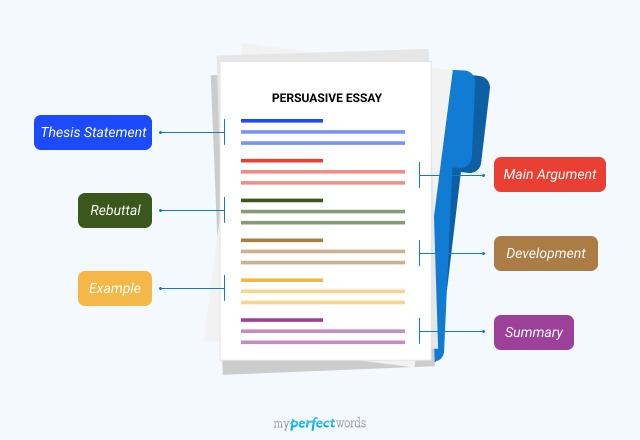
People also read
A Comprehensive Guide to Writing an Effective Persuasive Essay
200+ Persuasive Essay Topics to Help You Out
Learn How to Create a Persuasive Essay Outline
Read Excellent Examples of Persuasive Essay About Gun Control
How to Write a Persuasive Essay About Covid19 | Examples & Tips
Crafting a Convincing Persuasive Essay About Abortion
Learn to Write Persuasive Essay About Business With Examples and Tips
Check Out 12 Persuasive Essay About Online Education Examples
Persuasive Essay About Smoking - Making a Powerful Argument with Examples
Are you looking to improve your persuasive writing skills?
One of the best ways to do that is by reading persuasive essay examples. These examples can show you how to structure your arguments effectively.
But finding good examples can be a challenge. Don't worry, though – we've gathered some helpful persuasive essays for you right here!
So, if you're in search of persuasive essay examples to help you write your own, you're in the right place.
Keep reading this blog to explore various examples
- 1. Persuasive Essay Examples For Students
- 2. Persuasive Essay Examples for Different Formats
- 3. Persuasive Essay Outline Examples
- 4. Persuasive Essay Format Example
- 5. How to Write A Persuasive Essay With Examples
- 6. How to End a Persuasive Essay Examples
- 7. Catchy Persuasive Essay Topics
Persuasive Essay Examples For Students
A persuasive essay aims to convince the reader of the author’s point of view.
To find the right path for your essay, it's helpful to go through some examples. Similarly, good essay examples also help to avoid any potential pitfalls and offer clear information to the readers to adopt.
Here are some persuasive essay examples pdf:
3rd-grade Persuasive Essay Example
4th-grade Persuasive Essay Example
Persuasive Essay Example 5th-grade pdf
Persuasive Essay Examples for 6th Grade pdf
7th-grade Persuasive Essay Example
8th-grade Persuasive Essay Example
Persuasive Essay Examples Grade 10
11th-grade Persuasive Essay Example
Persuasive Writing Example For Kids
Persuasive Essay Examples High School
The following are good persuasive essay examples for high school. Having a look at them will help you understand better.
High-school Persuasive Essay Example
Examples of Persuasive Essay in Everyday Life
Persuasive Essay Examples for Middle School
Check out these persuasive essay examples for middle school to get a comprehensive idea of the format structure.
Persuasive Essay Examples Middle School
Short Persuasive Essay Example
Persuasive Essay Examples for College Students
Essay writing at the college level becomes more difficult and complicated. We have provided you with top-notch college persuasive and argumentative essay examples here.
Read them to understand the essay writing process easily.
Persuasive Essay Examples College
Higher English Persuasive Essay Example
Persuasive Essay About Smoking
Argumentative and Persuasive Examples
Persuasive Essay Examples For University
It becomes even more challenging to draft a perfect essay at the university level. Have a look at the below examples of a persuasive essay to get an idea of writing one.
University Persuasive Essay Example
5 Paragraph Persuasive Essay Example
Persuasive Essay Examples for Different Formats
A persuasive essay can be written in several formats. For instance, you can write the usual 5-paragraph essay, or even something longer or shorter.
Below are a few sample essays in various common formats.
Persuasive Essay Examples 5 Paragraph
Persuasive Essay Examples 3 Paragraph
Short Persuasive Essay Examples
These examples tell you how to remain convincing and persuasive regardless of the essay format you use.
Persuasive Essay Outline Examples
Creating an impressive outline is the most important step for writing a persuasive essay. It helps to organize thoughts and make the writing process easier.
A standard outline consists of the following sections.
- Introduction
- Body Paragraphs
Have a look at the following persuasive essay outline template examples.
Persuasive Essay Outline
Persuasive Essay Template
Persuasive Essay Format Example
A persuasive essay outline is bound to follow a specific format and structure. The main elements of a persuasive essay format are as follows.
- Font: Times New Roman, Georgia, or Arial
- Font Size: 16pt for the headlines and 12pt for the rest of the text
- Alignment: Justified
- Spacing: Double spacing
- Word Count: It usually contains 500 to 2000 words
How to Write A Persuasive Essay With Examples
Planning an essay before starting writing is essential to produce an organized and structured writing piece. So, it is better to understand the concept beforehand to impress your instructor.
The below example will show a good starting to an essay.
A Good Start for a Persuasive Essay - Short Example
How to Start a Persuasive Essay Examples
The introduction is the first part of an essay and your first chance to grab the reader's attention. It should clearly state the essay's purpose and give the reader a clear idea of what to expect.
A compelling persuasive essay introduction must have the following elements.
- Hook statement + topic
- A strong thesis statement
- Your arguments
Here are some examples of persuasive essay introductions to help you make a compelling start:
Introduction Persuasive Essay Example
Persuasive Essay Thesis Statement Examples
Persuasive Essay Hook Examples
How to End a Persuasive Essay Examples
Just like the introduction, the conclusion of the persuasive essay is equally important. It is considered as the last impression of your writing piece to the audience.
A good conclusion paragraph must include the following aspects.
- Restate the thesis statement or hypothesis
- Summarize the key arguments
- Avoid being obvious
- Include a call to action
Have a look at the document to explore the sample conclusions of a persuasive essay.
Conclusion Persuasive Essay Examples
Catchy Persuasive Essay Topics
Now that you have read some good examples, it's time to write your own persuasive essay.
But what should you write about? You can write persuasive essays about any topic, from business and online education to controversial topics like abortion , gun control , and more.
Here is a list of ten persuasive essay topics that you can use to grab your reader's attention and make them think:
- Should the government increase taxes to fund public health initiatives?
- Is the current education system effective in preparing students for college and the workplace?
- Should there be tighter gun control laws?
- Should schools have uniforms or a dress code?
- Are standardized tests an accurate measure of student performance?
- Should students be required to take physical education courses?
- Is undocumented immigration a legitimate cause for concern in the United States?
- Is affirmative action still necessary in today’s society?
- How much, if any, regulation should there be on technology companies?
- Is the death penalty an appropriate form of punishment for serious crimes?
Check out two examples on similar topics:
Political Persuasive Essay Examples
Persuasive Essay Examples About Life
Need more topic ideas? Check out our extensive list of unique persuasive essay topics and get started!
But if you're still feeling stuck, don't worry. Our persuasive essay writing service is here to the rescue!
Our experienced writers specialize in creating top-notch essays on a wide range of topics. Whether it's a challenging persuasive essay or any other type, we've got you covered.
Take advantage of our paper writing service today!

Write Essay Within 60 Seconds!

Caleb S. has been providing writing services for over five years and has a Masters degree from Oxford University. He is an expert in his craft and takes great pride in helping students achieve their academic goals. Caleb is a dedicated professional who always puts his clients first.

Paper Due? Why Suffer? That’s our Job!
Keep reading


Short Persuasive Essay

When we were still in school, we were often taught that writing is a part of being a student. Applicants for a scholarship or applicants for those who wish to attend a new school were often told to write an essay about themselves. There are of course a lot of different types of essays, but this article is going to show you how to write a persuasive essay. If you are a student hoping to find ways to write one, or simply anyone willing to find tips on writing an essay to persuade this article is for you. From definitions, examples and tips. Anyone can benefit from this, student, professional, anyone. What are you waiting for? Check this out now. 6+ Short Persuasive Essay Examples in PDF.
6+ Short Persuasive Essay Examples in PDF
1. short persuasive essay template.
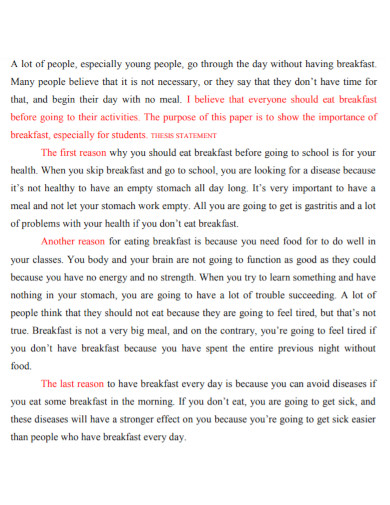
Size: 205 KB
2. Basic Short Persuasive Essay
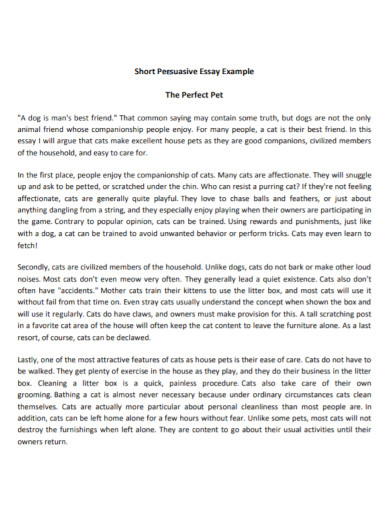
Size: 311 KB
3. Essential Short Persuasive Essay
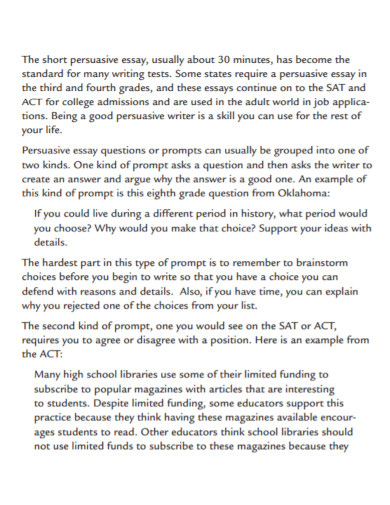
Size: 43 KB
4. Job Short Persuasive Essay
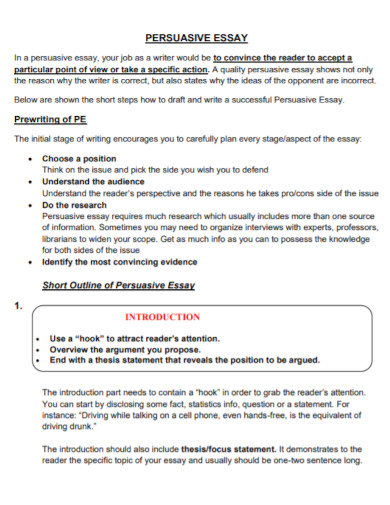
Size: 267 KB
5. School Short Persuasive Essay
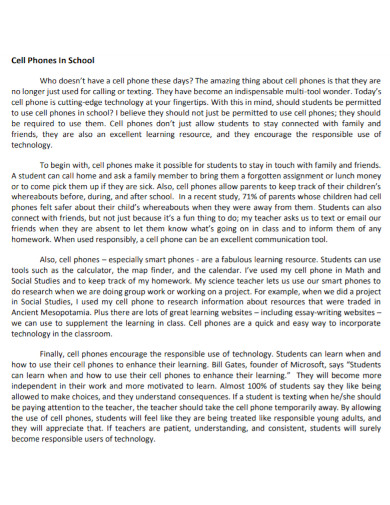
Size: 318 KB
6. Community Short Persuasive Essay
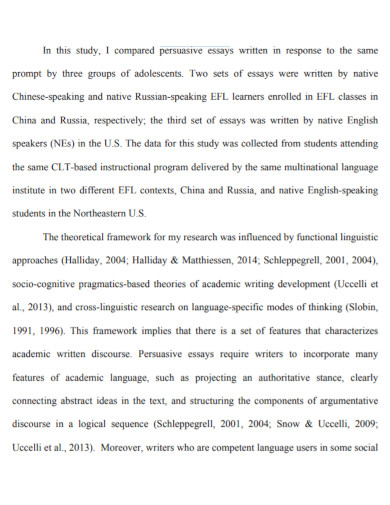
7. Short Persuasive Essay Formal
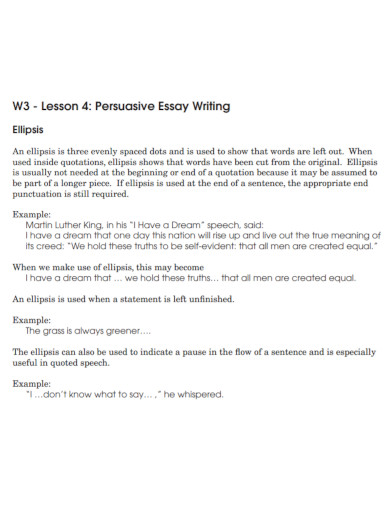
Defining Essay
A short nonfiction piece of literary writing. A written piece of writing where you show your argument on a single topic. The definition is often too vague and overlaps with the ideas.
Defining Persuasive Essay
This type of essay is a kind of academic writing. When you write a persuasive essay , you mainly use your logic and arguments to persuade your audience of your point of view. To do this, you must use solid proof like facts, doing your own research, statistics, examples and quotations from professionals.
Tips for Writing Persuasive Essays
As we all know, writing any kind of essay is tough. But it doesn’t have to be a problem that we could not solve. Rather, here are some tips to make a good persuasive essay to help you with your writing.
- Do your research: One thing you must remember when writing a good persuasive essay is to do some extensive research. The reason for this is because you are going to convince your readers about your topic.
- Make a draft: Before you write your essay, and after you do some research, make a draft. Check every small detail if they are correct. This way, when you are about to write the full essay, it would spare you lots of time to edit anything you need. Also, this helps you formulate your thoughts.
- Choose a side: Choose a side when you want to persuade your readers. Explain everything clearly as well.
- Tone of writing: Your writing tone should match your audience. Do not be too rude nor discriminate when you write. You are not there to pick a fight with your readers, rather, you are there to convince them to believe in your point of view.
- Understand your audience: To draw your audience in, first you must understand them. Who are your targeted audiences? What do they need to know from you? What can you tell them so they would be convinced at what you are saying? How will you approach the topic you intend to write and persuade them of your point of view.
- Short: Remember essays are not meant to be very long. Rather, essays are considered short since they are only written as a way for the author to express their opinions and their beliefs.
How do I make a good persuasive essay?
To make a good persuasive essay is to do follow the tips listed above. The tips are there to help you write a good persuasive essay. But to make a very good one takes practice.
What topic is okay when writing this type of essay?
You can talk about general topics. Avoid topics that may be too discriminating to your readers.
How much is the minimum word count for this type of essay?
Around 2500 words. Anything less than that will make the argument less convincing.
How do I make an impressive persuasive essay without practicing?
Unfortunately, there is no instant way of making a very good essay without practice. With practice and following the tips, you sure will be making the best essay.
Making a good persuasive essay can be tough. It can be a challenge to write when you have no idea what to write. But all that could change. Following the tips and downloading the examples can help you practice on writing this essay. The few things to always remember are, research, tone of writing, knowing your audience and persuade your reader why he or she must believe in your views. Give them a good reason, add a valid fact to make your research more convincing.
Short Persuasive Essay Generator
Text prompt
- Instructive
- Professional
Short Persuasive Essay on the importance of reading books
Short Persuasive Essay on adopting pets from animal shelters
- Features for Creative Writers
- Features for Work
- Features for Higher Education
- Features for Teachers
- Features for Non-Native Speakers
- Learn Blog Grammar Guide Community Events FAQ
- Grammar Guide
How to Write a Persuasive Essay: Tips and Tricks

Allison Bressmer
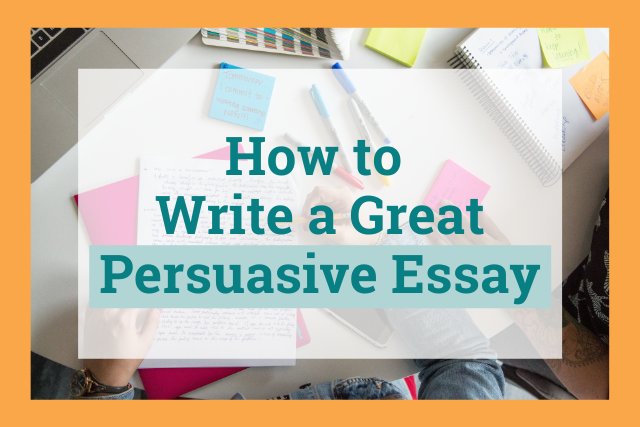
Most composition classes you’ll take will teach the art of persuasive writing. That’s a good thing.
Knowing where you stand on issues and knowing how to argue for or against something is a skill that will serve you well both inside and outside of the classroom.
Persuasion is the art of using logic to prompt audiences to change their mind or take action , and is generally seen as accomplishing that goal by appealing to emotions and feelings.
A persuasive essay is one that attempts to get a reader to agree with your perspective.
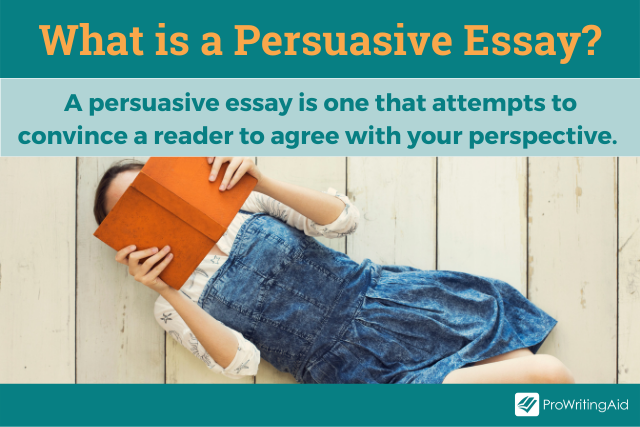
Ready for some tips on how to produce a well-written, well-rounded, well-structured persuasive essay? Just say yes. I don’t want to have to write another essay to convince you!
How Do I Write a Persuasive Essay?
What are some good topics for a persuasive essay, how do i identify an audience for my persuasive essay, how do you create an effective persuasive essay, how should i edit my persuasive essay.
Your persuasive essay needs to have the three components required of any essay: the introduction , body , and conclusion .
That is essay structure. However, there is flexibility in that structure.
There is no rule (unless the assignment has specific rules) for how many paragraphs any of those sections need.
Although the components should be proportional; the body paragraphs will comprise most of your persuasive essay.
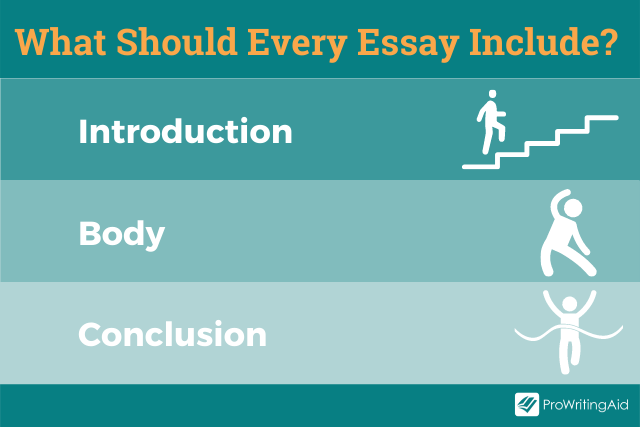
How Do I Start a Persuasive Essay?
As with any essay introduction, this paragraph is where you grab your audience’s attention, provide context for the topic of discussion, and present your thesis statement.
TIP 1: Some writers find it easier to write their introductions last. As long as you have your working thesis, this is a perfectly acceptable approach. From that thesis, you can plan your body paragraphs and then go back and write your introduction.
TIP 2: Avoid “announcing” your thesis. Don’t include statements like this:
- “In my essay I will show why extinct animals should (not) be regenerated.”
- “The purpose of my essay is to argue that extinct animals should (not) be regenerated.”
Announcements take away from the originality, authority, and sophistication of your writing.
Instead, write a convincing thesis statement that answers the question "so what?" Why is the topic important, what do you think about it, and why do you think that? Be specific.
How Many Paragraphs Should a Persuasive Essay Have?
This body of your persuasive essay is the section in which you develop the arguments that support your thesis. Consider these questions as you plan this section of your essay:
- What arguments support your thesis?
- What is the best order for your arguments?
- What evidence do you have?
- Will you address the opposing argument to your own?
- How can you conclude convincingly?
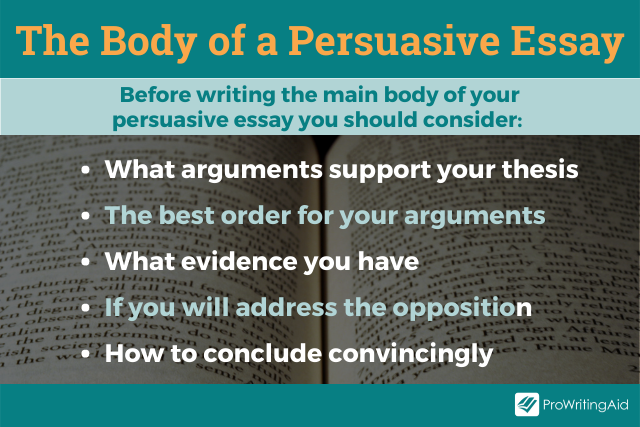
TIP: Brainstorm and do your research before you decide which arguments you’ll focus on in your discussion. Make a list of possibilities and go with the ones that are strongest, that you can discuss with the most confidence, and that help you balance your rhetorical triangle .
What Should I Put in the Conclusion of a Persuasive Essay?
The conclusion is your “mic-drop” moment. Think about how you can leave your audience with a strong final comment.
And while a conclusion often re-emphasizes the main points of a discussion, it shouldn’t simply repeat them.
TIP 1: Be careful not to introduce a new argument in the conclusion—there’s no time to develop it now that you’ve reached the end of your discussion!
TIP 2 : As with your thesis, avoid announcing your conclusion. Don’t start your conclusion with “in conclusion” or “to conclude” or “to end my essay” type statements. Your audience should be able to see that you are bringing the discussion to a close without those overused, less sophisticated signals.
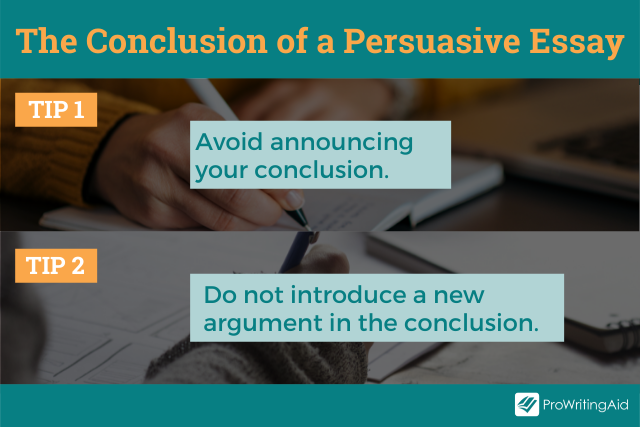
If your instructor has assigned you a topic, then you’ve already got your issue; you’ll just have to determine where you stand on the issue. Where you stand on your topic is your position on that topic.
Your position will ultimately become the thesis of your persuasive essay: the statement the rest of the essay argues for and supports, intending to convince your audience to consider your point of view.
If you have to choose your own topic, use these guidelines to help you make your selection:
- Choose an issue you truly care about
- Choose an issue that is actually debatable
Simple “tastes” (likes and dislikes) can’t really be argued. No matter how many ways someone tries to convince me that milk chocolate rules, I just won’t agree.
It’s dark chocolate or nothing as far as my tastes are concerned.
Similarly, you can’t convince a person to “like” one film more than another in an essay.
You could argue that one movie has superior qualities than another: cinematography, acting, directing, etc. but you can’t convince a person that the film really appeals to them.
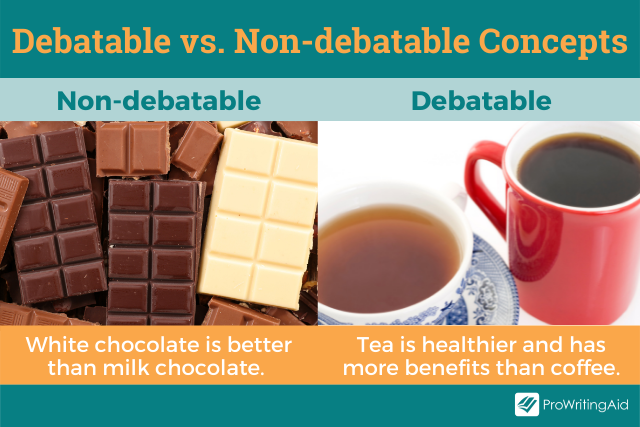
Once you’ve selected your issue, determine your position just as you would for an assigned topic. That position will ultimately become your thesis.
Until you’ve finalized your work, consider your thesis a “working thesis.”
This means that your statement represents your position, but you might change its phrasing or structure for that final version.
When you’re writing an essay for a class, it can seem strange to identify an audience—isn’t the audience the instructor?
Your instructor will read and evaluate your essay, and may be part of your greater audience, but you shouldn’t just write for your teacher.
Think about who your intended audience is.
For an argument essay, think of your audience as the people who disagree with you—the people who need convincing.
That population could be quite broad, for example, if you’re arguing a political issue, or narrow, if you’re trying to convince your parents to extend your curfew.
Once you’ve got a sense of your audience, it’s time to consult with Aristotle. Aristotle’s teaching on persuasion has shaped communication since about 330 BC. Apparently, it works.
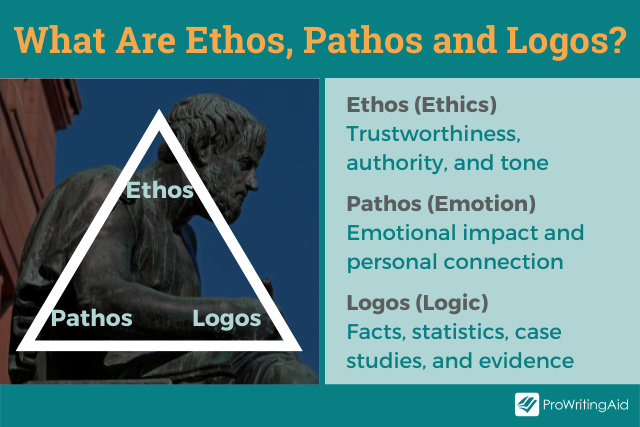
Aristotle taught that in order to convince an audience of something, the communicator needs to balance the three elements of the rhetorical triangle to achieve the best results.
Those three elements are ethos , logos , and pathos .
Ethos relates to credibility and trustworthiness. How can you, as the writer, demonstrate your credibility as a source of information to your audience?
How will you show them you are worthy of their trust?
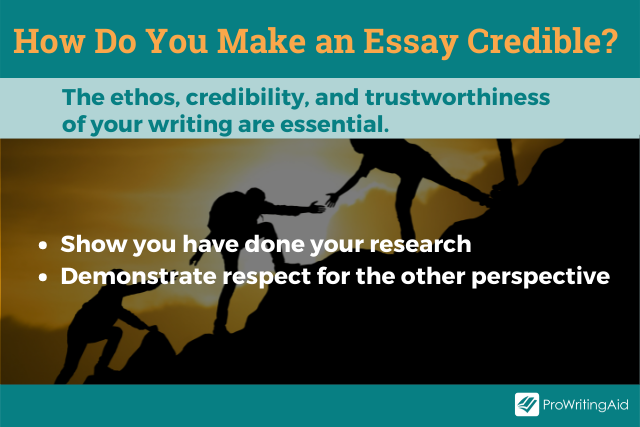
- You show you’ve done your research: you understand the issue, both sides
- You show respect for the opposing side: if you disrespect your audience, they won’t respect you or your ideas
Logos relates to logic. How will you convince your audience that your arguments and ideas are reasonable?
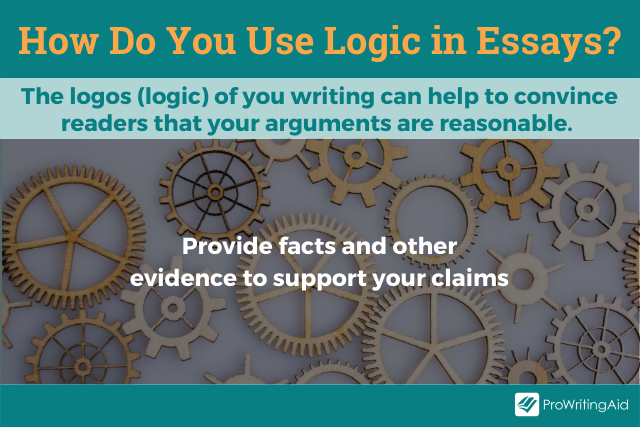
You provide facts or other supporting evidence to support your claims.
That evidence may take the form of studies or expert input or reasonable examples or a combination of all of those things, depending on the specific requirements of your assignment.
Remember: if you use someone else’s ideas or words in your essay, you need to give them credit.
ProWritingAid's Plagiarism Checker checks your work against over a billion web-pages, published works, and academic papers so you can be sure of its originality.
Find out more about ProWritingAid’s Plagiarism checks.
Pathos relates to emotion. Audiences are people and people are emotional beings. We respond to emotional prompts. How will you engage your audience with your arguments on an emotional level?
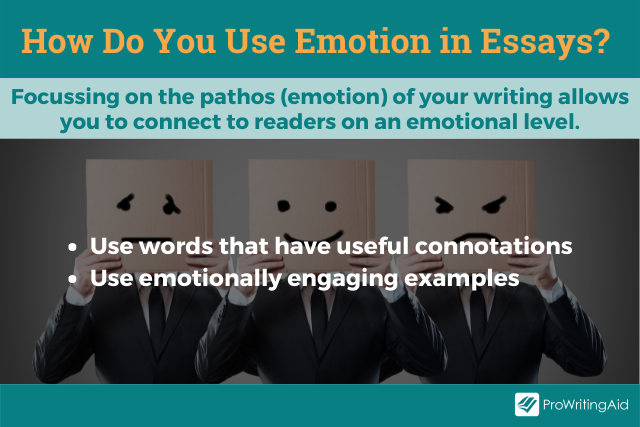
- You make strategic word choices : words have denotations (dictionary meanings) and also connotations, or emotional values. Use words whose connotations will help prompt the feelings you want your audience to experience.
- You use emotionally engaging examples to support your claims or make a point, prompting your audience to be moved by your discussion.
Be mindful as you lean into elements of the triangle. Too much pathos and your audience might end up feeling manipulated, roll their eyes and move on.
An “all logos” approach will leave your essay dry and without a sense of voice; it will probably bore your audience rather than make them care.
Once you’ve got your essay planned, start writing! Don’t worry about perfection, just get your ideas out of your head and off your list and into a rough essay format.
After you’ve written your draft, evaluate your work. What works and what doesn’t? For help with evaluating and revising your work, check out this ProWritingAid post on manuscript revision .
After you’ve evaluated your draft, revise it. Repeat that process as many times as you need to make your work the best it can be.
When you’re satisfied with the content and structure of the essay, take it through the editing process .
Grammatical or sentence-level errors can distract your audience or even detract from the ethos—the authority—of your work.
You don’t have to edit alone! ProWritingAid’s Realtime Report will find errors and make suggestions for improvements.
You can even use it on emails to your professors:
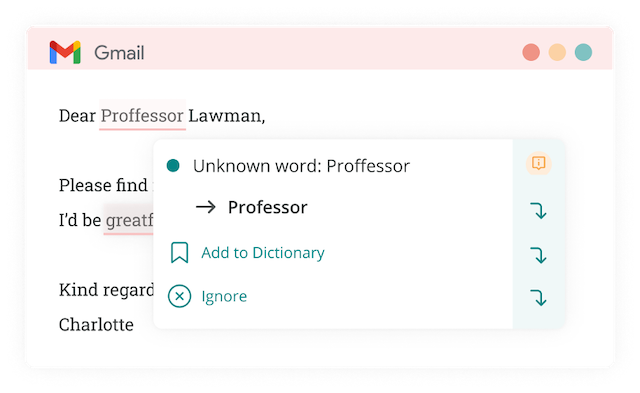
Try ProWritingAid with a free account.
How Can I Improve My Persuasion Skills?
You can develop your powers of persuasion every day just by observing what’s around you.
- How is that advertisement working to convince you to buy a product?
- How is a political candidate arguing for you to vote for them?
- How do you “argue” with friends about what to do over the weekend, or convince your boss to give you a raise?
- How are your parents working to convince you to follow a certain academic or career path?
As you observe these arguments in action, evaluate them. Why are they effective or why do they fail?
How could an argument be strengthened with more (or less) emphasis on ethos, logos, and pathos?
Every argument is an opportunity to learn! Observe them, evaluate them, and use them to perfect your own powers of persuasion.

Be confident about grammar
Check every email, essay, or story for grammar mistakes. Fix them before you press send.
Allison Bressmer is a professor of freshman composition and critical reading at a community college and a freelance writer. If she isn’t writing or teaching, you’ll likely find her reading a book or listening to a podcast while happily sipping a semi-sweet iced tea or happy-houring with friends. She lives in New York with her family. Connect at linkedin.com/in/allisonbressmer.
Get started with ProWritingAid
Drop us a line or let's stay in touch via :

- school Campus Bookshelves
- menu_book Bookshelves
- perm_media Learning Objects
- login Login
- how_to_reg Request Instructor Account
- hub Instructor Commons
Margin Size
- Download Page (PDF)
- Download Full Book (PDF)
- Periodic Table
- Physics Constants
- Scientific Calculator
- Reference & Cite
- Tools expand_more
- Readability
selected template will load here
This action is not available.

8.7: Tips for Writing Academic Persuasive Essays
- Last updated
- Save as PDF
- Page ID 250473
\( \newcommand{\vecs}[1]{\overset { \scriptstyle \rightharpoonup} {\mathbf{#1}} } \)
\( \newcommand{\vecd}[1]{\overset{-\!-\!\rightharpoonup}{\vphantom{a}\smash {#1}}} \)
\( \newcommand{\id}{\mathrm{id}}\) \( \newcommand{\Span}{\mathrm{span}}\)
( \newcommand{\kernel}{\mathrm{null}\,}\) \( \newcommand{\range}{\mathrm{range}\,}\)
\( \newcommand{\RealPart}{\mathrm{Re}}\) \( \newcommand{\ImaginaryPart}{\mathrm{Im}}\)
\( \newcommand{\Argument}{\mathrm{Arg}}\) \( \newcommand{\norm}[1]{\| #1 \|}\)
\( \newcommand{\inner}[2]{\langle #1, #2 \rangle}\)
\( \newcommand{\Span}{\mathrm{span}}\)
\( \newcommand{\id}{\mathrm{id}}\)
\( \newcommand{\kernel}{\mathrm{null}\,}\)
\( \newcommand{\range}{\mathrm{range}\,}\)
\( \newcommand{\RealPart}{\mathrm{Re}}\)
\( \newcommand{\ImaginaryPart}{\mathrm{Im}}\)
\( \newcommand{\Argument}{\mathrm{Arg}}\)
\( \newcommand{\norm}[1]{\| #1 \|}\)
\( \newcommand{\Span}{\mathrm{span}}\) \( \newcommand{\AA}{\unicode[.8,0]{x212B}}\)
\( \newcommand{\vectorA}[1]{\vec{#1}} % arrow\)
\( \newcommand{\vectorAt}[1]{\vec{\text{#1}}} % arrow\)
\( \newcommand{\vectorB}[1]{\overset { \scriptstyle \rightharpoonup} {\mathbf{#1}} } \)
\( \newcommand{\vectorC}[1]{\textbf{#1}} \)
\( \newcommand{\vectorD}[1]{\overrightarrow{#1}} \)
\( \newcommand{\vectorDt}[1]{\overrightarrow{\text{#1}}} \)
\( \newcommand{\vectE}[1]{\overset{-\!-\!\rightharpoonup}{\vphantom{a}\smash{\mathbf {#1}}}} \)
The previous chapters in this section offer an overview of what it means to formulate an argument in an academic situation. The purpose of this chapter is to offer more concrete, actionable tips for drafting an academic persuasive essay. Keep in mind that preparing to draft a persuasive essay relies on the strategies for any other thesis-driven essay, covered by the section in this textbook, The Writing Process. The following chapters can be read in concert with this one:
- Critical Reading and other research strategies helps writers identify the exigence (issue) that demands a response, as well as what kinds of research to use.
- Generate Ideas covers prewriting models (such as brainstorming techniques) that allow students to make interesting connections and develop comprehensive thesis statements. These connections and main points will allow a writer to outline their core argument.
- Organizing is important for understanding why an argument essay needs a detailed plan, before the drafting stage. For an argument essay, start with a basic outline that identifies the claim, reasoning, and evidence, but be prepared to develop more detailed outlines that include counterarguments and rebuttals, warrants, additional backing, etc., as needed.
- Drafting introduces students to basic compositional strategies that they must be familiar with before beginning an argument essay. This current chapter offers more details about what kinds of paragraphs to practice in an argument essay, but it assumes the writer is familiar with basic strategies such as coherence and cohesion.
Classical structure of an argument essay
Academic persuasive essays tend to follow what’s known as the “classical” structure, based on techniques that derive from ancient Roman and Medieval rhetoricians. John D. Ramage, et. al outline this structure in Writing Arguments :
This very detailed table can be simplified. Most academic persuasive essays include the following basic elements:
- Introduction that explains why the situation is important and presents your argument (aka the claim or thesis).
- Reasons the thesis is correct or at least reasonable.
- Evidence that supports each reason, often occurring right after the reason the evidence supports.
- Acknowledgement of objections.
- Response to objections.
Keep in mind that the structure above is just a conventional starting point. The previous chapters of this section suggest how different kinds of arguments (Classical/Aristotelian, Toulmin, Rogerian) involve slightly different approaches, and your course, instructor, and specific assignment prompt may include its own specific instructions on how to complete the assignment. There are many different variations. At the same time, however, most academic argumentative/persuasive essays expect you to practice the techniques mentioned below. These tips overlap with the elements of argumentation, covered in that chapter, but they offer more explicit examples for how they might look in paragraph form, beginning with the introduction to your essay.
Persuasive introductions should move from context to thesis
Since one of the main goals of a persuasive essay introduction is to forecast the broader argument, it’s important to keep in mind that the legibility of the argument depends on the ability of the writer to provide sufficient information to the reader. If a basic high school essay moves from general topic to specific argument (the funnel technique), a more sophisticated academic persuasive essay is more likely to move from context to thesis.
The great stylist of clear writing, Joseph W. Williams, suggests that one of the key rhetorical moves a writer can make in a persuasive introduction is to not only provide enough background information (the context), but to frame that information in terms of a problem or issue, what the section on Reading and Writing Rhetorically terms the exigence . The ability to present a clearly defined problem and then the thesis as a solution creates a motivating introduction. The reader is more likely to be gripped by it, because we naturally want to see problems solved.
Consider these two persuasive introductions, both of which end with an argumentative thesis statement:
A. In America we often hold to the belief that our country is steadily progressing. topic This is a place where dreams come true. With enough hard work, we tell ourselves (and our children), we can do anything. I argue that, when progress is more carefully defined, our current period is actually one of decline. claim
B . Two years ago my dad developed Type 2 diabetes, and the doctors explained to him that it was due in large part to his heavy consumption of sugar. For him, the primary form of sugar consumption was soda. hook His experience is echoed by millions of Americans today. According to the most recent research, “Sugary drink portion sizes have risen dramatically over the past forty years, and children and adults are drinking more soft drinks than ever,” while two out of three adults in the United States are now considered either overweight or obese. This statistic correlates with reduced life expectancy by many years. Studies have shown that those who are overweight in this generation will live a lot fewer years than those who are already elderly. And those consumers who don’t become overweight remain at risk for developing Type 2 diabetes (like my dad), known as one of the most serious global health concerns (“Sugary Drinks and Obesity Fact Sheet”). problem In response to this problem, some political journalists, such as Alexandra Le Tellier, argue that sodas should be banned. On the opposite end of the political spectrum, politically conservative journalists such as Ernest Istook argue that absolutely nothing should be done because that would interfere with consumer freedom. debate I suggest something in between: a “soda tax,” which would balance concerns over the public welfare with concerns over consumer freedom. claim
Example B feels richer, more dramatic, and much more targeted not only because it’s longer, but because it’s structured in a “motivating” way. Here’s an outline of that structure:
- Hook: It opens with a brief hook that illustrates an emerging issue. This concrete, personal anecdote grips the reader’s attention.
- Problem: The anecdote is connected with the emerging issue, phrased as a problem that needs to be addressed.
- Debate: The writer briefly alludes to a debate over how to respond to the problem.
- Claim: The introduction ends by hinting at how the writer intends to address the problem, and it’s phrased conversationally, as part of an ongoing dialogue.
Not every persuasive introduction needs all of these elements. Not all introductions will have an obvious problem. Sometimes a “problem,” or the exigence, will be as subtle as an ambiguity in a text that needs to be cleared up (as in literary analysis essays). Other times it will indeed be an obvious problem, such as in a problem-solution argument essay.
In most cases, however, a clear introduction will proceed from context to thesis . The most attention-grabbing and motivating introductions will also include things like hooks and problem-oriented issues.
Here’s a very simple and streamlined template that can serve as rudimentary scaffolding for a persuasive introduction, inspired by the excellent book, They Say / I Say: The Moves That Matter in Academic Writing : Definition: Term
In discussions of __________, an emerging issue is _____________________. issue When addressing this issue, some experts suggest ________________. debate In my view, however, _______________________________. claim
Each aspect of the template will need to be developed, but it can serve as training wheels for how to craft a nicely structured context-to-thesis introduction, including things like an issue, debate, and claim. You can try filling in the blanks below, and then export your attempt as a document.
Define key terms, as needed
Much of an academic persuasive essay is dedicated to supporting the claim. A traditional thesis-driven essay has an introduction, body, and conclusion, and the support constitutes much of the body. In a persuasive essay, most of the support is dedicated to reasoning and evidence (more on that below). However, depending on what your claim does, a careful writer may dedicate the beginning (or other parts of the essay body) to defining key terms.
Suppose I wish to construct an argument that enters the debate over euthanasia. When researching the issue, I notice that much of the debate circles around the notion of rights, specifically what a “legal right” actually means. Clearly defining that term will help reduce some of the confusion and clarify my own argument. In Vancouver Island University’s resource “ Defining key terms ,” Ian Johnston offers this example for how to define “legal right” for an academic reader:
Before discussing the notion of a right to die, we need to clarify precisely what the term legal right means. In common language, the term “right” tends often to mean something good, something people ought to have (e.g., a right to a good home, a right to a meaningful job, and so on). In law, however, the term has a much more specific meaning. It refers to something to which people are legally entitled. Thus, a “legal” right also confers a legal obligation on someone or some institution to make sure the right is conferred. For instance, in Canada, children of a certain age have a right to a free public education. This right confers on society the obligation to provide that education, and society cannot refuse without breaking the law. Hence, when we use the term right to die in a legal sense, we are describing something to which a citizen is legally entitled, and we are insisting that someone in society has an obligation to provide the services which will confer that right on anyone who wants it.
As the example above shows, academics often dedicate space to providing nuanced and technical definitions that correct common misconceptions. Johnston’s definition relies on research, but it’s not always necessary to use research to define your terms. Here are some tips for crafting definitions in persuasive essays, from “Defining key terms”:
- Fit the descriptive detail in the definition to the knowledge of the intended audience. The definition of, say, AIDS for a general readership will be different from the definition for a group of doctors (the latter will be much more technical). It often helps to distinguish between common sense or popular definitions and more technical ones.
- Make sure definitions are full and complete; do not rush them unduly. And do not assume that just because the term is quite common that everyone knows just what it means (e.g., alcoholism ). If you are using the term in a very specific sense, then let the reader know what that is. The amount of detail you include in a definition should cover what is essential for the reader to know, in order to follow the argument. By the same token, do not overload the definition, providing too much detail or using far too technical a language for those who will be reading the essay.
- It’s unhelpful to simply quote the google or dictionary.com definition of a word. Dictionaries contain a few or several definitions for important terms, and the correct definition is informed by the context in which it’s being employed. It’s up to the writer to explain that context and how the word is usually understood within it.
- You do not always need to research a definition. Depending on the writing situation and audience, you may be able to develop your own understanding of certain terms.
Use P-E-A-S or M-E-A-L to support your claim
The heart of a persuasive essay is a claim supported by reasoning and evidence. Thus, much of the essay body is often devoted to the supporting reasons, which in turn are proved by evidence. One of the formulas commonly taught in K-12 and even college writing programs is known as PEAS, which overlaps strongly with the MEAL formula introduced by the chapter, “ Basic Integration “:
Point : State the reasoning as a single point: “One reason why a soda tax would be effective is that…” or “One way an individual can control their happiness is by…”
Evidence : After stating the supporting reason, prove that reason with related evidence. There can be more than one piece of evidence. “According to …” or “In the article, ‘…,’ the author shows that …”
Analysis : There a different levels of analysis. At the most basic level, a writer should clearly explain how the evidence proves the point, in their own words: “In other words…,” “What this data shows is that…” Sometimes the “A” part of PEAS becomes simple paraphrasing. Higher-level analysis will use more sophisticated techniques such as Toulmin’s warrants to explore deeper terrain. For more tips on how to discuss and analyze, refer to the previous chapter’s section, “ Analyze and discuss the evidence .”
Summary/So what? : Tie together all of the components (PEA) succinctly, before transitioning to the next idea. If necessary, remind the reader how the evidence and reasoning relates to the broader claim (the thesis argument).
PEAS and MEAL are very similar; in fact they are identical except for how they refer to the first and last part. In theory, it shouldn’t matter which acronym you choose. Both versions are effective because they translate the basic structure of a supporting reason (reasoning and evidence) into paragraph form.
Here’s an example of a PEAS paragraph in an academic persuasive essay that argues for a soda tax:
A soda tax would also provide more revenue for the federal government, thereby reducing its debt. point Despite Ernest Istook’s concerns about eroding American freedom, the United States has long supported the ability of government to leverage taxes in order to both curb unhealthy lifestyles and add revenue. According to Peter Ubel’s “Would the Founding Fathers Approve of a Sugar Tax?”, in 1791 the US government was heavily in debt and needed stable revenue. In response, the federal government taxed what most people viewed as a “sin” at that time: alcohol. This single tax increased government revenue by at least 20% on average, and in some years more than 40% . The effect was that only the people who really wanted alcohol purchased it, and those who could no longer afford it were getting rid of what they already viewed as a bad habit (Ubel). evidence Just as alcohol (and later, cigarettes) was viewed as a superfluous “sin” in the Early Republic, so today do many health experts and an increasing amount of Americans view sugar as extremely unhealthy, even addictive. If our society accepts taxes on other consumer sins as a way to improve government revenue, a tax on sugar is entirely consistent. analysis We could apply this to the soda tax and try to do something like this to help knock out two problems at once: help people lose their addiction towards soda and help reduce our government’s debt. summary/so what?
The paragraph above was written by a student who was taught the PEAS formula. However, we can see versions of this formula in professional writing. Here’s a more sophisticated example of PEAS, this time from a non-academic article. In Nicholas Carr’s extremely popular article, “ Is Google Making Us Stupid? “, he argues that Google is altering how we think. To prove that broader claim, Carr offers a variety of reasons and evidence. Here’s part of his reasoning:
Thanks to the ubiquity of text on the Internet, not to mention the popularity of text-messaging on cell phones, we may well be reading more today than we did in the 1970s or 1980s, when television was our medium of choice. But it’s a different kind of reading, and behind it lies a different kind of thinking—perhaps even a new sense of the self. point “We are not only what we read,” says Maryanne Wolf, a developmental psychologist at Tufts University and the author of Proust and the Squid: The Story and Science of the Reading Brain . “We are how we read.” Wolf worries that the style of reading promoted by the Net, a style that puts “efficiency” and “immediacy” above all else, may be weakening our capacity for the kind of deep reading that emerged when an earlier technology, the printing press, made long and complex works of prose commonplace. When we read online, she says, we tend to become “mere decoders of information.” evidence Our ability to interpret text, to make the rich mental connections that form when we read deeply and without distraction, remains largely disengaged. analysis
This excerpt only contains the first three elements, PEA, and the analysis part is very brief (it’s more like paraphrase), but it shows how professional writers often employ some version of the formula. It tends to appear in persuasive texts written by experienced writers because it reinforces writing techniques mentioned elsewhere in this textbook. A block of text structured according to PEA will practice coherence, because opening with a point (P) forecasts the main idea of that section. Embedding the evidence (E) within a topic sentence and follow-up commentary or analysis (A) is part of the “quote sandwich” strategy we cover in the section on “Writing With Sources.”
Use “they say / i say” strategies for Counterarguments and rebuttals
Another element that’s unique to persuasive essays is embedding a counterargument. Sometimes called naysayers or opposing positions, counterarguments are points of view that challenge our own.
Why embed a naysayer?
Recall above how a helpful strategy for beginning a persuasive essay (the introduction) is to briefly mention a debate—what some writing textbooks call “joining the conversation.” Gerald Graff and Cathy Birkenstein’s They Say / I Say explains why engaging other points of view is so crucial:
Not long ago we attended a talk at an academic conference where the speaker’s central claim seemed to be that a certain sociologist—call him Dr. X—had done very good work in a number of areas of the discipline. The speaker proceeded to illustrate his thesis by referring extensively and in great detail to various books and articles by Dr. X and by quoting long pas-sages from them. The speaker was obviously both learned and impassioned, but as we listened to his talk we found ourselves somewhat puzzled: the argument—that Dr. X’s work was very important—was clear enough, but why did the speaker need to make it in the first place? Did anyone dispute it? Were there commentators in the field who had argued against X’s work or challenged its value? Was the speaker’s interpretation of what X had done somehow novel or revolutionary? Since the speaker gave no hint of an answer to any of these questions, we could only wonder why he was going on and on about X. It was only after the speaker finished and took questions from the audience that we got a clue: in response to one questioner, he referred to several critics who had vigorously questioned Dr. X’s ideas and convinced many sociologists that Dr. X’s work was unsound.
When writing for an academic audience, one of the most important moves a writer can make is to demonstrate how their ideas compare to others. It serves as part of the context. Your essay might be offering a highly original solution to a certain problem you’ve researched the entire semester, but the reader will only understand that if existing arguments are presented in your draft. Or, on the other hand, you might be synthesizing or connecting a variety of opinions in order to arrive at a more comprehensive solution. That’s also fine, but the creativity of your synthesis and its unique contribution to existing research will only be known if those other voices are included.
Aristotelian argumentation embeds counterarguments in order to refute them. Rogerian arguments present oppositional stances in order to synthesize and integrate them. No matter what your strategy is, the essay should be conversational.
Notice how Ana Mari Cauce opens her essay on free speech in higher education, “ Messy but Essential “:
Over the past year or two, issues surrounding the exercise of free speech and expression have come to the forefront at colleges around the country. The common narrative about free speech issues that we so often read goes something like this: today’s college students — overprotected and coddled by parents, poorly educated in high school and exposed to primarily left-leaning faculty — have become soft “snowflakes” who are easily offended by mere words and the slightest of insults, unable or unwilling to tolerate opinions that veer away from some politically correct orthodoxy and unable to engage in hard-hitting debate. counterargument
This is false in so many ways, and even insulting when you consider the reality of students’ experiences today. claim
The introduction to her article is essentially a counteragument (which serves as her introductory context) followed by a response. Embedding naysayers like this can appear anywhere in an essay, not just the introduction. Notice, furthermore, how Cauce’s naysayer isn’t gleaned from any research she did. It’s just a general, trendy naysayer, something one might hear nowadays, in the ether. It shows she’s attuned to an ongoing conversation, but it doesn’t require her to cite anything specific. As the previous chapter on using rhetorical appeals in arguments explained, this kind of attunement with an emerging problem (or exigence) is known as the appeal to kairos . A compelling, engaging introduction will demonstrate that the argument “kairotically” addresses a pressing concern.
Below is a brief overview of what counterarguments are and how you might respond to them in your arguments. This section was developed by Robin Jeffrey, in “ Counterargument and Response “:
Common Types of counterarguments
- Could someone disagree with your claim? If so, why? Explain this opposing perspective in your own argument, and then respond to it.
- Could someone draw a different conclusion from any of the facts or examples you present? If so, what is that different conclusion? Explain this different conclusion and then respond to it.
- Could a reader question any of your assumptions or claims? If so, which ones would they question? Explain and then respond.
- Could a reader offer a different explanation of an issue? If so, what might their explanation be? Describe this different explanation, and then respond to it.
- Is there any evidence out there that could weaken your position? If so, what is it? Cite and discuss this evidence and then respond to it.
If the answer to any of these questions is yes, that does not necessarily mean that you have a weak argument. It means, ideally and as long as your argument is logical and valid, that you have a counterargument. Good arguments can and do have counterarguments; it is important to discuss them. But you must also discuss and then respond to those counterarguments.
Responding to counterarguments
You do not need to attempt to do all of these things as a way to respond; instead, choose the response strategy that makes the most sense to you, for the counterargument that you have.
- If you agree with some of the counterargument perspectives, you can concede some of their points. (“I do agree that ….”, “Some of the points made by ____ are valid…..”) You could then challenge the importance/usefulness of those points. “However, this information does not apply to our topic because…”
- If the counterargument perspective is one that contains different evidence than you have in your own argument, you can explain why a reader should not accept the evidence that the counterarguer presents.
- If the counterargument perspective is one that contains a different interpretation of evidence than you have in your own argument, you can explain why a reader should not accept the interpretation of the evidence that that your opponent (counterarguer) presents.
- If the counterargument is an acknowledgement of evidence that threatens to weaken your argument, you must explain why and how that evidence does not, in fact invalidate your claim.
It is important to use transitional phrases in your paper to alert readers when you’re about to present an counterargument. It’s usually best to put this phrase at the beginning of a paragraph such as:
- Researchers have challenged these claims with…
- Critics argue that this view…
- Some readers may point to…
- A perspective that challenges the idea that . . .
Transitional phrases will again be useful to highlight your shift from counterargument to response:
- Indeed, some of those points are valid. However, . . .
- While I agree that . . . , it is more important to consider . . .
- These are all compelling points. Still, other information suggests that . .
- While I understand . . . , I cannot accept the evidence because . . .
Further reading
To read more about the importance of counterarguments in academic writing, read Steven D. Krause’s “ On the Other Hand: The Role of Antithetical Writing in First Year Composition Courses .”
When concluding, address the “so what?” challenge
As Joseph W. Williams mentions in his chapter on concluding persuasive essays in Style ,
a good introduction motivates your readers to keep reading, introduces your key themes, and states your main point … [but] a good conclusion serves a different end: as the last thing your reader reads, it should bring together your point, its significance, and its implications for thinking further about the ideas your explored.
At the very least, a good persuasive conclusion will
- Summarize the main points
- Address the So what? or Now what? challenge.
When summarizing the main points of longer essays, Williams suggests it’s fine to use “metadiscourse,” such as, “I have argued that.” If the essay is short enough, however, such metadiscourses may not be necessary, since the reader will already have those ideas fresh in their mind.
After summarizing your essay’s main points, imagine a friendly reader thinking,
“OK, I’m persuaded and entertained by everything you’ve laid out in your essay. But remind me what’s so important about these ideas? What are the implications? What kind of impact do you expect your ideas to have? Do you expect something to change?”
It’s sometimes appropriate to offer brief action points, based on the implications of your essay. When addressing the “So what?” challenge, however, it’s important to first consider whether your essay is primarily targeted towards changing the way people think or act . Do you expect the audience to do something, based on what you’ve argued in your essay? Or, do you expect the audience to think differently? Traditional academic essays tend to propose changes in how the reader thinks more than acts, but your essay may do both.
Finally, Williams suggests that it’s sometimes appropriate to end a persuasive essay with an anecdote, illustrative fact, or key quote that emphasizes the significance of the argument. We can see a good example of this in Carr’s article, “ Is Google Making Us Stupid? ” Here are the introduction and conclusion, side-by-side: Definition: Term
[Introduction] “Dave, stop. Stop, will you? Stop, Dave. Will you stop, Dave?” So the supercomputer HAL pleads with the implacable astronaut Dave Bowman in a famous and weirdly poignant scene toward the end of Stanley Kubrick’s 2001: A Space Odyssey . Bowman, having nearly been sent to a deep-space death by the malfunctioning machine, is calmly, coldly disconnecting the memory circuits that control its artificial “ brain. “Dave, my mind is going,” HAL says, forlornly. “I can feel it. I can feel it.”
I can feel it, too. Over the past few years I’ve had an uncomfortable sense that someone, or something, has been tinkering with my brain, remapping the neural circuitry, reprogramming the memory. …
[Conclusion] I’m haunted by that scene in 2001 . What makes it so poignant, and so weird, is the computer’s emotional response to the disassembly of its mind: its despair as one circuit after another goes dark, its childlike pleading with the astronaut—“I can feel it. I can feel it. I’m afraid”—and its final reversion to what can only be called a state of innocence. HAL’s outpouring of feeling contrasts with the emotionlessness that characterizes the human figures in the film, who go about their business with an almost robotic efficiency. Their thoughts and actions feel scripted, as if they’re following the steps of an algorithm. In the world of 2001 , people have become so machinelike that the most human character turns out to be a machine. That’s the essence of Kubrick’s dark prophecy: as we come to rely on computers to mediate our understanding of the world, it is our own intelligence that flattens into artificial intelligence.
Instead of merely rehashing all of the article’s main points, Carr returns to the same movie scene from 2001 that he opened with. The final lines interpret the scene according to the argument he just dedicated the entire essay to presenting.
The entire essay should use rhetorical appeals strategically
The chapter “ Persuasive Appeals ” introduces students to logos, pathos, ethos, and kairos. Becoming familiar with each of those persuasive appeals can add much to an essay. It also reinforces the idea that writing argumentative essays is not a straightforward process of jotting down proofs. It’s not a computer algorithm.
- Logos (appeals to evidence and reasoning) is the foundational appeal of an argument essay. Clearly identifying the claim, then supporting that claim with reasoning and evidence will appeal to the reader’s logos demands. As the previous chapter on argumentation mentions, however, what constitutes solid evidence will vary depending on the audience. Make sure your evidence is indeed convincing to your intended reader.
- Pathos (appeals to emotion) are a crucial component and should permeate should every section of the essay. Personal anecdotes are an effective way to illustrate important ideas, and they connect with the reader at an emotional level. Personal examples also cultivate voice .
- Ethos (appeals to character, image, and values) is essential to gaining the reader’s trust and assent. The tone of your essay (snarky, sincere, ironic, sarcastic, empathetic) is immensely important for its overall effect, and it helps build the reader’s image of you. A careful attention to high-quality research reinforces a sincere and empathetic tone. When supporting certain claims and sub-claims, it’s also important to identify implied beliefs (warrants) that your reader is most likely to agree with, and to undermine beliefs that might seem repugnant.
- Kairos (appeals to timeliness) impresses the reader with your attunement to the situation. This should be practiced especially in the introduction, but it can appear throughout the essay as you engage with research and other voices that have recently weighed in on the topic.
All of these appeals are already happening, whether or not they’re recognized. If they are missed, the audience will often use them against you, judging your essay as not being personable enough (pathos), or not in touch with commonly accepted values (ethos), or out of touch with what’s going on (kairos). These non-logical appeals aren’t irrational. They are crucial components to writing that matters.
Argument Outline Exercise
To get started on your argument essay, practice adopting from of the outlines from this Persuasive Essay Outline worksheet .
Persuasive Essay Guide
Persuasive Essay Examples
Last updated on: Feb 9, 2023
Free Persuasive Essay Examples to Help you Get Started
By: Caleb S.
Reviewed By: Rylee W.
Published on: Jan 28, 2020

There are many different kinds of essays, and a persuasive essay is one of them. When writing one, you will have to maintain a certain kind of voice and style throughout the essay.
We know that it could be difficult for you to adapt to a certain tone and maintain it throughout the essay.
Therefore, we gathered some easy-to-understand and high-quality persuasive essay examples to help you get started. These examples will help you know how persuasive writing is different from other kinds of writing.

On this Page
Good Persuasive Essay Examples
There are a lot of benefits of reading great and well-written essays. However, for many students, writing this type of essay would be a novel task. They may not have written it before and need help.
Essays examples come in handy in such situations. This is especially helpful before you begin to write a persuasive essay, which extends to selecting a topic. A persuasive piece of writing is based on encouraging the readers to adopt and agree with your perspective.
These essay examples help the students in the following ways.
- They help the students choose from good persuasive essay topics .
- They help with proper essay formatting.
- They help the students know about the required essay sections.
- They tell the students about the kind of content that is suitable for that particular kind of essay.
- They help you make your essay an effective persuasive essay.
Reading great essay examples or samples helps you know about your weaknesses and the areas you need to focus on.
Here are some examples for your ease.
PERSUASIVE ESSAY EXAMPLE ABOUT COVID 19
PERSUASIVE ESSAY EXAMPLE ABOUT PRODUCT
PERSUASIVE ESSAY EXAMPLE 5 PARAGRAPH
How to Start a Persuasive Essay - Example
Starting your essay engaging will help to keep the readers accepting your point of view. This is important because if you go astray, the reader will lose interest and leave your essay in the middle. To avoid it, make sure that your introduction and essay start is strong and impactful.
Below is an example that gives you a better idea and makes your essay writing process easy.
HOW TO START A PERSUASIVE ESSAY EXAMPLE

Paper Due? Why Suffer? That's our Job!
Persuasive Essay Examples for Elementary Students
At primary school, teachers assign essays to students as a way of improving their writing skills. However, the essays are very simple and not very complex, so the students easily write them.
Below are some good persuasive essay topics for primary school kids.
Persuasive Essay Examples for 3rd Grade
PERSUASIVE ESSAY EXAMPLES FOR 3RD GRADE
Persuasive Essay Examples for 4th Grade
PERSUASIVE ESSAY EXAMPLES FOR 4TH GRADE
Persuasive Essay Examples for 5th Grade
PERSUASIVE ESSAY EXAMPLES FOR 5TH GRADE
Persuasive Essay Examples for Middle School
Middle school kids are better acquainted with the essays. These kids learn many things, and by now, essays have become a common part of their homework.
If you are a middle school student and looking for some essay examples, then refer below.
Persuasive Essay Examples for 6th Grade
PERSUASIVE ESSAY EXAMPLES FOR 6TH GRADE
Persuasive Essay Examples for 7th Grade
PERSUASIVE ESSAY EXAMPLES FOR 7TH GRADE
Persuasive Essay Examples for 8th Grade
PERSUASIVE ESSAY EXAMPLES FOR 8TH GRADE
Persuasive Essay Examples for High School
High-school students are often struggling with writing a persuasive essay. However, if you get help from examples, you will easily write a good one.
Below are some persuasive essay examples to help high-school students.
PERSUASIVE ESSAY EXAMPLES FOR 9TH GRADE
PERSUASIVE ESSAY EXAMPLES FOR 10TH GRADE
Persuasive Essay Examples College
Are you looking for college persuasive essay examples? Therefore, for your help, we gathered a professionally written example that you could use for your ease.
PERSUASIVE ESSAY EXAMPLES FOR COLLEGE
Higher English Persuasive Essay Examples
Higher English is a standalone subject and a specialized study course. Here, the students study the language and literature together and learn how to hone their writing skills. For this, they also study different fiction and non-fiction texts and works.
Look at this example and know how a good persuasive essay looks like.
PERSUASIVE ESSAY EXAMPLES FOR HIGHER ENGLISH
How to End a Persuasive Essay - Examples
The ending is as important for your essay as the beginning. A strong conclusion will leave a lasting and strong mark on the reader. This is why you do not end your essay in haste and put ample thought into it.
Refer to the below example to know how to end your persuasive essay strongly.
HOW TO END A PERSUASIVE ESSAY - EXAMPLE
Tough Essay Due? Hire Tough Writers!
Tips to Write a Great Persuasive Essay
Below are some helpful tips that will assist you in writing an engaging and great essay.
- Your essay topic should be about something that you are passionate about. It is important because you work better when you are working on something that you like.
- Know your audience fully before starting to write your essay. The essay content largely depends on your academic level. Teachers of higher grades expect the essays to be perfectly researched and written. Therefore, make it according to your teacher’s expectations.
- Begin the essay with a powerful hook sentence. This could be anything like a rhetorical question, a fact, or something interesting about the main essay topic.
- Add a brief and relevant thesis statement after the introduction and divide the body paragraphs according to the number of ideas.
- Do proper research about both sides of the argument. It will help you counter the opposite views and put your point of view more significantly. Do not assume that the audience knows about your stance; research and tell them a better story.
- Emphasize your viewpoint with strong and substantial evidence and details
- Keep the tone empathetic and make the reader feel that you can relate to their experiences and emotions. This is a powerful writing technique because people trust those who know their feelings.
- Divide the sections logically and maintain proper transition between the sections and the rest of the essay.
- Do not add any new ideas at the end of the essay or in conclusion. This section must stick to the main ideas only. Thus, explain one or two of the core ideas and your personal opinion here.
- Proofread your essay thoroughly and make sure that it is error-free and perfectly written.
- Do not mix the persuasive essay with an argumentative essay; they both are different.
Following all these tips, you will be able to write an engaging and perfect persuasive essay.
However, if you still need help. Consult 5StarEssays.com , a professional writing service that provides write my essay help to high-school, college, and university students. We have a dedicated team of professional writers, ensuring you get high-quality essays and papers within the given deadline.
So, contact us now and get your essay on time.
Frequently Asked Questions
What are the 5 persuasive techniques.
Below are the five persuasive techniques.
- Think about tone.
- Know the reader’s purpose.
- Establish trust and credibility.
- Use rhetoric and repetition.
- Pay attention to language.
How do you start a persuasive essay?
Here are some steps that you should follow and start writing a persuasive essay.
- Brainstorm the topic ideas.
- Research on the topic.
- Create an outline.
- Develop the thesis statement.
- Choose a strong hook statement.
- Divide the information into body paragraphs.

Arts, Persuasive Essay
Caleb S. has been providing writing services for over five years and has a Masters degree from Oxford University. He is an expert in his craft and takes great pride in helping students achieve their academic goals. Caleb is a dedicated professional who always puts his clients first.
Was This Blog Helpful?
Keep reading.
- Persuasive Essay Guide - How to Write a Persuasive Essay

- Persuasive Essay Topics Ideas to Craft an A-Worthy Essay

- Persuasive Essay Outline - Detailed Guide with Examples

People Also Read
- writing a conclusion for an argumentative essay
- narrative essay outline
- thesis writing
- persuasive essay topics
- argumentative essay outline
Burdened With Assignments?

Advertisement
- Homework Services: Essay Topics Generator
© 2024 - All rights reserved

How to Write Perfect Persuasive Essays in 5 Simple Steps
WHAT IS A PERSUASIVE ESSAY?

A persuasive text presents a point of view around a topic or theme that is backed by evidence to support it.
The purpose of a persuasive text can be varied. Maybe you intend to influence someone’s opinion on a specific topic, or you might aim to sell a product or service through an advertisement.
The challenge in writing a good persuasive text is to use a mix of emotive language and, in some cases, images that are supported by hard evidence or other people’s opinions.
In a persuasive essay or argument essay, the student strives to convince the reader of the merits of their opinion or stance on a particular issue. The student must utilise several persuasive techniques to form a coherent and logical argument to convince the reader of a point of view or to take a specific action.
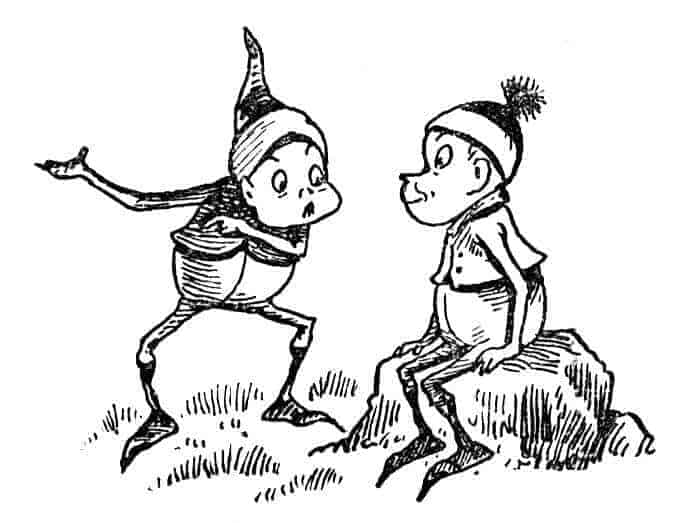
PERSUADING PEOPLE REQUIRES A CONSISTENT APPROACH…
Persuasive texts are simple in structure. You must clearly state your opinion around a specific topic and then repeatedly reinforce your opinions with external facts or evidence. A robust concluding summary should leave little doubt in the reader’s mind. ( Please view our planning tool below for a detailed explanation. )
TYPES OF PERSUASIVE TEXT
We cover the broad topic of writing a general persuasive essay in this guide, there are several sub-genres of persuasive texts students will encounter as they progress through school. We have complete guides on these text types, so be sure to click the links and read these in detail if required.
- Argumentative Essays – These are your structured “Dogs are better pets than Cats” opinion-type essays where your role is to upsell the positive elements of your opinions to your audience whilst also highlighting the negative aspects of any opposing views using a range of persuasive language and techniques.
- Advertising – Uses persuasive techniques to sell a good or service to potential customers with a call to action.
- Debating Speeches – A debate is a structured discussion between two teams on a specific topic that a moderator judges and scores. Your role is to state your case, sell your opinions to the audience, and counteract your opposition’s opinions.
- Opinion Articles, Newspaper Editorials. – Editorials often use more subtle persuasive techniques that blur the lines of factual news reporting and opinions that tell a story with bias. Sometimes they may even have a call to action at the end.
- Reviews – Reviews exist to inform others about almost any service or product, such as a film, restaurant, or product. Depending on your experiences, you may have firm opinions or not even care that much about recommending it to others. Either way, you will employ various persuasive techniques to communicate your recommendations to your audience.
- Please note a DISCUSSION essay is not a traditional persuasive text, as even though you are comparing and contrasting elements, the role of the author is to present an unbiased account of both sides so that the reader can make a decision that works best for them. Discussions are often confused as a form of persuasive writing.
A COMPLETE TEACHING UNIT ON PERSUASIVE WRITING SKILLS
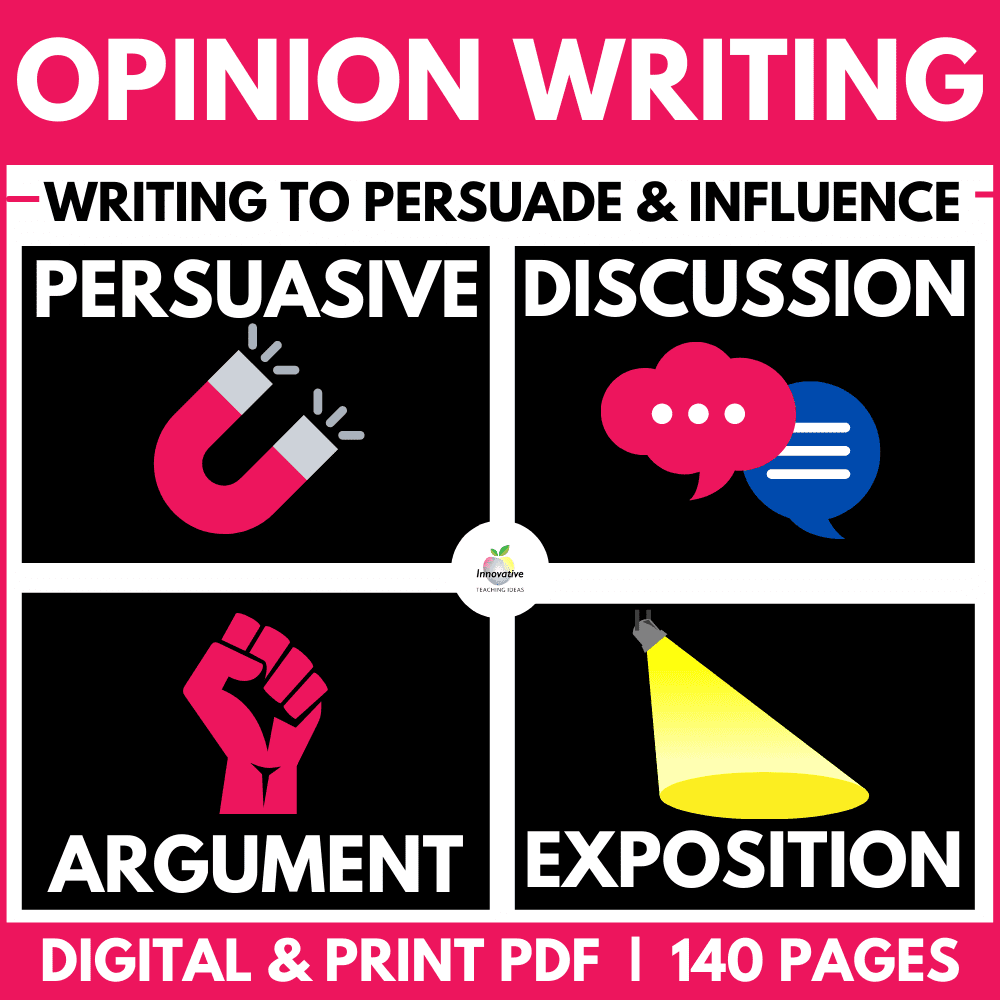
Teach your students to produce writing that PERSUADES and INFLUENCES thinking with this HUGE writing guide bundle covering: ⭐ Persuasive Texts / Essays ⭐ Expository Essays⭐ Argumentative Essays⭐ Discussions.
A complete 140 PAGE unit of work on persuasive texts for teachers and students. No preparation is required.
THE STRUCTURE OF A PERSUASIVE ESSAY

1. Introduction
In the introduction, the student will naturally introduce the topic. Controversial issues make for great topics in this writing genre. It’s a cliche in polite society to discourage discussions involving politics, sex, or religion because they can often be very divisive. While these subjects may not be the best topics of conversation for the dinner table at Thanksgiving, they can be perfect when deciding on a topic for persuasive writing. Obviously, the student’s age and abilities should be considered, as well as cultural taboos, when selecting a topic for the essay. But the point holds, the more controversial, the better.
Let’s take a look at some of the critical elements of the introduction when writing a persuasive essay:
Title: Tell your audience what they are reading.
This will often be posed as a question; for example, if the essay is on the merits of a vegetarian lifestyle, it may be called something like: To Eat Meat or Not?
Hook : Provide your audience with a reason to continue reading.
As with any genre of writing, capturing the reader’s interest from the outset is crucial. There are several methods of doing this, known as hooks. Students may open their essays with anecdotes, jokes, quotations, or relevant statistics related to the topic under discussion.
Background: Provide some context to your audience.
In this introductory section, students will provide the reader with some background on the topic. This will place the issue in context and briefly weigh some opinions on the subject.
Thesis statement: Let the audience know your stance.
After surveying the topic in the first part of the introduction, it is now time for the student writer to express their opinion and briefly preview the points they will make later in the essay.
2. Body Paragraphs
The number of paragraphs forming this essay section will depend on the number of points the writer chooses to make to support their opinion. Usually three main points will be sufficient for beginning writers to coordinate. More advanced students can increase the number of paragraphs based on the complexity of their arguments, but the overall structure will largely remain intact.
Be sure to check out our complete guide to writing perfect paragraphs here .
The TEEL acronym is valuable for students to remember how to structure their paragraphs. Read below for a deeper understanding.
Topic Sentence:
The topic sentence states the central point of the paragraph. This will be one of the reasons supporting the thesis statement made in the introduction.
These sentences will build on the topic sentence by illustrating the point further, often by making it more specific.
These sentences’ purpose is to support the paragraph’s central point by providing supporting evidence and examples. This evidence may be statistics, quotations, or anecdotal evidence.
The final part of the paragraph links back to the initial statement of the topic sentence while also forming a bridge to the next point to be made. This part of the paragraph provides some personal analysis and interpretation of how the student arrived at their conclusions and connects the essay as a cohesive whole.
3. Conclusion
The conclusion weaves together the main points of the persuasive essay. It does not usually introduce new arguments or evidence but instead reviews the arguments made already and restates them by summing them up uniquely. It is important at this stage to tie everything back to the initial thesis statement. This is the writer’s last opportunity to drive home their point, to achieve the essay’s goal, to begin with – persuade the reader of their point of view.

Ending an essay well can be challenging, but it is essential to end strongly, especially for persuasive essays. As with the hooks of the essay’s opening, there are many tried and tested methods of leaving the reader with a strong impression. Encourage students to experiment with different endings, for example, concluding the essay with a quotation that amplifies the thesis statement.
Another method is to have the student rework their ending in simple monosyllabic words, as simple language often has the effect of being more decisive in impact. The effect they are striving for in the final sentence is the closing of the circle.
Several persuasive writing techniques can be used in the conclusion and throughout the essay to amp up the persuasive power of the writing. Let’s take a look at a few.
ETHOS, PATHOS & LOGOS TUTORIAL VIDEO (2:20)
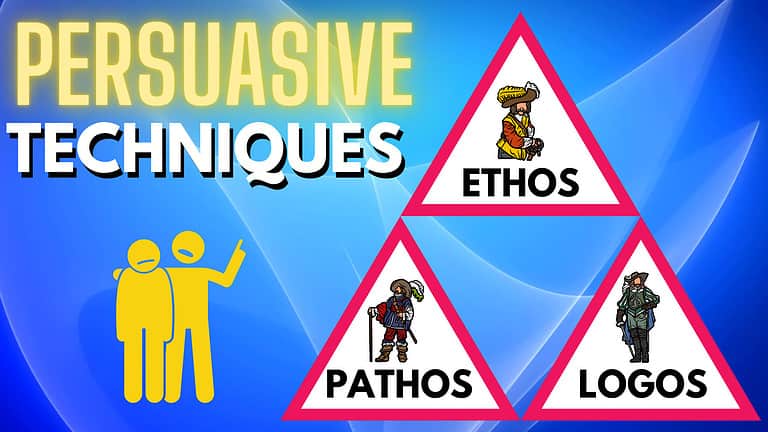
TIPS FOR WRITING A GREAT PERSUASIVE ESSAY

PERSUASIVE TECHNIQUES
In this article, we have outlined a basic structure that will be helpful to students in approaching the organization of their persuasive writing. It will also be helpful for the students to be introduced to a few literary techniques that will help your students to present their ideas convincingly. Here are a few of the more common ones:
Repetition: There is a reason why advertisements and commercials are so repetitive – repetition works! Students can use this knowledge to their advantage in their persuasive writing. It is challenging to get the reader to fully agree with the writer’s opinion if they don’t fully understand it. Saying the same thing in various ways ensures the reader gets many bites at the ‘understanding’ cherry.
Repetition Example: “The use of plastic bags is not only bad for the environment, but it is also bad for our economy. Plastic bags are not biodegradable, meaning they will not decompose and will continue to take up space in landfills. Plastic bags are also not recyclable, meaning they will not be reused and will instead end up in landfills. Plastic bags are not only bad for the environment, but they are also bad for our economy as they are costly to dispose of and take up valuable space in landfills.”
In this example, the phrase “not only bad for the environment but also bad for our economy” is repeated multiple times to reinforce the idea that plastic bags are not just a problem for the environment but also the economy. The repetition of the phrase emphasizes the point and makes it more persuasive.
It is also important to note that repetition could be used differently, such as repeating a word or phrase to create rhythm or emphasis.
Storytelling: Humans tend to understand things better through stories. Think of how we teach kids important values through time-tested fables like Peter and the Wolf . Whether through personal anecdotes or references to third-person experiences, stories help climb down the ladder of abstraction and reach the reader on a human level.
Storytelling Example: “Imagine you are walking down the street, and you come across a stray dog clearly in need of food and water. The dog looks up at you with big, sad eyes, and you cannot help but feel a twinge of compassion. Now, imagine that same scenario, but instead of a stray dog, it’s a homeless person sitting on the sidewalk. The person is clearly in need of food and shelter, and their eyes also look up at her with a sense of hopelessness.
The point of this story is to show that just as we feel compelled to help a stray animal in need, we should also feel compelled to help a homeless person. We should not turn a blind eye to the suffering of our fellow human beings, and we should take action to address homelessness in our community. It is important to remember that everyone deserves a roof over their head and a warm meal to eat. The story is designed to elicit an emotional response in the reader and make the argument more relatable and impactful.
By using storytelling, this passage creates an image in the reader’s mind and creates an emotional connection that can be more persuasive than just stating facts and figures.

Dissent: We live in a cynical age, so leaving out the opposing opinion will smack of avoidance to the reader. Encourage your students to turn to that opposing viewpoint and deal with those arguments in their essays .
Dissent Example: “Many people argue that students should not have to wear uniforms in school. They argue that uniforms stifle creativity and individuality and that students should be able to express themselves through their clothing choices. While these are valid concerns, I strongly disagree.
In fact, uniforms can actually promote individuality by levelling the playing field and removing the pressure to dress in a certain way. Furthermore, uniforms can promote a sense of community and belonging within a school. They can also provide a sense of discipline and structure, which can help to create a more focused and productive learning environment. Additionally, uniforms can save families money and eliminate the stress of deciding what to wear daily .
While some may argue that uniforms stifle creativity and individuality, the benefits of uniforms far outweigh the potential drawbacks. It is important to consider the impact of uniforms on the school as a whole, rather than focusing solely on individual expression.”
In this example, the writer presents the opposing viewpoint (uniforms stifle creativity and individuality) and then provides counterarguments to refute it. By doing so, the writer can strengthen their own argument and present a more convincing case for why uniforms should be worn in school.
A Call to Action: A staple of advertising, a call to action can also be used in persuasive writing. When employed, it usually forms part of the conclusion section of the essay and asks the reader to do something, such as recycle, donate to charity, sign a petition etc.
A quick look around reveals to us the power of persuasion, whether in product advertisements, newspaper editorials, or political electioneering; persuasion is an ever-present element in our daily lives. Logic and reason are essential in persuasion, but they are not the only techniques. The dark arts of persuasion can prey on emotion, greed, and bias. Learning to write persuasively can help our students recognize well-made arguments and help to inoculate them against the more sinister manifestations of persuasion.
Call to Action Example: “Climate change is a pressing issue that affects us all, and it’s important that we take action now to reduce our carbon footprint and protect the planet for future generations. As a society, we have the power to make a difference and it starts with small changes that we can make in our own lives.
I urge you to take the following steps to reduce your carbon footprint:
- Reduce your use of single-use plastics
- Use public transportation, carpool, bike or walk instead of driving alone.
- Support clean energy sources such as solar and wind power
- Plant trees and support conservation efforts
It’s easy to feel like one person can’t make a difference, but the truth is that every little bit helps. Together, we can create a more sustainable future for ourselves and for the planet.
So, let’s take action today and make a difference for a better future, it starts with minor changes, but it all adds up and can make a significant impact. We need to take responsibility for our actions and do our part to protect the planet.”
In this example, the writer gives a clear and specific call to action and encourages the reader to take action to reduce their carbon footprint and protect the planet. By doing this, the writer empowers the reader to take action and enables them to change.
Now, go persuade your students of the importance of perfecting the art of persuasive writing!
A COMPLETE UNIT ON TEACHING FACT AND OPINION
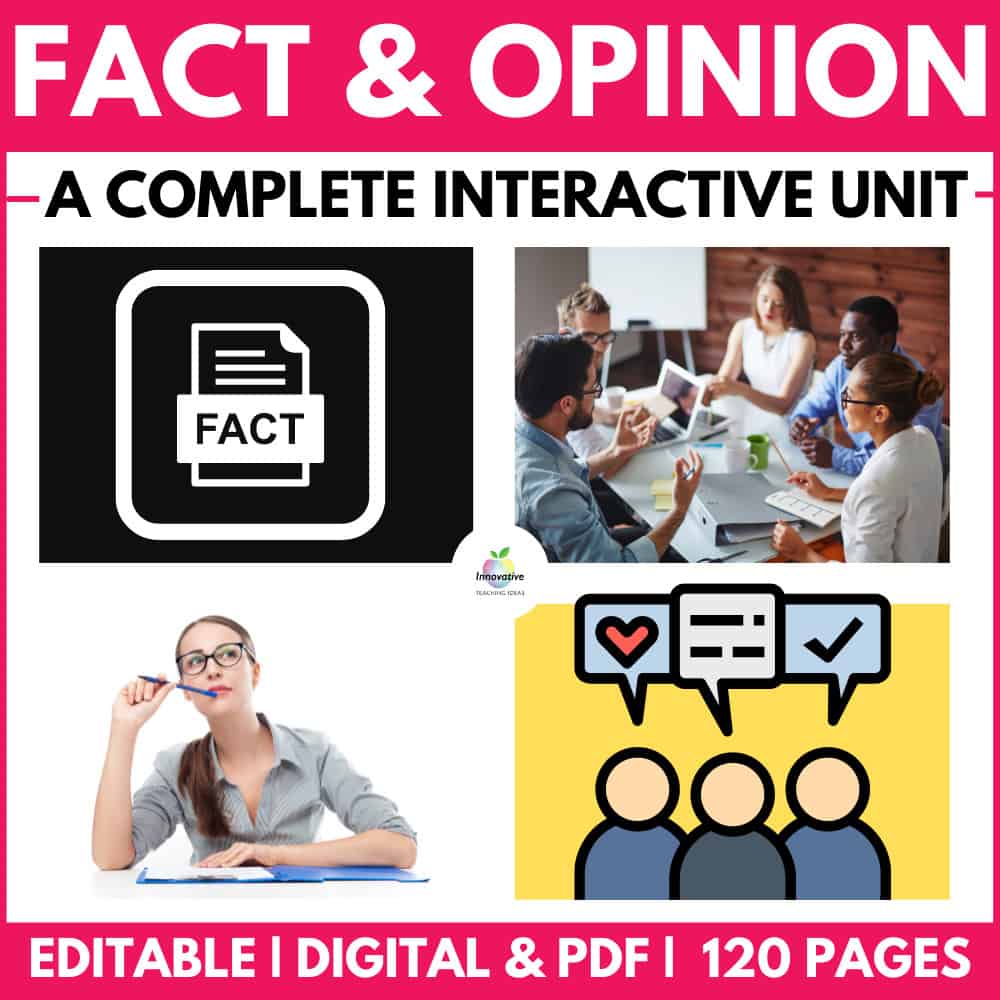
This huge 120-page resource combines four different fact and opinion activities that you can undertake as a WHOLE GROUP or as INDEPENDENT READING GROUP TASKS in either DIGITAL or PRINTABLE TASKS.
20 POPULAR PERSUASIVE ESSAY TOPICS FOR STUDENTS
Writing an effective persuasive essay demonstrates a range of skills that will be of great use in nearly all aspects of life after school.

In essence, if you can influence a person to change their ideas or thoughts on a given topic through how you structure your words and thoughts, you possess a very powerful skill.
Be careful not to rant wildly. Use facts and other people’s ideas who think similarly to you in your essay to strengthen your concepts.
Your biggest challenge in getting started may be choosing a suitable persuasive essay topic. These 20 topics for a persuasive essay should make this process a little easier.
- WHY ARE WE FASCINATED WITH CELEBRITIES AND WEALTHY PEOPLE ON TELEVISION AND SOCIAL MEDIA?
- IS IT RIGHT FOR SCHOOLS TO RAISE MONEY BY SELLING CANDY AND UNHEALTHY FOODS TO STUDENTS?
- SHOULD GIRLS BE ALLOWED TO PLAY ON BOYS SPORTING TEAMS?
- IS TEACHING HANDWRITING A WASTE OF TIME IN THIS DAY AND AGE?
- SHOULD THERE BE FAR GREATER RESTRICTIONS AROUND WHAT CAN BE POSTED ON THE INTERNET?
- SHOULD PROFESSIONAL ATHLETES HAVE TO TAKE DRUG TESTS?
- ARE TEENAGE PREGNANCY SHOWS A NEGATIVE OR POSITIVE INFLUENCE ON VIEWERS?
- SHOULD GAMBLING BE PROMOTED IN ANY WAY IN SPORTS EVEN THOUGH IT BRINGS IN LARGE AMOUNTS OF REVENUE?
- SHOULD SPORTING TEAMS THAT LOSE BE REWARDED BY RECEIVING INCENTIVES SUCH AS HIGH DRAFT PICKS AND / OR FINANCIAL BENEFITS?
- SHOULD SHARKS THAT ATTACK PEOPLE BE DESTROYED? SHOULD WE GET INVOLVED IN FOREIGN CONFLICTS AND ISSUES THAT DON’T DIRECTLY AFFECT OUR COUNTRY?
- SHOULD WE GET INVOLVED IN FOREIGN CONFLICTS AND ISSUES THAT DON’T DIRECTLY AFFECT OUR COUNTRY?
- COULD VIDEO GAMES BE CONSIDERED AS A PROFESSIONAL SPORT?
- IF YOU WERE THE LEADER OF YOUR COUNTRY AND HAD A LARGE SURPLUS TO SPEND, WHAT WOULD YOU DO WITH IT?
- WHEN SHOULD A PERSON BE CONSIDERED AND TREATED AS AN ADULT?
- SHOULD SMOKING BECOME AN ILLEGAL ACTIVITY?
- SHOULD THE VOTING AGE BE LOWERED?
- DOES PROTECTIVE PADDING IN SPORTS MAKE IT MORE DANGEROUS?
- SHOULD CELL PHONES BE ALLOWED IN THE CLASSROOM?
- IS TEACHING A FOREIGN LANGUAGE A WASTE OF TIME?
- SHOULD WE TEACH ETIQUETTE IN SCHOOLS?
PERSUASIVE PROMPTS FOR RELUCTANT WRITERS
If your students need a little more direction and guidance, here are some journal prompts that include aspects to consider.
- Convince us that students would be better off having a three-day weekend . There are many angles you could take with this, such as letting children maximize their childhood or trying to convince your audience that a four-day school week might actually be more productive.
- Which is the best season? And why? You will really need to draw on the benefits of your preferred season and sell them to your audience. Where possible, highlight the negatives of the competing seasons. Use lots of figurative language and sensory and emotional connections for this topic.
- Aliens do / or don’t exist? We can see millions of stars surrounding us just by gazing into the night sky, suggesting alien life should exist, right? Many would argue that if there were aliens we would have seen tangible evidence of them by now. The only fact is that we just don’t know the answer to this question. It is your task to try and convince your audience through some research and logic what your point of view is and why.
- Should school uniforms be mandatory? Do your research on this popular and divisive topic and make your position clear on where you stand and why. Use plenty of real-world examples to support your thoughts and points of view.
- Should Smartphones be banned in schools? Whilst this would be a complete nightmare for most students’ social lives, maybe it might make schools more productive places for students to focus and learn. Pick a position, have at least three solid arguments to support your point of view, and sell them to your audience.
VISUAL JOURNAL PROMPTS FOR PERSUASIVE WRITING
Try these engaging, persuasive prompts with your students to ignite the writing process . Scroll through them.

Persuasive Essay Examples (Student Writing Samples)
Below are a collection of persuasive essay samples. Click on the image to enlarge and explore them in greater detail. Please take a moment to read the persuasive texts in detail and the teacher and student guides highlight some of the critical elements of writing a persuasion.
Please understand these student writing samples are not intended to be perfect examples for each age or grade level but a piece of writing for students and teachers to explore together to critically analyze to improve student writing skills and deepen their understanding of persuasive text writing.
We recommend reading the example either a year above or below, as well as the grade you are currently working with, to gain a broader appreciation of this text type.
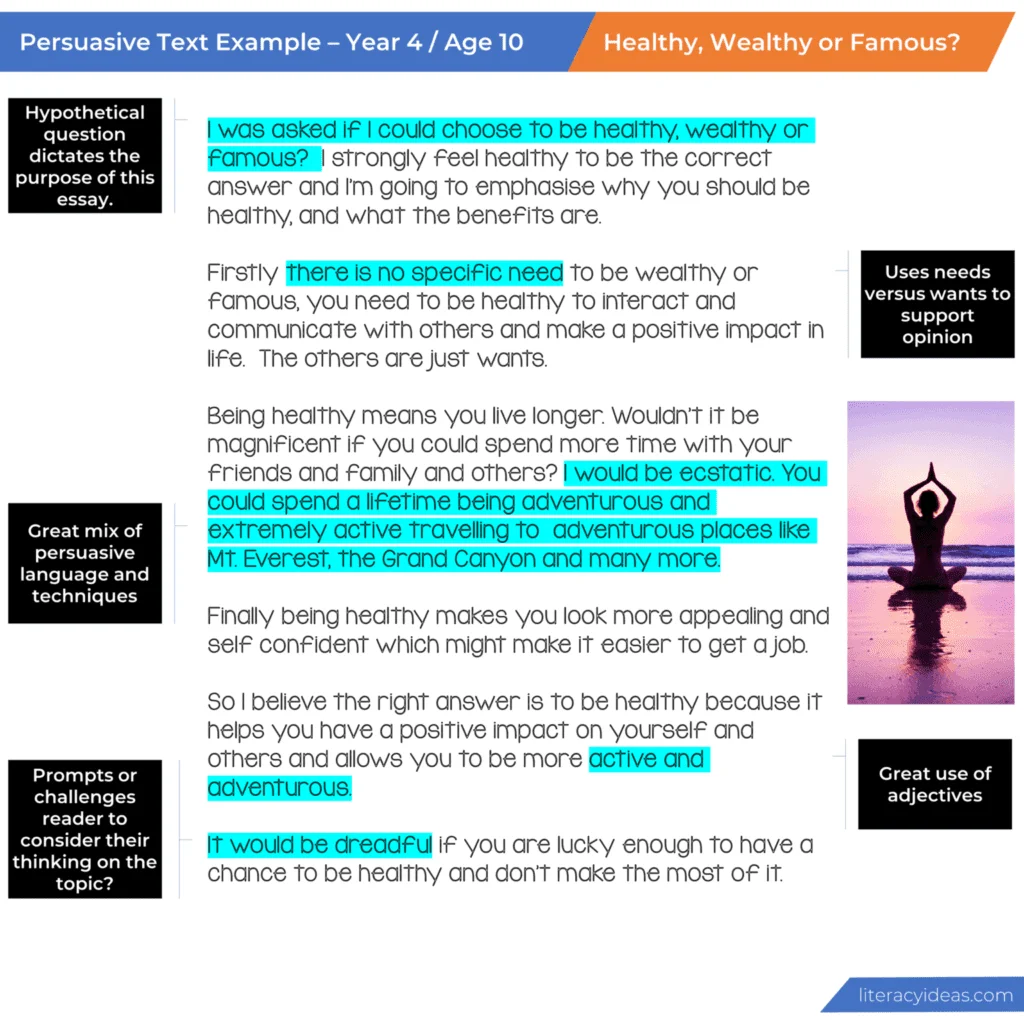
VIDEO TUTORIALS FOR PERSUASIVE WRITING

OTHER GREAT ARTICLES RELATED TO PERSUASIVE ESSAY WRITING

Teaching Resources
Use our resources and tools to improve your student’s writing skills through proven teaching strategies.
WHERE CAN I FIND A COMPLETE UNIT OF WORK ON HOW TO WRITE PERSUASIVE ESSAYS?

We pride ourselves on being the web’s best resource for teaching students and teachers how to write a persuasive text. We value the fact you have taken the time to read our comprehensive guides to understand the fundamentals of writing skills.
We also understand some of you just don’t have the luxury of time or the resources to create engaging resources exactly when you need them.
If you are time-poor and looking for an in-depth solution that encompasses all of the concepts outlined in this article, I strongly recommend looking at the “ Writing to Persuade and Influence Unit. ”
Working in partnership with Innovative Teaching Ideas , we confidently recommend this resource as an all-in-one solution to teach how to write persuasively.
This unit will find over 140 pages of engaging and innovative teaching ideas.
PERSUASIVE ESSAY WRITING CHECKLIST AND RUBRIC BUNDLE

⭐⭐⭐⭐⭐ (92 Reviews)
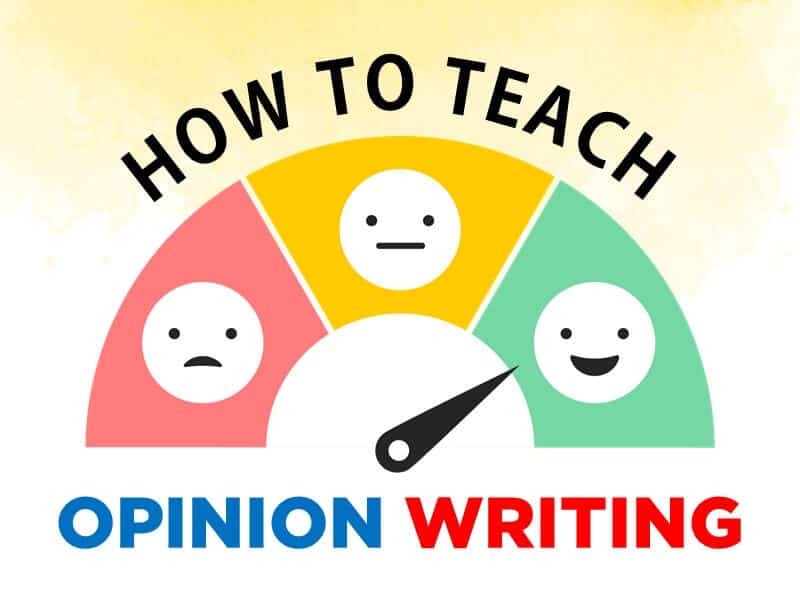
The Ultimate Guide to Opinion Writing for Students and Teachers
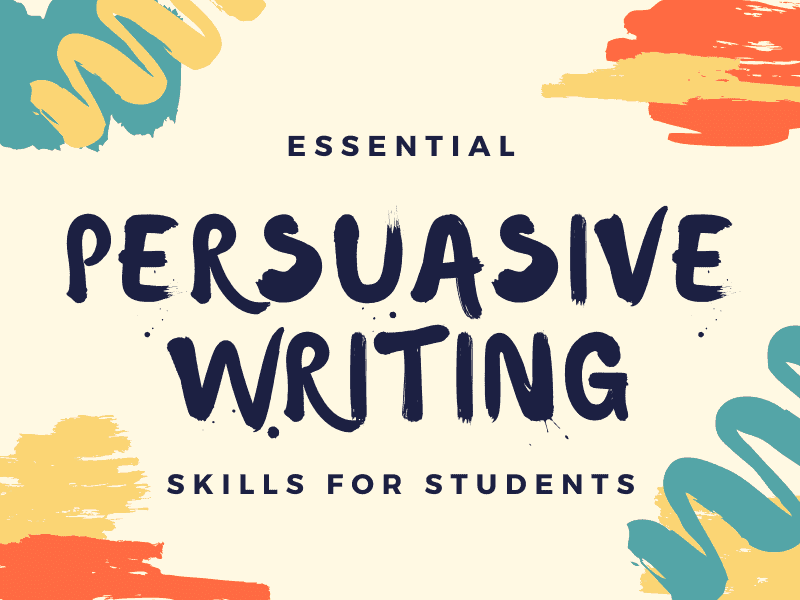
Top 5 Persuasive Writing Techniques for Students
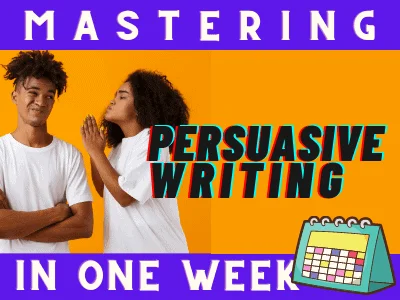
5 Top Persuasive Writing Lesson Plans for Students and Teachers
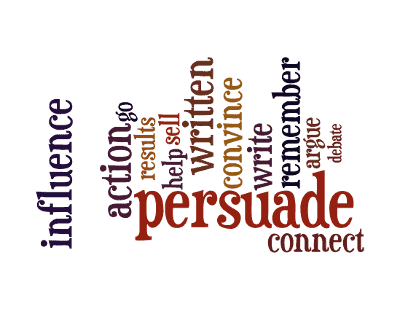
23 Persuasive writing Topics for High School students
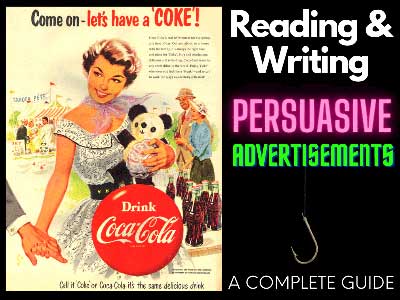
How to Write an Advertisement: A Complete Guide for Students and Teachers

Best Persuasive Essay Examples
- Expository Essay Examples and Samples
- Cause and Effect Essay Examples and Samples 2024
- Definition Essay Examples and Samples
- Reflective Essay Examples and Samples
- Analytical Essay Examples and Samples 2024
- Summary Essay Examples and Samples
- Evaluation Essay Examples and Samples
- Argumentative Essay Examples and Samples
- NHS Essay Examples and Samples
- Discourse Community Essay Examples
- Essay on Synthesis Examples, Samples
- Essay on Racism Examples and Samples
- Essay on Gun Violence Examples and Samples
- Essay on Mental Health Examples and Samples
- Essay on Nursing Examples and Samples
- Essay on Gun Control Examples and Samples
- Essay on Education Examples and Samples
- Essay on Who Am I Examples and Samples
- Essay on Bullying Examples and Samples
- Essay on Artificial Intelligence Examples and Samples
- Essay on Music Examples and Samples
- Essay on Problem Solution Examples and Samples
- Essay on Integrity Examples and Samples
- Essay on Leadership Examples and Samples
- Essay on Domestic Violence Examples and Samples
- Essay on Respect Examples and Samples
- Essay on Profile Examples and Samples
- Essay on Life Examples and Samples
- Essay on Autobiographical Examples and Samples
- Essay on Obesity Examples and Samples
- Essay on Cyberbullying Examples and Samples
- Essay on Technology Examples and Samples
- Essay on Professionalism Examples and Samples
- Essay on Career Goals Examples and Samples
- Essay on Animal Testing Examples and Samples
- Essay on Drug Abuse Examples and Samples
- Essay on Immigrations Examples and Samples
- Essay on Capital Punishment Examples and Samples
- Essay on Communication Examples and Samples
- Essay on Friendship Examples and Samples
- Essay on Community Service Examples and Samples
- Essay on My Family Examples and Samples
- Essay on Frankenstein Examples and Samples
- Essay on Pro Life Examples and Samples
- Essay on Anxiety Examples and Samples
- Essay on Industrial Revolution Examples and Samples
- Essay on Research Argument Examples and Samples
- Essay on Food Examples and Samples
- Essay on Great Depression Examples and Samples
- Essay on Self-Reflection Examples and Samples
- Essay on The Great Gatsby Examples and Samples
- Essay On What Does It Mean to Be American Examples and Samples
- Essay on World War 2 Examples and Samples
- Essay on Ethics Examples and Samples
- Essay on Concert Review Examples and Samples
- Essay on Fahrenheit 451 Examples and Samples
- Essay on Nursing Scholarship Examples and Samples
- Essay on Pro Choice Examples and Samples
- Essay on Process Analysis Examples and Samples
- Essay on Solar Energy Examples and Samples
- Essay on Personal Narrative Examples and Samples
- Essay on Hamlet Examples and Samples
- Essay on Civil Rights Examples and Samples
- Essay on Rhetoric Examples and Samples
- Essay on Martin Luther King Examples and Samples
Recent Articles

May 28 2023
How does outdoor exercises impact our health and well-being? Essay Sample, Example

Should Screen Time Be Limited? Essay Sample, Example

Why Video Games are Good for the Brain. Essay Sample, Example

May 27 2023
Why Fairy Tales Spark Imagination and Offer Moral Lessons Essay Sample, Example

Why Racism Still Persists in the Criminal Justice System – Essay Sample, Example


Why Emotional Intelligence is Important in Leadership Essay Sample, Example

Mar 28 2019
Why Students Should Not Wear Uniforms Essay Sample, Example

Mar 25 2019
What President Barack Obama Got Wrong Essay Sample, Example

Mar 20 2019
Why It Is Better to Be Moral than Immoral Essay Sample, Example

Mar 15 2019
Online Education Persuasive Essay Sample, Example

Nov 15 2018
Girls in Sports Essay Sample, Example

Nov 11 2018
Gender in Sports Essay Sample, Example

Nov 02 2018
Extended School Days Essay Sample, Example
Aug 29 2018
Why You Should Not Worry About Procrastination Essay Sample, Example
Jul 27 2018
Is Humanity Alone in the Universe? Unlikely. Essay Sample, Example
Remember Me
What is your profession ? Student Teacher Writer Other
Forgotten Password?
Username or Email
How to Write a Persuasive Essay: Step-by-Step Guide + Examples
Have you ever tried to get somebody round to your way of thinking? Then you should know how daunting the task is. Still, if your persuasion is successful, the result is emotionally rewarding.
A persuasive essay is a type of writing that uses facts and logic to argument and substantiate such or another point of view. The purpose is to assure the reader that the author’s position is viable. In this article by Custom-writing experts, you can find a guide on persuasive writing, compelling examples, and outline structure. Continue reading and learn how to write a persuasive essay!
⚖️ Argumentative vs. Persuasive Essay
- 🐾 Step-by-Step Writing Guide
🔗 References
An argumentative essay intends to attack the opposing point of view, discussing its drawbacks and inconsistencies. A persuasive essay describes only the writer’s opinion, explaining why it is a believable one. In other words, you are not an opponent; you are an advocate.
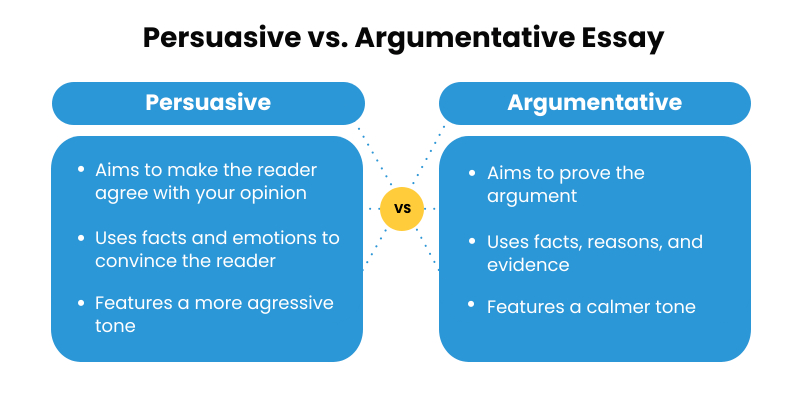
A persuasive essay primarily resorts to emotions and personal ideas on a deeper level of meaning, while an argumentative one invokes logic reasoning. Despite the superficial similarity of these two genres, argumentative speech presupposes intense research of the subject, while persuasive speech requires a good knowledge of the audience.
🐾 How to Write a Persuasive Essay Step by Step
These nine steps are the closest thing you will find to a shortcut for writing to persuade. With practice, you may get through these steps quickly—or even figure out new techniques in persuasive writing.
📑 Persuasive Essay Outline
Below you’ll find an example of a persuasive essay outline . Remember: papers in this genre are more flexible than argumentative essays are. You don’t need to build a perfectly logical structure here. Your goal is to persuade your reader.
Note that the next section contains a sample written in accordance with this outline.
Persuasive Essay Introduction
- Hook: start with an intriguing sentence.
- Background: describe the context of the discussed issue and familiarize the reader with the argument.
- Definitions: if your essay dwells upon a theoretical subject matter, be sure to explain the complicated terms.
- Thesis statement: state the purpose of your piece of writing clearly and concisely. This is the most substantial sentence of the entire essay, so take your time formulating it.
Persuasive Essay Body
Use the following template for each paragraph.
- Topic sentence: linking each new idea to the thesis, it introduces a paragraph. Use only one separate argument for each section, stating it in the topic sentence.
- Evidence: substantiate the previous sentence with reliable information. If it is your personal opinion, give the reasons why you think so.
- Analysis: build the argument, explaining how the evidence supports your thesis.
Persuasive Essay Conclusion
- Summary: briefly list the main points of the essay in a couple of sentences.
- Significance: connect your essay to a broader idea.
- Future: how can your argument be developed?
⭐ Persuasive Essay Examples
In this section, there are three great persuasive essay examples. The first one is written in accordance with the outline above, will the components indicated. Two others are downloadable.
Example #1: Being a Millionaire is a Bad Thing
Introduction, paragraph #1, paragraph #2, paragraph #3, example #2: teachers or doctors.
The importance of doctors in the period of the COVID-19 pandemic is difficult to overstate. The well-being of the nation depends on how well doctors can fulfill their duties before society. The US society acknowledges the importance of doctors and healthcare, as it is ready to pay large sums of money to cure the diseases. However, during the lockdown, students and parents all around the world began to understand the importance of teachers.
Before lockdown, everyone took the presence of teachers for granted, as they were always available free of charge. In this country, it has always been the case that while doctors received praises and monetary benefits, teachers remained humble, even though they play the most important role for humanity: passing the knowledge through generations. How fair is that? The present paper claims that even in the period of the pandemic, teachers contribute more to modern society than doctors do.
Example #3: Is Online or Homeschool More Effective?
The learning process can be divided into traditional education in an educational institution and distance learning. The latter form has recently become widely popular due to the development of technology. Besides, the COVID-19 pandemic is driving the increased interest in distance learning. However, there is controversy about whether this form of training is sufficient enough. This essay aims to examine online and homeschooling in a historical and contemporary context and to confirm the thesis that such activity is at least equivalent to a standard type of education.
Persuasive Essay Topics
- Why do managers hate the performance evaluation?
- Why human cloning should be prohibited.
- Social media have negative physical and psychological effect on teenagers.
- Using cell phones while driving should be completely forbidden.
- Why is business ethics important?
- Media should change its negative representation of ageing and older people.
- What is going on with the world?
- Good communication skills are critical for successful business.
- Why capitalism is the best economic system.
- Sleep is extremely important for human health and wellbeing.
- Face-to-face education is more effective than online education.
- Why video games can be beneficial for teenagers.
- Bullies should be expelled from school as they encroach on the school safety.
- Why accountancy is a great occupation and more people should consider it as a future career.
- The reasons art and music therapy should be included in basic health insurance.
- Impact of climate change on the indoor environment.
- Parents should vaccinate their children to prevent the spread of deadly diseases.
- Why celebrities should pay more attention to the values they promote.
- What is wrong with realism?
- Why water recycling should be every government’s priority.
- Media spreads fear and panic among people.
- Why e-business is very important for modern organizations.
- People should own guns for self-protection.
- The neccessity of container deposit legislation.
- We must save crocodiles to protect ecological balance.
- Why we should pay more attention to renewable energy projects.
- Anthropology is a critically relevant science.
- Why it’s important to create a new global financial order.
- Why biodiversity is crucial for the environment?
- Why process safety management is crucial for every organization.
- Speed limits must not be increased.
- What’s wrong with grades at school ?
- Why tattoos should be considered as a form of fine art.
- Using all-natural bath and body products is the best choice for human health and safety.
- What is cancel culture?
- Why the Internet has become a problem of modern society.
- Illegal immigrants should be provided with basic social services.
- Smoking in public places must be banned for people’s safety and comfort.
- Why it is essential to control our nutrition.
- How to stimulate economic growth?
- Why exercise is beneficial for people.
- Studying history is decisive for the modern world.
- We must decrease fuel consumption to stop global warming.
- Why fighting social inequality is necessary.
- Why should businesses welcome remote work?
- Social media harms communication within families.
- College athletes should be paid for their achievements.
- Electronic books should replace print books.
- People should stop cutting down rainforest .
- Why every company should have a web page.
- Tips To Write An Effective Persuasive Essay: The College Puzzle, Stanford University
- 31 Powerful Persuasive Writing Techniques: Writtent
- Persuasive Essay Outline: Houston Community College System
- Essays that Worked: Hamilton College
- Argumentative Essays // Purdue Writing Lab
- Persuasion – Writing for Success (University of Minnesota)
- Persuasive Writing (Manitoba Education)
- Share to Facebook
- Share to Twitter
- Share to LinkedIn
- Share to email
![short persuasive essay Common Essay Mistakes—Writing Errors to Avoid [Updated]](https://custom-writing.org/blog/wp-content/uploads/2020/12/avoid-mistakes-ccw-284x153.jpg)
One of the most critical skills that students gain during their college years is assignment writing. Composing impressive essays and research papers can be quite challenging, especially for ESL students. Nonetheless, before learning the art of academic writing, you may make numerous common essay mistakes. Such involuntary errors appear in:...

You’re probably thinking: I’m no Mahatma Gandhi or Steve Jobs—what could I possibly write in my memoir? I don’t even know how to start an autobiography, let alone write the whole thing. But don’t worry: essay writing can be easy, and this autobiography example for students is here to show...
![short persuasive essay Why I Want to Be a Teacher Essay: Writing Guide [2024]](https://custom-writing.org/blog/wp-content/uploads/2020/12/senior-male-professor-writing-blackboard-with-chalk3-284x153.jpg)
Some people know which profession to choose from childhood, while others decide much later in life. However, and whenever you come to it, you may have to elaborate on it in your personal statement or cover letter. This is widely known as “Why I Want to Be a Teacher” essay.
![short persuasive essay Friendship Essay: Writing Guide & Topics on Friendship [New]](https://custom-writing.org/blog/wp-content/uploads/2020/12/smiley-female-friends-fist-bumping-284x153.jpg)
Assigned with an essay about friendship? Congrats! It’s one of the best tasks you could get. Digging through your memories and finding strong arguments for this paper can be an enjoyable experience. I bet you will cope with this task effortlessly as we can help you with the assignment. Just...

When you are assigned an autobiography to write, tens, and even hundreds of questions start buzzing in your head. How to write autobiography essay parts? What to include? How to make your autobiography writing flow? Don’t worry about all this and use the following three simple principles and 15 creative...

“Where is your thesis statement?” asks your teacher in a dramatic tone. “Where is my what?” you want to reply, but instead, you quickly point your finger at a random sentence in your paper, saying, “Here it is…” To avoid this sad situation (which is usually followed by a bad...

A life experience essay combines the elements of narration, description, and self-reflection. Such a paper has to focus on a single event that had a significant impact on a person’s worldview and values. Writing an essay about life experience prompts students to do the following: You may struggle with such...

Who has made a significant impact in your life and why? Essay on the topic might be challenging to write. One is usually asked to write such a text as a college admission essay. A topic for this paper can be of your choice or pre-established by the institution. Either...

Are you about to start writing a financial assistance essay? Most probably, you are applying for a scholarship that will provide additional funding for your education or that will help you meet some special research objectives.
![short persuasive essay Growing Up Essay: Guide & Examples [2024]](https://custom-writing.org/blog/wp-content/uploads/2020/12/gardening-concept-with-mother-daughter-284x153.jpg)
What does it mean to grow up? Essays on this topic might be entertaining yet challenging to write. Growing up is usually associated with something new and exciting. It’s a period of everything new and unknown. Now, you’ve been assigned to write a growing up essay. You’re not a kid...
![short persuasive essay Murder Essay: Examples, Topics, and Killer Tips [2024]](https://custom-writing.org/blog/wp-content/uploads/2020/12/man-holding-gun-as-evidence-284x153.jpeg)
Probably, a murder essay is not a fascinating assignment to complete. Talking about people’s deaths or crazy murderers can be depressing. However, all assignments are different, and you are supposed to work on every task hard. So, how are you going to deal with a murder essay? You can make...

Are you a nursing student? Then, you will definitely have an assignment to compose a nursing reflective essay. This task might be quite tough and challenging. But don’t stress out! Our professionals are willing to assist you.
Thank you for posting this!! I am trying to get notice to bring up a new language in our school because it doesn’t allow many languages so this really helped 🙂
Beautiful content
Useful article for blogging. I believe, for business, these blog tips will help me a lot.

Glad to know our tips are helpful for you! Hope you visit our blog again!
- PRO Courses Guides New Tech Help Pro Expert Videos About wikiHow Pro Upgrade Sign In
- EDIT Edit this Article
- EXPLORE Tech Help Pro About Us Random Article Quizzes Request a New Article Community Dashboard This Or That Game Popular Categories Arts and Entertainment Artwork Books Movies Computers and Electronics Computers Phone Skills Technology Hacks Health Men's Health Mental Health Women's Health Relationships Dating Love Relationship Issues Hobbies and Crafts Crafts Drawing Games Education & Communication Communication Skills Personal Development Studying Personal Care and Style Fashion Hair Care Personal Hygiene Youth Personal Care School Stuff Dating All Categories Arts and Entertainment Finance and Business Home and Garden Relationship Quizzes Cars & Other Vehicles Food and Entertaining Personal Care and Style Sports and Fitness Computers and Electronics Health Pets and Animals Travel Education & Communication Hobbies and Crafts Philosophy and Religion Work World Family Life Holidays and Traditions Relationships Youth
- Browse Articles
- Learn Something New
- Quizzes Hot
- This Or That Game
- Train Your Brain
- Explore More
- Support wikiHow
- About wikiHow
- Log in / Sign up
- Education and Communications
- College University and Postgraduate
- Academic Writing
How to Write a Persuasive Essay
Last Updated: December 17, 2023 Fact Checked
This article was co-authored by Christopher Taylor, PhD . Christopher Taylor is an Adjunct Assistant Professor of English at Austin Community College in Texas. He received his PhD in English Literature and Medieval Studies from the University of Texas at Austin in 2014. There are 14 references cited in this article, which can be found at the bottom of the page. This article has been fact-checked, ensuring the accuracy of any cited facts and confirming the authority of its sources. This article has been viewed 4,278,322 times.
A persuasive essay is an essay used to convince a reader about a particular idea or focus, usually one that you believe in. Your persuasive essay could be based on anything about which you have an opinion or that you can make a clear argument about. Whether you're arguing against junk food at school or petitioning for a raise from your boss, knowing how to write a persuasive essay is an important skill that everyone should have.
Sample Persuasive Essays

How to Lay the Groundwork

- Look for language that gives you a clue as to whether you are writing a purely persuasive or an argumentative essay. For example, if the prompt uses words like “personal experience” or “personal observations,” you know that these things can be used to support your argument.
- On the other hand, words like “defend” or “argue” suggest that you should be writing an argumentative essay, which may require more formal, less personal evidence.
- If you aren’t sure about what you’re supposed to write, ask your instructor.

- Whenever possible, start early. This way, even if you have emergencies like a computer meltdown, you’ve given yourself enough time to complete your essay.

- Try using stasis theory to help you examine the rhetorical situation. This is when you look at the facts, definition (meaning of the issue or the nature of it), quality (the level of seriousness of the issue), and policy (plan of action for the issue).
- To look at the facts, try asking: What happened? What are the known facts? How did this issue begin? What can people do to change the situation?
- To look at the definition, ask: What is the nature of this issue or problem? What type of problem is this? What category or class would this problem fit into best?
- To examine the quality, ask: Who is affected by this problem? How serious is it? What might happen if it is not resolved?
- To examine the policy, ask: Should someone take action? Who should do something and what should they do?

- For example, if you are arguing against unhealthy school lunches, you might take very different approaches depending on whom you want to convince. You might target the school administrators, in which case you could make a case about student productivity and healthy food. If you targeted students’ parents, you might make a case about their children’s health and the potential costs of healthcare to treat conditions caused by unhealthy food. And if you were to consider a “grassroots” movement among your fellow students, you’d probably make appeals based on personal preferences.

- It also should present the organization of your essay. Don’t list your points in one order and then discuss them in a different order.
- For example, a thesis statement could look like this: “Although pre-prepared and highly processed foods are cheap, they aren’t good for students. It is important for schools to provide fresh, healthy meals to students, even when they cost more. Healthy school lunches can make a huge difference in students’ lives, and not offering healthy lunches fails students.”
- Note that this thesis statement isn’t a three-prong thesis. You don’t have to state every sub-point you will make in your thesis (unless your prompt or assignment says to). You do need to convey exactly what you will argue.

- A mind map could be helpful. Start with your central topic and draw a box around it. Then, arrange other ideas you think of in smaller bubbles around it. Connect the bubbles to reveal patterns and identify how ideas relate. [5] X Research source
- Don’t worry about having fully fleshed-out ideas at this stage. Generating ideas is the most important step here.

- For example, if you’re arguing for healthier school lunches, you could make a point that fresh, natural food tastes better. This is a personal opinion and doesn’t need research to support it. However, if you wanted to argue that fresh food has more vitamins and nutrients than processed food, you’d need a reliable source to support that claim.
- If you have a librarian available, consult with him or her! Librarians are an excellent resource to help guide you to credible research.
How to Draft Your Essay

- An introduction. You should present a “hook” here that grabs your audience’s attention. You should also provide your thesis statement, which is a clear statement of what you will argue or attempt to convince the reader of.
- Body paragraphs. In 5-paragraph essays, you’ll have 3 body paragraphs. In other essays, you can have as many paragraphs as you need to make your argument. Regardless of their number, each body paragraph needs to focus on one main idea and provide evidence to support it. These paragraphs are also where you refute any counterpoints that you’ve discovered.
- Conclusion. Your conclusion is where you tie it all together. It can include an appeal to emotions, reiterate the most compelling evidence, or expand the relevance of your initial idea to a broader context. Because your purpose is to persuade your readers to do/think something, end with a call to action. Connect your focused topic to the broader world.

- For example, you could start an essay on the necessity of pursuing alternative energy sources like this: “Imagine a world without polar bears.” This is a vivid statement that draws on something that many readers are familiar with and enjoy (polar bears). It also encourages the reader to continue reading to learn why they should imagine this world.
- You may find that you don’t immediately have a hook. Don’t get stuck on this step! You can always press on and come back to it after you’ve drafted your essay.

- Put your hook first. Then, proceed to move from general ideas to specific ideas until you have built up to your thesis statement.
- Don't slack on your thesis statement . Your thesis statement is a short summary of what you're arguing for. It's usually one sentence, and it's near the end of your introductory paragraph. Make your thesis a combination of your most persuasive arguments, or a single powerful argument, for the best effect.

- Start with a clear topic sentence that introduces the main point of your paragraph.
- Make your evidence clear and precise. For example, don't just say: "Dolphins are very smart animals. They are widely recognized as being incredibly smart." Instead, say: "Dolphins are very smart animals. Multiple studies found that dolphins worked in tandem with humans to catch prey. Very few, if any, species have developed mutually symbiotic relationships with humans."
- "The South, which accounts for 80% of all executions in the United States, still has the country's highest murder rate. This makes a case against the death penalty working as a deterrent."
- "Additionally, states without the death penalty have fewer murders. If the death penalty were indeed a deterrent, why wouldn't we see an increase in murders in states without the death penalty?"
- Consider how your body paragraphs flow together. You want to make sure that your argument feels like it's building, one point upon another, rather than feeling scattered.

- End of the first paragraph: "If the death penalty consistently fails to deter crime, and crime is at an all-time high, what happens when someone is wrongfully convicted?"
- Beginning of the second paragraph: "Over 100 wrongfully convicted death row inmates have been acquitted of their crimes, some just minutes before their would-be death."

- Example: "Critics of a policy allowing students to bring snacks into the classroom say that it would create too much distraction, reducing students’ ability to learn. However, consider the fact that middle schoolers are growing at an incredible rate. Their bodies need energy, and their minds may become fatigued if they go for long periods without eating. Allowing snacks in the classroom will actually increase students’ ability to focus by taking away the distraction of hunger.”
- You may even find it effective to begin your paragraph with the counterargument, then follow by refuting it and offering your own argument.

- How could this argument be applied to a broader context?
- Why does this argument or opinion mean something to me?
- What further questions has my argument raised?
- What action could readers take after reading my essay?
How to Write Persuasively

- Persuasive essays, like argumentative essays, use rhetorical devices to persuade their readers. In persuasive essays, you generally have more freedom to make appeals to emotion (pathos), in addition to logic and data (logos) and credibility (ethos). [13] X Trustworthy Source Read Write Think Online collection of reading and writing resources for teachers and students. Go to source
- You should use multiple types of evidence carefully when writing a persuasive essay. Logical appeals such as presenting data, facts, and other types of “hard” evidence are often very convincing to readers.
- Persuasive essays generally have very clear thesis statements that make your opinion or chosen “side” known upfront. This helps your reader know exactly what you are arguing. [14] X Research source
- Bad: The United States was not an educated nation, since education was considered the right of the wealthy, and so in the early 1800s Horace Mann decided to try and rectify the situation.

- For example, you could tell an anecdote about a family torn apart by the current situation in Syria to incorporate pathos, make use of logic to argue for allowing Syrian refugees as your logos, and then provide reputable sources to back up your quotes for ethos.
- Example: Time and time again, the statistics don't lie -- we need to open our doors to help refugees.
- Example: "Let us not forget the words etched on our grandest national monument, the Statue of Liberty, which asks that we "Give me your tired, your poor, your huddled masses yearning to breathe free.” There is no reason why Syrians are not included in this.
- Example: "Over 100 million refugees have been displaced. President Assad has not only stolen power, he's gassed and bombed his own citizens. He has defied the Geneva Conventions, long held as a standard of decency and basic human rights, and his people have no choice but to flee."

- Good: "Time and time again, science has shown that arctic drilling is dangerous. It is not worth the risks environmentally or economically."
- Good: "Without pushing ourselves to energy independence, in the arctic and elsewhere, we open ourselves up to the dangerous dependency that spiked gas prices in the 80's."
- Bad: "Arctic drilling may not be perfect, but it will probably help us stop using foreign oil at some point. This, I imagine, will be a good thing."

- Good: Does anyone think that ruining someone’s semester, or, at least, the chance to go abroad, should be the result of a victimless crime? Is it fair that we actively promote drinking as a legitimate alternative through Campus Socials and a lack of consequences? How long can we use the excuse that “just because it’s safer than alcohol doesn’t mean we should make it legal,” disregarding the fact that the worst effects of the drug are not physical or chemical, but institutional?
- Good: We all want less crime, stronger families, and fewer dangerous confrontations over drugs. We need to ask ourselves, however, if we're willing to challenge the status quo to get those results.
- Bad: This policy makes us look stupid. It is not based in fact, and the people that believe it are delusional at best, and villains at worst.

- Good: While people do have accidents with guns in their homes, it is not the government’s responsibility to police people from themselves. If they're going to hurt themselves, that is their right.
- Bad: The only obvious solution is to ban guns. There is no other argument that matters.
How to Polish Your Essay

- Does the essay state its position clearly?
- Is this position supported throughout with evidence and examples?
- Are paragraphs bogged down by extraneous information? Do paragraphs focus on one main idea?
- Are any counterarguments presented fairly, without misrepresentation? Are they convincingly dismissed?
- Are the paragraphs in an order that flows logically and builds an argument step-by-step?
- Does the conclusion convey the importance of the position and urge the reader to do/think something?

- You may find it helpful to ask a trusted friend or classmate to look at your essay. If s/he has trouble understanding your argument or finds things unclear, focus your revision on those spots.

- You may find it helpful to print out your draft and mark it up with a pen or pencil. When you write on the computer, your eyes may become so used to reading what you think you’ve written that they skip over errors. Working with a physical copy forces you to pay attention in a new way.
- Make sure to also format your essay correctly. For example, many instructors stipulate the margin width and font type you should use.
Expert Q&A

You Might Also Like

- ↑ https://www.grammarly.com/blog/how-to-write-a-persuasive-essay/
- ↑ https://www.hamilton.edu/academics/centers/writing/writing-resources/persuasive-essays
- ↑ https://www.hamilton.edu/writing/writing-resources/persuasive-essays
- ↑ https://www.adelaide.edu.au/writingcentre/sites/default/files/docs/learningguide-mindmapping.pdf
- ↑ https://examples.yourdictionary.com/20-compelling-hook-examples-for-essays.html
- ↑ https://writingcenter.unc.edu/tips-and-tools/transitions/
- ↑ https://owl.purdue.edu/owl/general_writing/common_writing_assignments/argument_papers/rebuttal_sections.html
- ↑ http://www.readwritethink.org/files/resources/lesson_images/lesson56/strategy-definition.pdf
- ↑ https://stlcc.edu/student-support/academic-success-and-tutoring/writing-center/writing-resources/pathos-logos-and-ethos.aspx
- ↑ https://writingcenter.unc.edu/tips-and-tools/editing-and-proofreading/
- ↑ https://writingcenter.unc.edu/tips-and-tools/revising-drafts/
- ↑ https://owl.purdue.edu/owl/general_writing/the_writing_process/proofreading/proofreading_suggestions.html
About This Article

To write a persuasive essay, start with an attention-grabbing introduction that introduces your thesis statement or main argument. Then, break the body of your essay up into multiple paragraphs and focus on one main idea in each paragraph. Make sure you present evidence in each paragraph that supports the main idea so your essay is more persuasive. Finally, conclude your essay by restating the most compelling, important evidence so you can make your case one last time. To learn how to make your writing more persuasive, keep reading! Did this summary help you? Yes No
- Send fan mail to authors
Reader Success Stories
Joslyn Graham
Nov 4, 2017
Did this article help you?
Jul 28, 2017
Sep 18, 2017
Jefferson Kenely
Jan 22, 2018
Chloe Myers
Jun 3, 2017

Featured Articles

Trending Articles

Watch Articles

- Terms of Use
- Privacy Policy
- Do Not Sell or Share My Info
- Not Selling Info
Get all the best how-tos!
Sign up for wikiHow's weekly email newsletter
persuasive essay
What is persuasive essay definition, usage, and literary examples, persuasive essay definition.
A persuasive essay (purr-SWEY-siv ESS-ey) is a composition in which the essayist’s goal is to persuade the reader to agree with their personal views on a debatable topic. A persuasive essay generally follows a five-paragraph model with a thesis, body paragraphs, and conclusion, and it offers evidential support using research and other persuasive techniques.
Persuasive Essay Topic Criteria
To write an effective persuasive essay, the essayist needs to ensure that the topic they choose is polemical, or debatable. If it isn’t, there’s no point in trying to persuade the reader.
For example, a persuasive essayist wouldn’t write about how honeybees make honey; this is a well-known fact, and there’s no opposition to sway. The essayist might, however, write an essay on why the reader shouldn’t put pesticides on their lawn, as it threatens the bee population and environmental health.
A topic should also be concrete enough that the essayist can research and find evidence to support their argument. Using the honeybee example, the essayist could cite statistics showing a decline in the honeybee population since the use of pesticides became prevalent in lawncare. This concrete evidence supports the essayist’s opinion.
Persuasive Essay Structure
The persuasive essay generally follows this five-paragraph model.
Introduction
The introduction includes the thesis, which is the main argument of the persuasive essay. A thesis for the essay on bees and pesticides might be: “Bees are essential to environmental health, and we should protect them by abstaining from the use of harmful lawn pesticides that dwindle the bee population.”
The introductory paragraph should also include some context and background info, like bees’ impact on crop pollination. This paragraph may also include common counterarguments, such as acknowledging how some people don’t believe pesticides harm bees.
Body Paragraphs
The body consists of two or more paragraphs and provides the main arguments. This is also where the essayist’s research and evidential support will appear. For example, the essayist might elaborate on the statistics they alluded to in the introductory paragraph to support their points. Many persuasive essays include a counterargument paragraph to refute conflicting opinions.
The final paragraph readdresses the thesis statement and reexamines the essayist’s main arguments.
Types of Persuasive Essays
Persuasive essays can take several forms. They can encourage the reader to change a habit or support a cause, ask the reader to oppose a certain practice, or compare two things and suggest that one is superior to the other. Here are thesis examples for each type, based on the bee example:
- Call for Support, Action, or Change : “Stop using pesticides on your lawns to save the environmentally essential bees.”
- Call for Opposition : “Oppose the big businesses that haven’t conducted environmental studies concerning bees and pesticides.”
- Superior Subject : “Natural lawn care is far superior to using harmful pesticides.”
The Three Elements of Persuasion
Aristotle first suggested that there were three main elements to persuading an audience: ethos, pathos, and logos. Essayists implement these same tactics to persuade their readers.
Ethos refers to the essayist’s character or authority; this could mean the writer’s name or credibility. For example, a writer might seem more trustworthy if they’ve frequently written on a subject, have a degree related to the subject, or have extensive experience concerning a subject. A writer can also refer to the opinions of other experts, such as a beekeeper who believes pesticides are harming the bee population.
Pathos is an argument that uses the reader’s emotions and morality to persuade them. An argument that uses pathos might point to the number of bees that have died and what that suggests for food production: “If crop production decreases, it will be impoverished families that suffer, with perhaps more poor children having to go hungry.” This argument might make the reader empathetic to the plight of starving children and encourage them to take action against pesticide pollution.
The logos part of the essay uses logic and reason to persuade the reader. This includes the essayist’s research and whatever evidence they’ve collected to support their arguments, such as statistics.
Terms Related to Persuasive Essays
Argumentative Essays
While persuasive essays may use logic and research to support the essayist’s opinions, argumentative essays are more solely based on research and refrain from using emotional arguments. Argumentative essays are also more likely to include in-depth information on counterarguments.
Persuasive Speeches
Persuasive essays and persuasive speeches are similar in intent, but they differ in terms of format, delivery, emphasis, and tone .
In a speech, the speaker can use gestures and inflections to emphasize their points, so the delivery is almost as important as the information a speech provides. A speech requires less structure than an essay, though the repetition of ideas is often necessary to ensure that the audience is absorbing the material. Additionally, a speech relies more heavily on emotion, as the speaker must hold the reader’s attention and interest. In Queen Elizabeth I’s “Tilbury Speech,” for example, she addresses her audience in a personable and highly emotional way: “My loving people, We have been persuaded by some that are careful of our safety, to take heed how we commit our selves to armed multitudes for fear of treachery; but I assure you I do not desire to live to distrust my faithful and loving people. Let tyrants fear.”
Examples of Persuasive Essay
1. Martin Luther King, Jr., “Letter From Birmingham Jail”
Dr. King directs his essay at the Alabama clergymen who opposed his call for protests. The clergymen suggested that King had no business being in Alabama, that he shouldn’t oppose some of the more respectful segregationists, and that he has poor timing. However, here, King attempts to persuade the men that his actions are just:
I am in Birmingham because injustice is here. Just as the prophets of the eight century B.C. left their villages and carried their ‘thus saith the Lord’ far beyond the boundaries of their hometowns, and just as the Apostle Paul left his village of Tarsus and carried the gospel of Jesus Christ to the far corners of the Greco-Roman world, so am I compelled to carry the gospel of freedom beyond my hometown.
Here, King is invoking the ethos of Biblical figures who the clergymen would’ve respected. By comparing himself to Paul, he’s claiming to be a disciple spreading the “gospel of freedom” rather than an outsider butting into Alabama’s affairs.
2. Garrett Hardin, “The Tragedy of Commons”
Hardin argues that a society that shares resources is apt to overuse those resources as the population increases. He attempts to persuade readers that the human population’s growth should be regulated for the sake of preserving resources:
The National Parks present another instance of the working out of the tragedy of commons. At present, they are open to all, without limit. The parks themselves are limited in extent—there is only one Yosemite Valley—whereas population seems to grow without limit. The values that visitors seek in the parks are steadily eroded. Plainly, we must soon cease to treat the parks as commons, or they will be of no value to anyone.
In this excerpt, Harden uses an example that appeals to the reader’s logic. If the human population continues to rise, causing park visitors to increase, parks will continue to erode until there’s nothing left.
Further Resources on Persuasive Essays
We at SuperSummary offer excellent resources for penning your own essays .
Find a list of famous persuasive speeches at Highspark.co .
Read up on the elements of persuasion at the American Management Association website.
Related Terms
- Argumentative Essay

Choose Your Test
Sat / act prep online guides and tips, 113 perfect persuasive essay topics for any assignment.
General Education

Do you need to write a persuasive essay but aren’t sure what topic to focus on? Were you thrilled when your teacher said you could write about whatever you wanted but are now overwhelmed by the possibilities? We’re here to help!
Read on for a list of 113 top-notch persuasive essay topics, organized into ten categories. To help get you started, we also discuss what a persuasive essay is, how to choose a great topic, and what tips to keep in mind as you write your persuasive essay.
What Is a Persuasive Essay?
In a persuasive essay, you attempt to convince readers to agree with your point of view on an argument. For example, an essay analyzing changes in Italian art during the Renaissance wouldn’t be a persuasive essay, because there’s no argument, but an essay where you argue that Italian art reached its peak during the Renaissance would be a persuasive essay because you’re trying to get your audience to agree with your viewpoint.
Persuasive and argumentative essays both try to convince readers to agree with the author, but the two essay types have key differences. Argumentative essays show a more balanced view of the issue and discuss both sides. Persuasive essays focus more heavily on the side the author agrees with. They also often include more of the author’s opinion than argumentative essays, which tend to use only facts and data to support their argument.
All persuasive essays have the following:
- Introduction: Introduces the topic, explains why it’s important, and ends with the thesis.
- Thesis: A sentence that sums up what the essay be discussing and what your stance on the issue is.
- Reasons you believe your side of the argument: Why do you support the side you do? Typically each main point will have its own body paragraph.
- Evidence supporting your argument: Facts or examples to back up your main points. Even though your opinion is allowed in persuasive essays more than most other essays, having concrete examples will make a stronger argument than relying on your opinion alone.
- Conclusion: Restatement of thesis, summary of main points, and a recap of why the issue is important.
What Makes a Good Persuasive Essay Topic?
Theoretically, you could write a persuasive essay about any subject under the sun, but that doesn’t necessarily mean you should. Certain topics are easier to write a strong persuasive essay on, and below are tips to follow when deciding what you should write about.
It’s a Topic You Care About
Obviously, it’s possible to write an essay about a topic you find completely boring. You’ve probably done it! However, if possible, it’s always better to choose a topic that you care about and are interested in. When this is the case, you’ll find doing the research more enjoyable, writing the essay easier, and your writing will likely be better because you’ll be more passionate about and informed on the topic.
You Have Enough Evidence to Support Your Argument
Just being passionate about a subject isn’t enough to make it a good persuasive essay topic, though. You need to make sure your argument is complex enough to have at least two potential sides to root for, and you need to be able to back up your side with evidence and examples. Even though persuasive essays allow your opinion to feature more than many other essays, you still need concrete evidence to back up your claims, or you’ll end up with a weak essay.
For example, you may passionately believe that mint chocolate chip ice cream is the best ice cream flavor (I agree!), but could you really write an entire essay on this? What would be your reasons for believing mint chocolate chip is the best (besides the fact that it’s delicious)? How would you support your belief? Have enough studies been done on preferred ice cream flavors to support an entire essay? When choosing a persuasive essay idea, you want to find the right balance between something you care about (so you can write well on it) and something the rest of the world cares about (so you can reference evidence to strengthen your position).
It’s a Manageable Topic
Bigger isn’t always better, especially with essay topics. While it may seem like a great idea to choose a huge, complex topic to write about, you’ll likely struggle to sift through all the information and different sides of the issue and winnow them down to one streamlined essay. For example, choosing to write an essay about how WWII impacted American life more than WWI wouldn’t be a great idea because you’d need to analyze all the impacts of both the wars in numerous areas of American life. It’d be a huge undertaking. A better idea would be to choose one impact on American life the wars had (such as changes in female employment) and focus on that. Doing so will make researching and writing your persuasive essay much more feasible.

List of 113 Good Persuasive Essay Topics
Below are over 100 persuasive essay ideas, organized into ten categories. When you find an idea that piques your interest, you’ll choose one side of it to argue for in your essay. For example, if you choose the topic, “should fracking be legal?” you’d decide whether you believe fracking should be legal or illegal, then you’d write an essay arguing all the reasons why your audience should agree with you.
Arts/Culture
- Should students be required to learn an instrument in school?
- Did the end of Game of Thrones fit with the rest of the series?
- Can music be an effective way to treat mental illness?
- With e-readers so popular, have libraries become obsolete?
- Are the Harry Potter books more popular than they deserve to be?
- Should music with offensive language come with a warning label?
- What’s the best way for museums to get more people to visit?
- Should students be able to substitute an art or music class for a PE class in school?
- Are the Kardashians good or bad role models for young people?
- Should people in higher income brackets pay more taxes?
- Should all high school students be required to take a class on financial literacy?
- Is it possible to achieve the American dream, or is it only a myth?
- Is it better to spend a summer as an unpaid intern at a prestigious company or as a paid worker at a local store/restaurant?
- Should the United States impose more or fewer tariffs?
- Should college graduates have their student loans forgiven?
- Should restaurants eliminate tipping and raise staff wages instead?
- Should students learn cursive writing in school?
- Which is more important: PE class or music class?
- Is it better to have year-round school with shorter breaks throughout the year?
- Should class rank be abolished in schools?
- Should students be taught sex education in school?
- Should students be able to attend public universities for free?
- What’s the most effective way to change the behavior of school bullies?
- Are the SAT and ACT accurate ways to measure intelligence?
- Should students be able to learn sign language instead of a foreign language?
- Do the benefits of Greek life at colleges outweigh the negatives?
- Does doing homework actually help students learn more?
- Why do students in many other countries score higher than American students on math exams?
- Should parents/teachers be able to ban certain books from schools?
- What’s the best way to reduce cheating in school?
- Should colleges take a student’s race into account when making admissions decisions?
- Should there be limits to free speech?
- Should students be required to perform community service to graduate high school?
- Should convicted felons who have completed their sentence be allowed to vote?
- Should gun ownership be more tightly regulated?
- Should recycling be made mandatory?
- Should employers be required to offer paid leave to new parents?
- Are there any circumstances where torture should be allowed?
- Should children under the age of 18 be able to get plastic surgery for cosmetic reasons?
- Should white supremacy groups be allowed to hold rallies in public places?
- Does making abortion illegal make women more or less safe?
- Does foreign aid actually help developing countries?
- Are there times a person’s freedom of speech should be curtailed?
- Should people over a certain age not be allowed to adopt children?
Government/Politics
- Should the minimum voting age be raised/lowered/kept the same?
- Should Puerto Rico be granted statehood?
- Should the United States build a border wall with Mexico?
- Who should be the next person printed on American banknotes?
- Should the United States’ military budget be reduced?
- Did China’s one child policy have overall positive or negative impacts on the country?
- Should DREAMers be granted US citizenship?
- Is national security more important than individual privacy?
- What responsibility does the government have to help homeless people?
- Should the electoral college be abolished?
- Should the US increase or decrease the number of refugees it allows in each year?
- Should privately-run prisons be abolished?
- Who was the most/least effective US president?
- Will Brexit end up helping or harming the UK?

- What’s the best way to reduce the spread of Ebola?
- Is the Keto diet a safe and effective way to lose weight?
- Should the FDA regulate vitamins and supplements more strictly?
- Should public schools require all students who attend to be vaccinated?
- Is eating genetically modified food safe?
- What’s the best way to make health insurance more affordable?
- What’s the best way to lower the teen pregnancy rate?
- Should recreational marijuana be legalized nationwide?
- Should birth control pills be available without a prescription?
- Should pregnant women be forbidden from buying cigarettes and alcohol?
- Why has anxiety increased in adolescents?
- Are low-carb or low-fat diets more effective for weight loss?
- What caused the destruction of the USS Maine?
- Was King Arthur a mythical legend or actual Dark Ages king?
- Was the US justified in dropping atomic bombs during WWII?
- What was the primary cause of the Rwandan genocide?
- What happened to the settlers of the Roanoke colony?
- Was disagreement over slavery the primary cause of the US Civil War?
- What has caused the numerous disappearances in the Bermuda triangle?
- Should nuclear power be banned?
- Is scientific testing on animals necessary?
- Do zoos help or harm animals?
- Should scientists be allowed to clone humans?
- Should animals in circuses be banned?
- Should fracking be legal?
- Should people be allowed to keep exotic animals as pets?
- What’s the best way to reduce illegal poaching in Africa?
- What is the best way to reduce the impact of global warming?
- Should euthanasia be legalized?
- Is there legitimate evidence of extraterrestrial life?
- Should people be banned from owning aggressive dog breeds?
- Should the United States devote more money towards space exploration?
- Should the government subsidize renewable forms of energy?
- Is solar energy worth the cost?
- Should stem cells be used in medicine?
- Is it right for the US to leave the Paris Climate Agreement?
- Should athletes who fail a drug test receive a lifetime ban from the sport?
- Should college athletes receive a salary?
- Should the NFL do more to prevent concussions in players?
- Do PE classes help students stay in shape?
- Should horse racing be banned?
- Should cheerleading be considered a sport?
- Should children younger than 18 be allowed to play tackle football?
- Are the costs of hosting an Olympic Games worth it?
- Can online schools be as effective as traditional schools?
- Do violent video games encourage players to be violent in real life?
- Should facial recognition technology be banned?
- Does excessive social media use lead to depression/anxiety?
- Has the rise of translation technology made knowing multiple languages obsolete?
- Was Steve Jobs a visionary or just a great marketer?
- Should social media be banned for children younger than a certain age?
- Which 21st-century invention has had the largest impact on society?
- Are ride-sharing companies like Uber and Lyft good or bad for society?
- Should Facebook have done more to protect the privacy of its users?
- Will technology end up increasing or decreasing inequality worldwide?

Tips for Writing a Strong Persuasive Essay
After you’ve chosen the perfect topic for your persuasive essay, your work isn’t over. Follow the three tips below to create a top-notch essay.
Do Your Research
Your argument will fall apart if you don’t fully understand the issue you’re discussing or you overlook an important piece of it. Readers won’t be convinced by someone who doesn’t know the subject, and you likely won’t persuade any of them to begin supporting your viewpoint. Before you begin writing a single word of your essay, research your topic thoroughly. Study different sources, learn about the different sides of the argument, ask anyone who’s an expert on the topic what their opinion is, etc. You might be tempted to start writing right away, but by doing your research, you’ll make the writing process much easier when the time comes.
Make Your Thesis Perfect
Your thesis is the most important sentence in your persuasive essay. Just by reading that single sentence, your audience should know exactly what topic you’ll be discussing and where you stand on the issue. You want your thesis to be crystal clear and to accurately set up the rest of your essay. Asking classmates or your teacher to look it over before you begin writing the rest of your essay can be a big help if you’re not entirely confident in your thesis.
Consider the Other Side
You’ll spend most of your essay focusing on your side of the argument since that’s what you want readers to come away believing. However, don’t think that means you can ignore other sides of the issue. In your essay, be sure to discuss the other side’s argument, as well as why you believe this view is weak or untrue. Researching all the different viewpoints and including them in your essay will increase the quality of your writing by making your essay more complete and nuanced.
Summary: Persuasive Essay Ideas
Good persuasive essay topics can be difficult to come up with, but in this guide we’ve created a list of 113 excellent essay topics for you to browse. The best persuasive essay ideas will be those that you are interested in, have enough evidence to support your argument, and aren’t too complicated to be summarized in an essay.
After you’ve chosen your essay topic, keep these three tips in mind when you begin writing:
- Do your research
- Make your thesis perfect
- Consider the other side
What's Next?
Need ideas for a research paper topic as well? Our guide to research paper topics has over 100 topics in ten categories so you can be sure to find the perfect topic for you.
Thinking about taking an AP English class? Read our guide on AP English classes to learn whether you should take AP English Language or AP English Literature (or both!)
Deciding between the SAT or ACT? Find out for sure which you will do the best on . Also read a detailed comparison between the two tests .

Christine graduated from Michigan State University with degrees in Environmental Biology and Geography and received her Master's from Duke University. In high school she scored in the 99th percentile on the SAT and was named a National Merit Finalist. She has taught English and biology in several countries.
Ask a Question Below
Have any questions about this article or other topics? Ask below and we'll reply!
Improve With Our Famous Guides
- For All Students
The 5 Strategies You Must Be Using to Improve 160+ SAT Points
How to Get a Perfect 1600, by a Perfect Scorer
Series: How to Get 800 on Each SAT Section:
Score 800 on SAT Math
Score 800 on SAT Reading
Score 800 on SAT Writing
Series: How to Get to 600 on Each SAT Section:
Score 600 on SAT Math
Score 600 on SAT Reading
Score 600 on SAT Writing
Free Complete Official SAT Practice Tests
What SAT Target Score Should You Be Aiming For?
15 Strategies to Improve Your SAT Essay
The 5 Strategies You Must Be Using to Improve 4+ ACT Points
How to Get a Perfect 36 ACT, by a Perfect Scorer
Series: How to Get 36 on Each ACT Section:
36 on ACT English
36 on ACT Math
36 on ACT Reading
36 on ACT Science
Series: How to Get to 24 on Each ACT Section:
24 on ACT English
24 on ACT Math
24 on ACT Reading
24 on ACT Science
What ACT target score should you be aiming for?
ACT Vocabulary You Must Know
ACT Writing: 15 Tips to Raise Your Essay Score
How to Get Into Harvard and the Ivy League
How to Get a Perfect 4.0 GPA
How to Write an Amazing College Essay
What Exactly Are Colleges Looking For?
Is the ACT easier than the SAT? A Comprehensive Guide
Should you retake your SAT or ACT?
When should you take the SAT or ACT?
Stay Informed
Get the latest articles and test prep tips!
Looking for Graduate School Test Prep?
Check out our top-rated graduate blogs here:
GRE Online Prep Blog
GMAT Online Prep Blog
TOEFL Online Prep Blog
Holly R. "I am absolutely overjoyed and cannot thank you enough for helping me!”
162 Persuasive Writing Prompts & Topics: Examples & Tips

Writing a persuasive essay can be a challenging task. While it is excellent for improving a student’s critical thinking and rhetoric skills, coming up with a good topic might be difficult.
The easiest way to kickstart the writing process is to find persuasive writing prompts. Are you passionate about some controversial issue? Want to express your opinion? A prompt will help you to start thinking about it critically. It may contain a set of questions or a brief guideline for your discussion.
Our team will help you!
There is plenty of persuasive writing prompts for high school and college that deserve attention. So, we’ve prepared a list of such. Once you choose one to your liking, remember to read a prompt thoroughly. The controversy of an issue is usually apparent. It is crucial to find a prompt that states the main aspects of the topic clearly.
Believe us—writing a persuasive essay is elementary with prompts at your disposal!
- 🤷 Writing with Prompts
- 💡 How to Write?
- ⭐ 12 Best Prompts
- 🧒 Elementary School
- 🎒 Middle School
- 🖊️ High School
- 🌊 Environment
- 🕹️ Video Games
- 🔌 Technology
🤷 Persuasive Writing with Prompts
Before we dive into the prompts, let’s answer a few vital questions.
What is a persuasive essay?
A persuasive essay is a type of academic writing where you try to persuade your reader using arguments and supporting evidence. You provide facts and examples that explain why your position is the correct one. Describe the issue in the introduction, and express your stance on it in your thesis statement.
Remember to include the other side of the argument in your essay. It is essential to consider different perspectives on the problem. You can find numerous examples of persuasive papers in a free essay database . Not only will it serve as a sample, but can act as a source of writing prompts, too.
What is a writing prompt?
A writing prompt is a short passage that describes an idea for an essay, report, article, or some other piece of writing. It can be as short as one sentence, although it is usually more elaborate.
Some prompts can be presented in the form of an image. The most crucial thing is that they give a clear understanding of the topic.

How does a persuasive writing prompt look like?
The main goal of persuasive writing is to convince the reader that your side of an argument is the most legitimate one. Unlike in expository or descriptive writing, persuasive essay prompts express the duality of a dispute.
Persuasive letter prompts should be pertinent to the audience’s concerns. A prompt should ultimately convey your stance on the subject. Use words like convince , persuade , and why . Avoid using how in a persuasive essay prompt as it distracts from the purpose of such writing.
💡 How to Write a Persuasive Essay Using a Prompt?
Persuasive writing prompts help produce a good quality essay. Here is a list of things you should do to write an essay using a prompt:
- Read it and learn what issue the prompt states. What should you elaborate on? Look out for words that you find especially important or problematic.
- Understand what the prompt wants you to do. See whether you should discuss causes and effects or your opinion. In the case of persuasive writing prompt, it asks you to convince your reader in something. In what? Should you discuss both sides of an argument or state your opinion immediately?
- Divide the prompt. Look deeper into what it’s saying. Write down your initial thoughts on the subject.
- Compose a thesis statement . Outline the question or the situation the prompt states and elaborate on it in one topic sentence.
- Write arguments and supporting evidence. Dedicate one body paragraph to describing the opposing argument. Remember to use transition words to ensure good writing flow.
- Revise if you have time for it. Check with the prompt not to miss anything. That’s why writing drafts is always a good idea. This way, you can change your text without making a mess out of your paper.
⭐ 12 Persuasive Writing Prompts for High School
- Cooking as art — a delicate craft.
- 4-Day work week.
- Facebook vs. Instagram: visual design.
- Winter holidays — a time for friends.
- Is living in a village stressful?
- Beef production.
- Is kindergarten education importnat?
- Hobby as a job is a bad idea.
- High school students and independence.
- Allowance for kids: how much?
- Reptiles as pets — a lifelong commitment.
- Outside classes and fresh air benefits.
✔ 50 Persuasive Essay Writing Prompts
If you have trouble coming up with ideas for writing a persuasive essay, here is our prompts list. Whether you’re in school or college, we’re sure here you’ll find a topic that interests you!

🧒 Persuasive Writing Prompts for Elementary Students
- Your parents should go to bed at 9 pm every day. They say that it’s your time to fall asleep, but why? This way, they get to have a good night’s rest to feel energized the next morning. And your parents need it as their jobs are tedious and stressful. While you would like to have more spare time before going to bed. Persuade your parents that going to bed at 9 pm is perfect for them, not for you.
- We should stop wearing a uniform to school. If not every day, at least once a week, students should be allowed to wear casual clothes to school. Discuss why it is a fun and useful initiative.
- You need to move to another country for a year. Explain why you think that studying abroad is essential for you. Which country would you pick and why? Discuss what made you choose this country.
- Every child needs a pet. Some parents don’t allow animals at home. Explain why it is vital to have a pet in a family. Convince that a pet of your choice is the perfect option for any kid.
- Pupils should select their seats in the class . Your teacher always tells you where to sit in class. Would it be better if you get to pick your place? What is your opinion on that?
- Playing music is an educating activity that is crucial for child development. What musical instrument is the most fun to play? Convince your reader that the music instrument of your choice is the best one.
- The summer break has to be longer. Do you believe the summer holidays are long or short? Is it enough for you to get rest and find the strength to start a new term? Convince your reader that your point of view is the right one.
- The ability to read people’s minds in both the worst and best superpower. Imagine that you get to have this superpower. What are its advantages and disadvantages? When can you use it? Is it ethical? Discuss your opinion in your essay.
- Pupils should select their tutors. In school, you don’t get to choose your teacher. Would it be better if you could? Can students change teachers based on their personal preferences? Discuss why or why not.
- We should manage our budget from an early age. Do your parents give you pocket money? Well, they’re better to start. Some parents think they should give their kids pocket money even if they misbehaved. Others wouldn’t give allowance to their children if they did something wrong. What position do you think is fairer, and why?
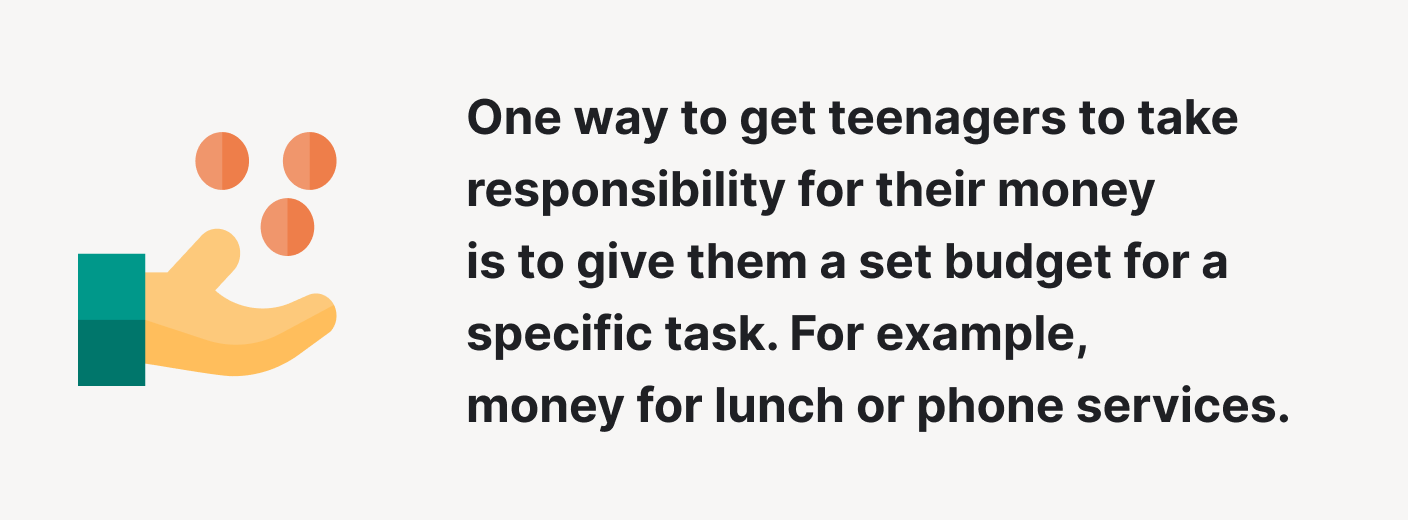
🎒 Persuasive Writing Prompts for Middle School Students
- Tutors should wear uniforms to schools, just like students do. Imagine there is an initiative that wants teachers to do so. Some people believe it is a sign of equality and professional attire. Others think that just a formal dress code is enough. What is your opinion on this?
- Every school has to initiate school trips. Some individuals think they are disruptive to the study process. Other people claim that such trips unite students and are an essential part of education. What do you think? Explain your point of view and why it is the right one.
- Students should learn from famous people from time to time. There is an opportunity for one famous person to come to your school with a motivational speech. Who would you want to come, and why? Discuss why your school can benefit if a celebrity of your choice gives a speech there.,
- Single-sex schools are better than mixed ones. Do you agree or disagree? Why or why not? Talk about your point of view using convincing argumentation.
- Some individuals should lack money. What’s better: enough money to get by or too much money and more problems? Some think that too much money makes you forget about more straightforward and essential things in life. Yes, cash gives more opportunities, but people tend to strive for more money than necessary. What’s the point of millionaires in the 21st century? What is your opinion on this?
- Fast food damages children’s health and should be excluded from the school meal plan. Do you agree or disagree? What are some benefits of having fast food as a meal option at school? Discuss which opinion is more legitimate.
- Educational institutions have to support the arts and sciences more. Imagine there is a new building opening up in your school. The school administration hasn’t decided what is going to be there. It could be an art studio, a new sports center, or a computer class. Explain why it should belong to the arts and sciences. Talk about how such disciplines motivate students to evolve.
- We should study for four days a week. There is a law that considers implementing a more extended weekend. Do you think three days would be too much? Why or why not? Support your point of view with thoughtful arguments.

- Teachers should be required to turn off their mobiles during the classes. You can’t use your phone during the course (or at school). It’s a law in various educational institutions and for obvious reasons. Should teachers be prohibited from using their phones as well? Is it fair?
- It is better to have PE lessons as the first classes of the day. Some people think it is an excellent way to kickstart the day. Others believe that students will be physically tired to carry on with other classes. Which opinion is the right one?
- Plagiarism and cheating should be punished more strictly. Copying others’ works or using crib notes in class is strictly prohibited, yet it happens. Should schools implement more measures to ensure there is no cheating? How can they work?
- Students should select their courses according to their performance. Some people are better at science, while others excel at arts. Would it be better if we were allowed only to study things we are naturally good at? Why or why not? Convince your reader that your opinion is valid.
- You shouldn’t eat in class. Teachers generally think that it interrupts the lesson and distracts other students. At the same time, eating a snack can help you concentrate better and stay energized. Discuss your opinion on this in your essay.
- There should be mixed sports teams at school. Girls often like to play the same sports as boys. Should schools let them play in the same groups? Why or why not? Support your opinion with argumentation.
- Teachers should treat every student equally. It seems like an obvious thing, but the reality is often different. What would you do to make sure everyone is respected? Why?
🖊 Persuasive Writing Prompts for High School Students
- In the US, the 18-year-olds should be allowed to drink alcohol. In the country, driving is permitted after age 16, while drinking becomes legal after 21. How fair are these age thresholds? Statistics show that countries with integrated drinking culture (like France or Italy) have lower alcoholism rates. Would it be better to bring the legal drinking age down to 18? Discuss why or why not, using supportive argumentation.
- The “book of your choice” is fantastic, and here is why. Write a persuasive essay explaining why your favorite book deserves attention. Convince your audience it is worth reading it.
- Time management skill is vital for a successful adult life. It’s what you acquire in school and use for a job. Why is being organized so important? And why should you learn this already in school? Talk about your opinion on this subject.
- What’s more important in school – discipline or an ability to self-express? Some think that you come to school to get knowledge and acquire social skills. However, some students thrive in a less harsh environment. Discuss your point of view and why it is valid.
- Educational institutions should implement anti-bullying policies. School authorities should intervene if a student is bullied by other students, even outside of school. Do you agree or disagree? Convince your reader that your opinion is the most legitimate.
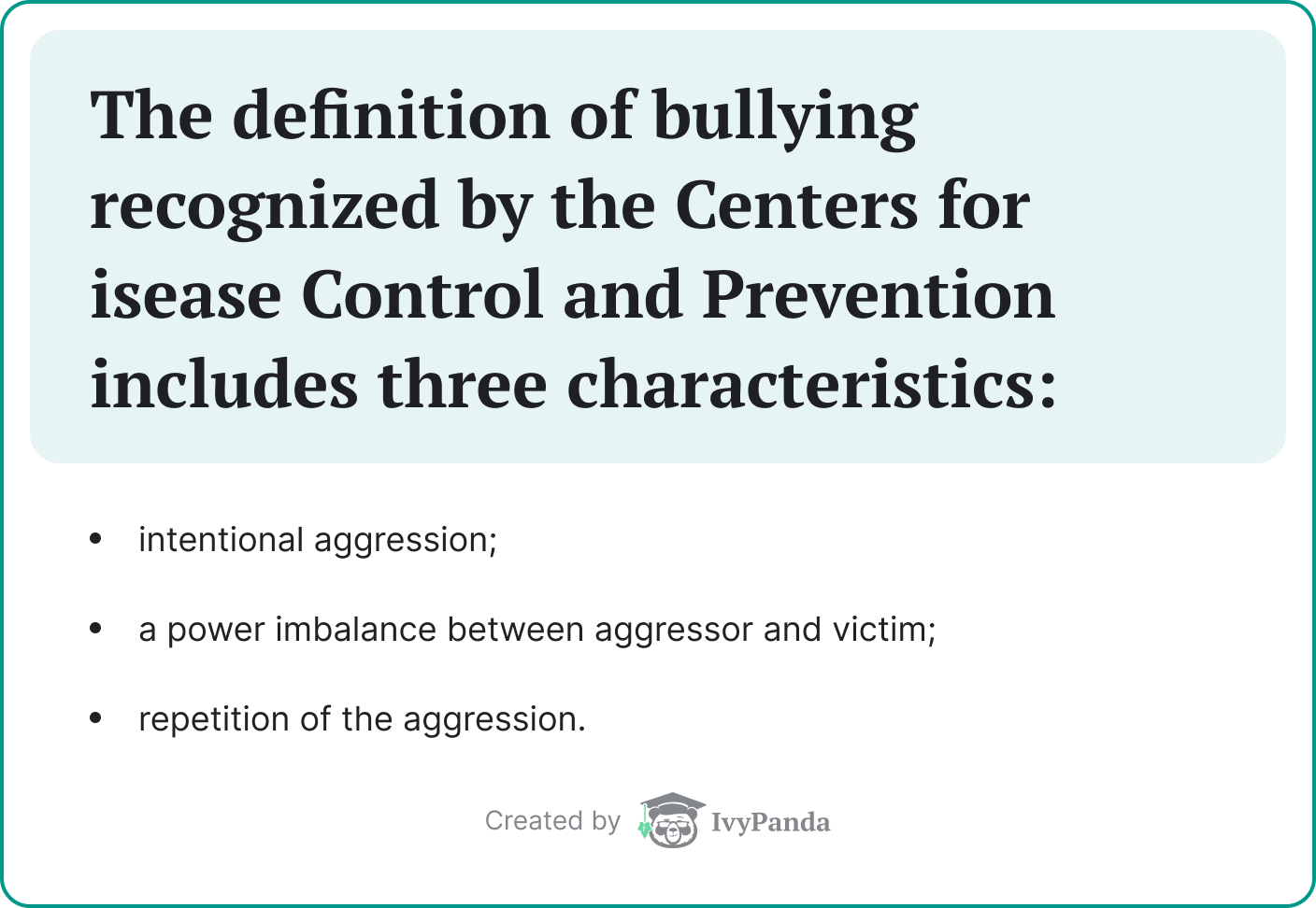
- Parents shouldn’t raise their children the same way they’ve been raised. Some people think there are universal values and principles that parents should teach their kids. While this is true, times change tremendously as generations grow up. What do you think is more just? Discuss your point of view in your essay.
- Your neighborhood requires a renovation. Imagine city authorities are planning on improving your area. What would you change in particular, and why? Write an essay using the appropriate argumentation.
- The importance of community is overrated. Some people are naturally more outgoing and thrive in such environments. Others often feel pressured and may feel out of place. Talk about your opinion on that subject.
- Are fictional books useless? Some people believe fiction improves imagination and teaches empathy. Others consider it a waste of time since there is no actual value in it. Which stance is more valid?
- Life is fair because it is unfair to everyone. Do you think this statement is true? Discuss the issue of class privilege. Do you think modern society gives everyone equal opportunities? Why or why not?
- Community service should be mandatory for high school students. Do you agree or disagree? What kind of activities would be included? Discuss your point of view in your essay.
- Classic literature should be an integral part of the high school curriculum. Should students be required to read old texts like Homer’s Odyssey or Shakespeare’s tragedies? Why or why not?
- You can make a career out of a hobby. True or not? Pick your side of an argument and convince a reader it’s valid.
- It would be better if all countries in the world switched to one currency. There are many aspects to consider when talking about this argument. Which side of it would you support? Why?
- Safety on school property should be a primary concern. Some institutions offer inefficient security services, which can result in tragedies. They may lack funds to ensure their students are safe. Should the government prioritize these issues? Discuss your opinion on this.
🎓 Persuasive Writing Prompts for College Students
- Abortions should be legal in all US states. Some religious communities are vehemently opposed to abortions. People with more liberal beliefs claim that it should be a mother’s personal choice. Discuss your opinion in an essay.
- The military should be voluntary. Military service is a civic duty is some countries. Should it be obligatory everywhere? Why or why not? Persuade your reader that your opinion is the most legitimate.
- Veganism and vegetarianism should become a new norm. They start to gain popularity in Western society. Some people consider it beneficial for health and the environment. Others switch to these diets because good meat is often too pricey. What are the real advantages? Or are they a myth? Discuss your opinion.
- The education system in the Western world has become outdated. Do you agree or disagree? What should be changed to make it more suitable for modern times?
- Your parents shouldn’t be your buddies. What’s better: a parent who is your mentor or best friend? Choose your stance on the subject and defend it using appropriate reasoning.
- Soft skills are more important than hard skills. It is thought that employers often prioritize your personal skills over professional ones at first. Do you think this is the right position? Express your opinion and support it with facts.

- Social media is a major frustrating factor in the lives of many people. Have you ever gotten FOMO looking at other’s picture-perfect lives? Why is it so easy to succumb to this illusion of ideal life? Discuss your opinion on the subject and support your point of view with pertinent facts.
- Democracy has proven to be the most sustainable governmental form. Do you agree or disagree with this statement? Express your opinion and use relevant argumentation in your essay.
- United Nations have become inefficient over time. There is an opinion that the UN does not function properly anymore. Would you agree with this statement?
- Are genderless pronouns a good idea? They have become a crucial tool for transgender and genderfluid people to express their identity. Or does society overthink about words instead of actions? Do you agree or disagree?
💯 Persuasive Essay Writing Topics
If you feel more confident and inspired after reading our prompts list, check out some persuasive writing topics!
🎤 Persuasive writing: Music
- Hip-hop music objectifies women .
- Jazz does not exist anymore.
- Music festivals involve too many drugs.
- Classical music is the most sophisticated genre.
- The music culture of other societies does not get enough attention because of Western dominance .
- Musical therapy is not efficient.
- Patriotic songs can have a stimulating effect on people.
- Listening to music can increase one’s productivity.
- Anyone can learn how to sing.
- Humanity cannot imagine itself without the art of music.
- Music is the most influential form of art.
- Rap should be considered a form of poetry .
- Jazz sounds the best at a live concert .
- A piano is the best musical instrument.
- All children should have musical training at school.
- Music can unite people from all over the world.
- Specific lyrics can trigger aggression in people.
- Queen is the most influential band in Western history.
- To some extent, all music reflects a creator’s personal experience.
- Is the bell ringer a musician?
🦙 Persuasive Writing: Animals
- Wild animals should not be kept in a zoo.
- Animal fights should be illegal.
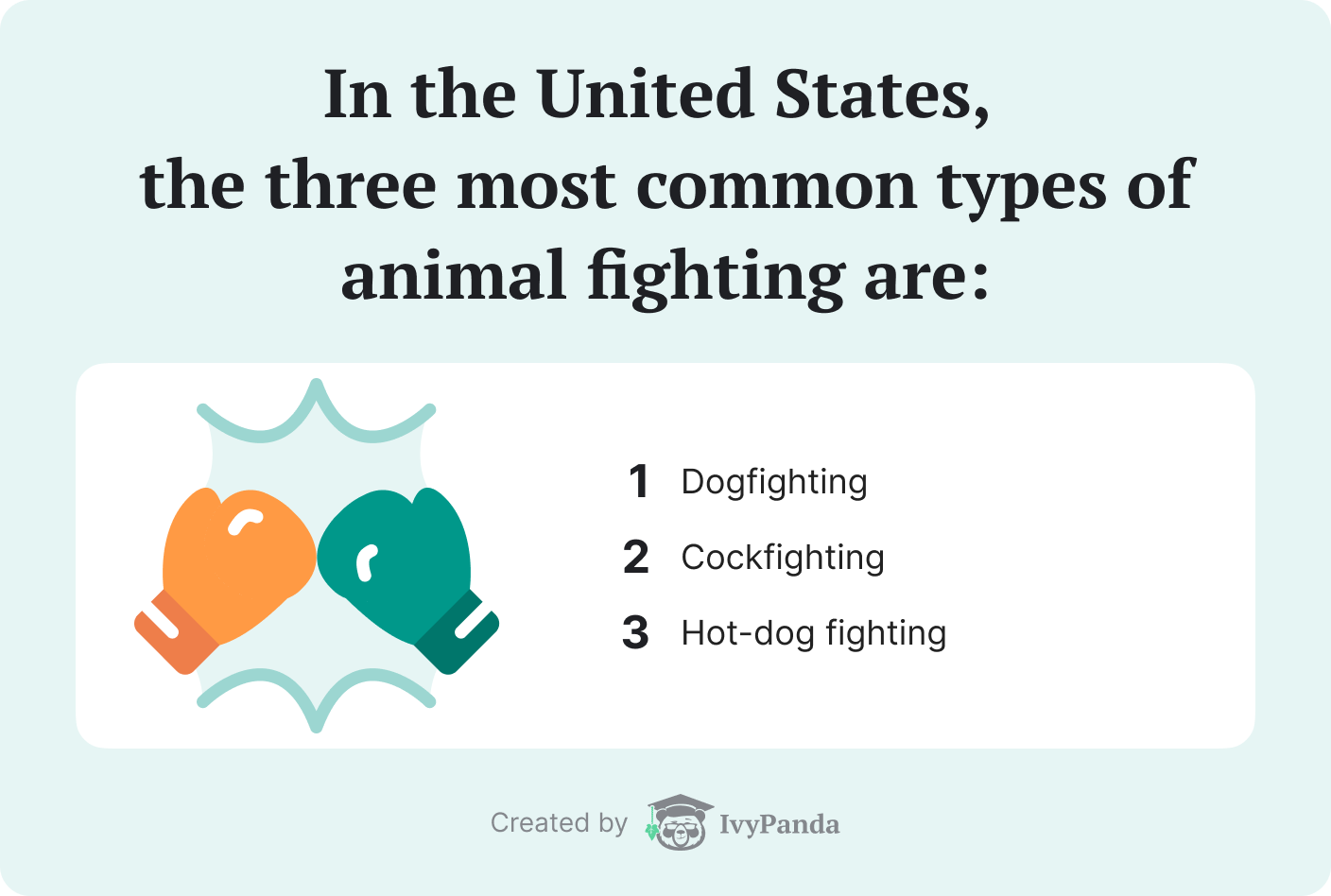
- Hybrid animals are unnatural.
- Agricultural production puts endangered species at more significant risk .
- Slaughtering farm animals for food does not justify their killing .
- Animal hunts should be illegal everywhere.
- There is no better alternative than animal experimentation for some medicine.
- Exotic animals should not be kept as pets.
- Animals should not be treated as objects—they are meant to cohabitate with humans .
- Cow milk is terrible for human health.
- Dolphins are the most intelligent animals.
- Using animals for medical research is unethical.
- There are better alternatives than cosmetic testing on animals .
- Poaching has multiple adverse effects on the economy.
- Farming is a form of animal abuse .
- Zoos can help in preserving endangered animals.
- All makeup brands should switch to cruelty-free policies.
- The use of elephants in the entertainment industry can lead to their extinction .
- Children should be taught how to treat animals.
- A dog is the best animal companion for a human.
🌊 Persuasive Writing: Environment
- Governments should advocate for the use of renewable energy sources.
- Garbage recycling should be obligatory.
- Humanity should take rainforest conservation more seriously.
- Urban areas should implement environment-friendly design and policies .
- There is a connection between waste management and global warming.
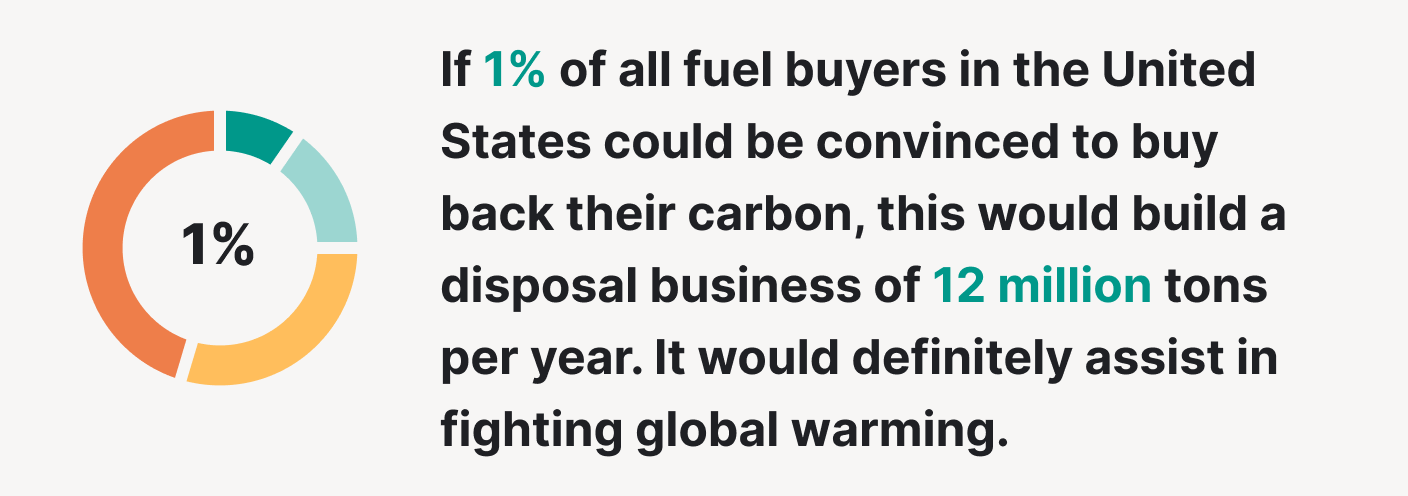
- If proper measures are not taken, the loss of biodiversity in coral reefs will be devastating .
- Greta Thunberg is the voice of her generation . The girl’s letter to the UN was one of the most discussed events of 2019. Talk about why her call to enhance environmental protection is more than timely.
- Sustainable clothing is the best fashion trend in 2023.
- Poor farming technologies accelerate climate change .
- Water pollution will soon become a more significant issue than air pollution.
- Environmental conservation is an essential element of economic growth in developing countries .
- First-world countries should implement a carbon tax.
- It is impossible to decrease environmental pollution without severe damage to the world’s economy .
- Weather forecasts are too inaccurate.
- Climate change trends have made the risk of natural disasters worse.
🌽 Persuasive writing: Food
- Parents in America should take better care of their children’s diets . Childhood obesity is a growing concern in the US.
- Healthy eating is more important than exercise.
- Overeating junk food affects mental health.
- Restaurants should be transparent about the nutritional value of the food they serve.
- There is no harm in consuming GMOs .
- Addiction to sugar can be worse than drug addiction.
- The fast-food industry isn’t entirely responsible for consumers’ health . It is up to every individual to take care of their diet.
- Food is not just fuel; it’s a leisure experience .
- Schools must provide students with healthy food options.
- Intuitive eating is the best diet.
- The downsides of sugar substitutes aren’t thoroughly researched .
- Being underweight is more dangerous than being overweight.
- Social and psychological factors have a notable role in obesity development .
- Eating meat is bad for health.
- Food supplements are harmful.
🕹 Persuasive Writing: Video Games
- Violence in video games causes behavioral problems in kids .
- Board games will never go out of fashion.
- Playing computer games can develop one’s cognitive skills .
- Game addiction is a more prominent concern than most of us realize.
- Virtual reality can disrupt one’s social skills .
- Children should have limited access to certain video games.
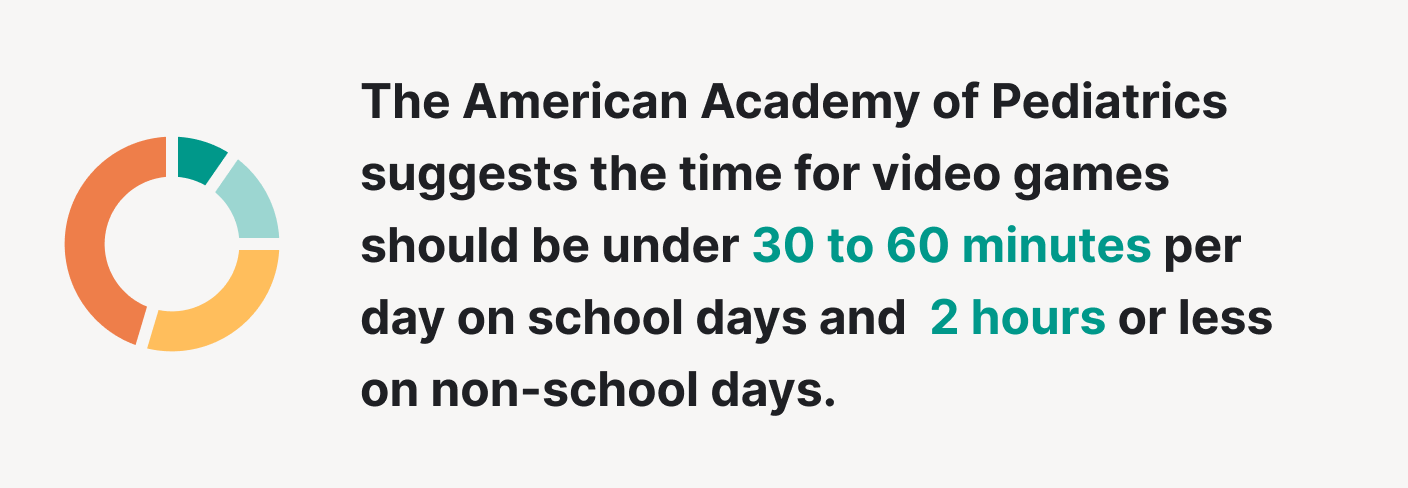
- There is no place for gaming in education.
- Certain video games can be beneficial for human health and brains.
- Hunger Games should not have been turned into a franchise.
- Gaming will become the most popular leisure activity in 30 years.
- You can earn a fortune by playing online games.
- Video games have multiple adverse effects on children .
- Gaming is just a way to escape reality.
- First-person shooter games improve one’s reaction and reflexes.
- Playing video games too much affects one’s academic and life performance.
🔌 Persuasive Writing: Technology
- Siri is the best example of publicly available Artificial intelligence .
- Computer science classes at school should incorporate beginner-level software engineering.
- Internet is humanity’s greatest invention.
- E-learning in medicine is still too expensive .
- Nowadays, nobody’s personal data is protected.
- If World War III happens, it will be a war of modern technology and information, not nuclear power.
- Genetically modified organisms are science’s big mistake.
- Cloning should be illegal.
- Cell phone addiction will soon become humanity’s worst challenge.
- Cyberbullying leads to drug and alcohol abuse among the youth .
- Robots will never be able to replace humans .
- Technology can help individuals with learning disabilities .

- Drones are an invasion of privacy and should be illegal.
- Apple is the best technology brand on the market.
- Data mining is an essential part of every company’s marketing strategy .
Thank you for reading the article! Leave a comment below to let us know what you think. Share the page with friends who may find the persuasive writing prompts and topics useful.
🔗 References
- 15 Awesome Persuasive Writing Prompts: Thoughtful Learning, K-12
- 200 Prompts for Argumentative Writing: Michael Gonchar, The New York Times
- English II Persuasive Essay [10th grade]: Brianna Johnson, Trinity College
- Writing Prompt (Composition): Richard Nordquist, ThoughtCo
- What Is a Writing Prompt: Karen Frazier, LoveToKnow
- What Makes a Great Writing Prompt: Laura Davis, Kripalu
- Writing Prompts for Middle School: Holt McDougal Online
- Persuasive Essay Outline: Houston Community College Learning Web
- Tips To Write An Effective Persuasive Essay: Melissa Burns, The College Puzzle
- Counterargument: Gordon Harvey for the Writing Center at Harvard University
- Persuasive Essay: EssayInfo, Writing Guides
- Ten Timeless Persuasive Writing Techniques: Brian Clark, CopyBlogger
- 31 Powerful Persuasive Writing Techniques: Karri Stover, Writtent
- A CS Research Topic Generator or How To pick A Worthy Topic In 10 Seconds: Department of Computer Science, Purdue University
- Share via Facebook
- Share via Twitter
- Share via LinkedIn
- Share via email
100 Persuasive Essay Topics
- M.Ed., Education Administration, University of Georgia
- B.A., History, Armstrong State University
Persuasive essays are a bit like argument essays , but they tend to be a little kinder and gentler. Argument essays require you to discuss and attack an alternate view, while persuasive essays attempt to convince the reader that you have a believable argument. In other words, you are an advocate, not an adversary.
Writing a compelling persuasive essay requires you to select a topic that ideally stirs your readers' emotions. Before settling on a subject, explore some options to find one that helps craft the strongest and most engaging argument.
Below is a list of potential persuasive essay topics to spark your brainstorming process. You can choose a topic from this list or use it as inspiration to develop an idea of your own.
Main Components of a Persuasive Essay
- Introduction : This is the opening paragraph of your essay. It contains the hook , which is used to grab the reader's attention, and the thesis , or argument, which you'll explain in the next section.
- Body : This is the heart of your essay, usually three to five paragraphs in length. Each paragraph examines one theme or issue used to support your thesis.
- Conclusion : This is the final paragraph of your essay. In it, you'll sum up the main points of the body and connect them to your thesis. Persuasive essays often use the conclusion as a final appeal to the audience.
Learning how to write a persuasive essay is an essential skill people use every day in fields from business to law to media and entertainment. English students can begin writing a persuasive essay at any skill level. You'll surely find a sample topic or two from the list of 100 persuasive essays below, sorted by degree of difficulty.
Watch Now: 12 Ideas for Great Persuasive Essay Topics
Beginner topics.
- Kids should get paid for good grades.
- Students should have less homework.
- Snow days are great for family time.
- Penmanship is important.
- Short hair is better than long hair.
- We should all grow our own vegetables.
- We need more holidays.
- Aliens probably exist.
- Gym class is more important than music class.
- Kids should be able to vote.
- Kids should get paid for extra activities like sports.
- School should take place in the evenings.
- Country life is better than city life.
- City life is better than country life.
- We can change the world.
- Skateboard helmets should be mandatory.
- We should provide food for the poor.
- Children should be paid for doing chores.
- We should populate the moon .
- Dogs make better pets than cats.
Intermediate Topics
- The government should impose household trash limits.
- Nuclear weapons are an effective deterrent against foreign attack.
- Teens should be required to take parenting classes.
- We should teach etiquette in schools.
- School uniform laws are unconstitutional.
- All students should wear uniforms.
- Too much money is a bad thing.
- High schools should offer specialized degrees in arts or sciences.
- Magazine advertisements send unhealthy signals to young women.
- Robocalling should be outlawed.
- Age 12 is too young to babysit.
- Children should be required to read more.
- All students should be allowed to study abroad.
- Yearly driving tests should be mandatory past age 65.
- Cell phones should never be used while driving.
- All schools should implement bullying awareness programs.
- Bullies should be kicked out of school.
- Parents of bullies should have to pay a fine.
- The school year should be longer.
- School days should start later.
- Teens should be able to choose their bedtime.
- There should be a mandatory entrance exam for high school.
- Public transit should be privatized.
- We should allow pets in school.
- The voting age should be lowered to 16.
- Beauty contests are bad for body image.
- Every American should learn to speak Spanish.
- Every immigrant should learn to speak English.
- Video games can be educational.
- College athletes should be paid for their services.
- We need a military draft .
- Professional sports should eliminate cheerleaders.
- Teens should be able to start driving at 14 instead of 16.
- Year-round school is a bad idea.
- High school campuses should be guarded by police officers.
- The legal drinking age should be lowered to 19.
- Kids under 15 shouldn't have Facebook pages.
- Standardized testing should be eliminated.
- Teachers should be paid more.
- There should be one world currency.
Advanced Topics
- Domestic surveillance without a warrant should be legal.
- Letter grades should be replaced with a pass or fail.
- Every family should have a natural disaster survival plan.
- Parents should talk to kids about drugs at a young age.
- Racial slurs should be illegal.
- Gun ownership should be tightly regulated.
- Puerto Rico should be granted statehood.
- People should go to jail when they abandon their pets.
- Free speech should have limitations.
- Members of Congress should be subject to term limits.
- Recycling should be mandatory for everyone.
- High-speed internet access should be regulated like a public utility.
- Yearly driving tests should be mandatory for the first five years after getting a license.
- Recreational marijuana should be made legal nationwide.
- Legal marijuana should be taxed and regulated like tobacco or alcohol.
- Child support dodgers should go to jail.
- Students should be allowed to pray in school.
- All Americans have a constitutional right to health care.
- Internet access should be free for everyone.
- Social Security should be privatized.
- Pregnant couples should receive parenting lessons.
- We shouldn't use products made from animals.
- Celebrities should have more privacy rights.
- Professional football is too violent and should be banned.
- We need better sex education in schools.
- School testing is not effective.
- The United States should build a border wall with Mexico and Canada.
- Life is better than it was 50 years ago.
- Eating meat is unethical.
- A vegan diet is the only diet people should follow.
- Medical testing on animals should be illegal.
- The Electoral College is outdated.
- Medical testing on animals is necessary.
- Public safety is more important than an individual's right to privacy.
- Single-sex colleges provide a better education.
- Books should never be banned.
- Violent video games can cause people to act violently in real life.
- Freedom of religion has limitations.
- Nuclear power should be illegal.
- Climate change should be the president's primary political concern.
Key Takeaways
- Persuasive essays aim to convince rather than confront, effectively making you advocate for a position or idea.
- Choosing a compelling topic that evokes emotions is crucial for crafting a strong persuasive essay.
- The main parts of a persuasive essay are the introduction (with a hook and thesis), body paragraphs (explaining themes supporting the thesis), and conclusion (summarizing main points and making a final appeal).
Hamilton College. " Writing a Persuasive Essay ."
- 100 Persuasive Speech Topics for Students
- 50 Argumentative Essay Topics
- Middle School Debate Topics
- 40 Writing Topics for Argumentative and Persuasive Essays
- Tips on How to Write an Argumentative Essay
- 501 Topic Suggestions for Writing Essays and Speeches
- How to Write a Solid Thesis Statement
- The Ultimate Guide to the 5-Paragraph Essay
- Write an Attention-Grabbing Opening Sentence for an Essay
- How to Write a Narrative Essay or Speech
- Expository Essay Genre With Suggested Prompts
- Write a Compare and Contrast Essay
- How To Write an Essay
- How to Write a Great Essay for the TOEFL or TOEIC
- Bad Essay Topics for College Admissions
- What Is Expository Writing?
- Grades 6-12
- School Leaders
Enter Today's Teacher Appreciation Giveaway!
101 Interesting Persuasive Essay Topics for Kids and Teens
Use your words to sway the reader.
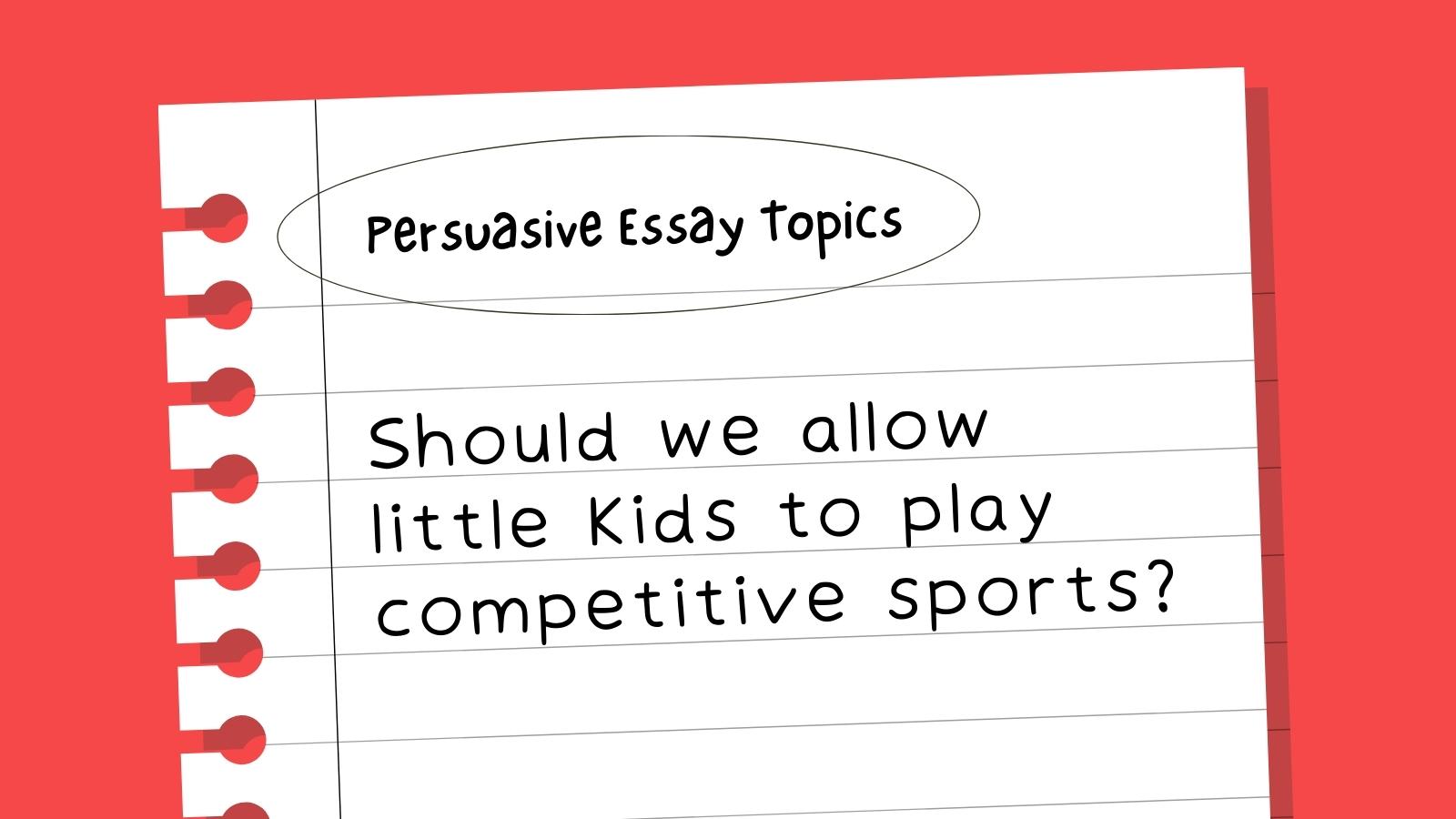
Persuasive writing is one of those skills that can help students succeed in real life. Persuasive essays are similar to argumentative , but they rely less on facts and more on emotion to sway the reader. It’s important to know your audience so you can anticipate any counterarguments they might make and try to overcome them. Try reading some mentor texts to show kids great examples of opinion writing. Then use these persuasive essay topics for practice.
School and Education Persuasive Essay Topics
Life and ethics persuasive essay topics, science and technology persuasive essay topics, sports and entertainment persuasive essay topics, just for fun persuasive essay topics.
- Do you think homework should be required, optional, or not given at all?

- Students should/should not be able to use their phones during the school day.
- Should schools have dress codes?
- If I could change one school rule, it would be …
- Is year-round school a good idea?
- Should we stop giving final exams?
- Is it better to be good at academics or good at sports?
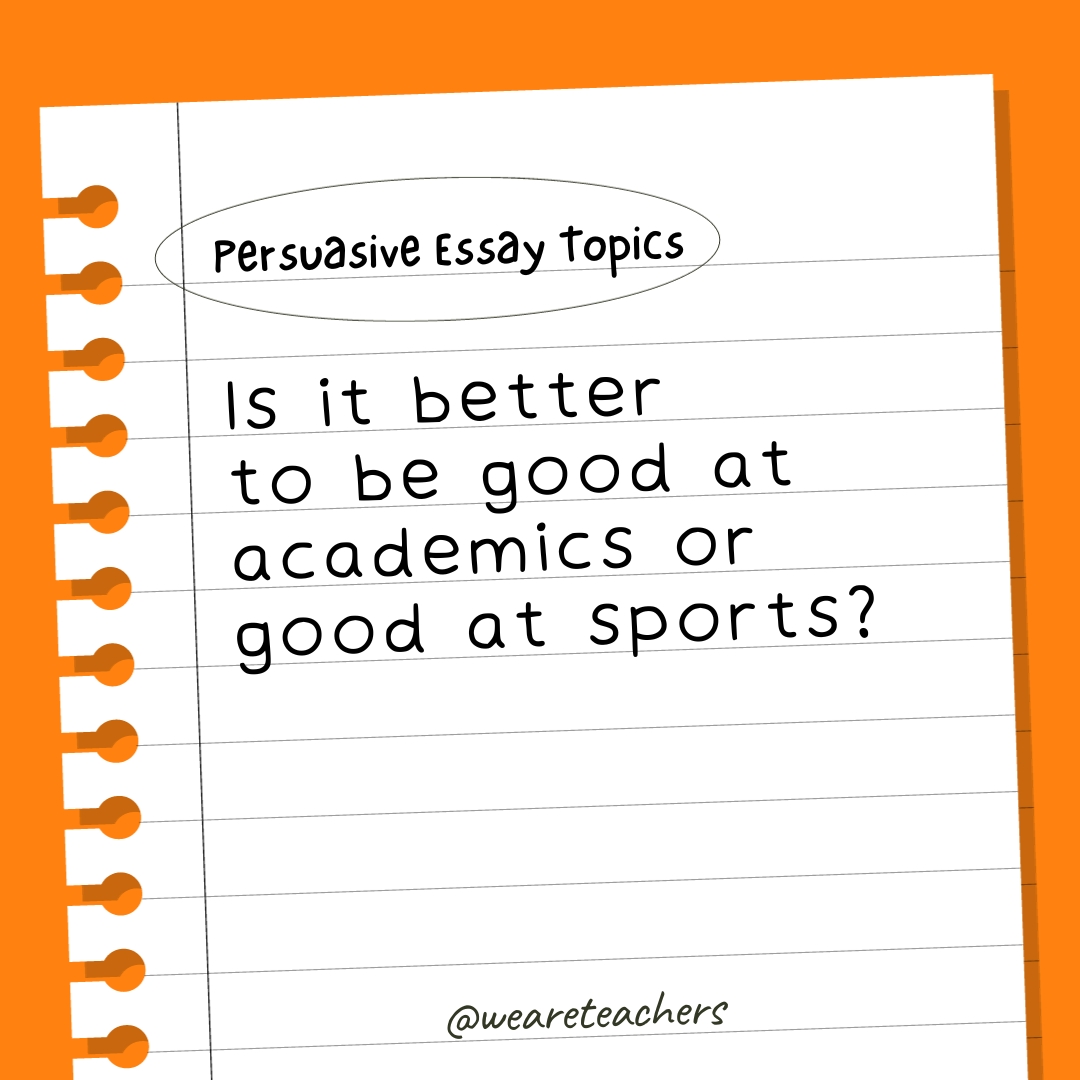
- Which is better, private schools or public schools?
- Should every student have to participate in athletics?
- Do you think schools should ban junk food from their cafeterias?
- Should students be required to volunteer in their communities?
- What is the most important school subject?
- Are letter grades helpful, or should we replace them with something else?
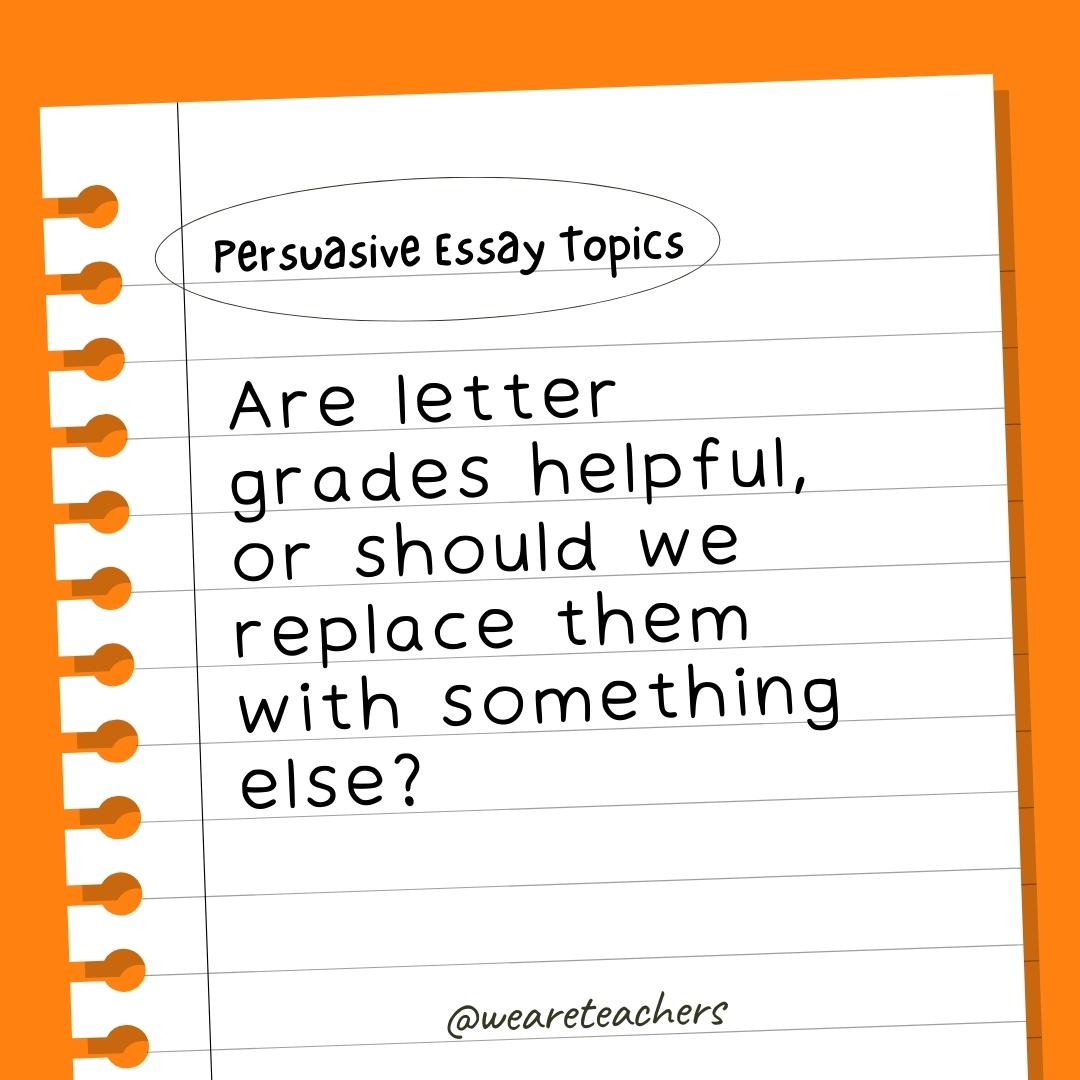
- Is it ever OK to cheat on homework or a test?
- Should students get to grade their teachers?
- Do you think college should be free for anyone who wants to attend?
- Should schools be allowed to ban some books from their libraries?
- Which is better, book smarts or street smarts?
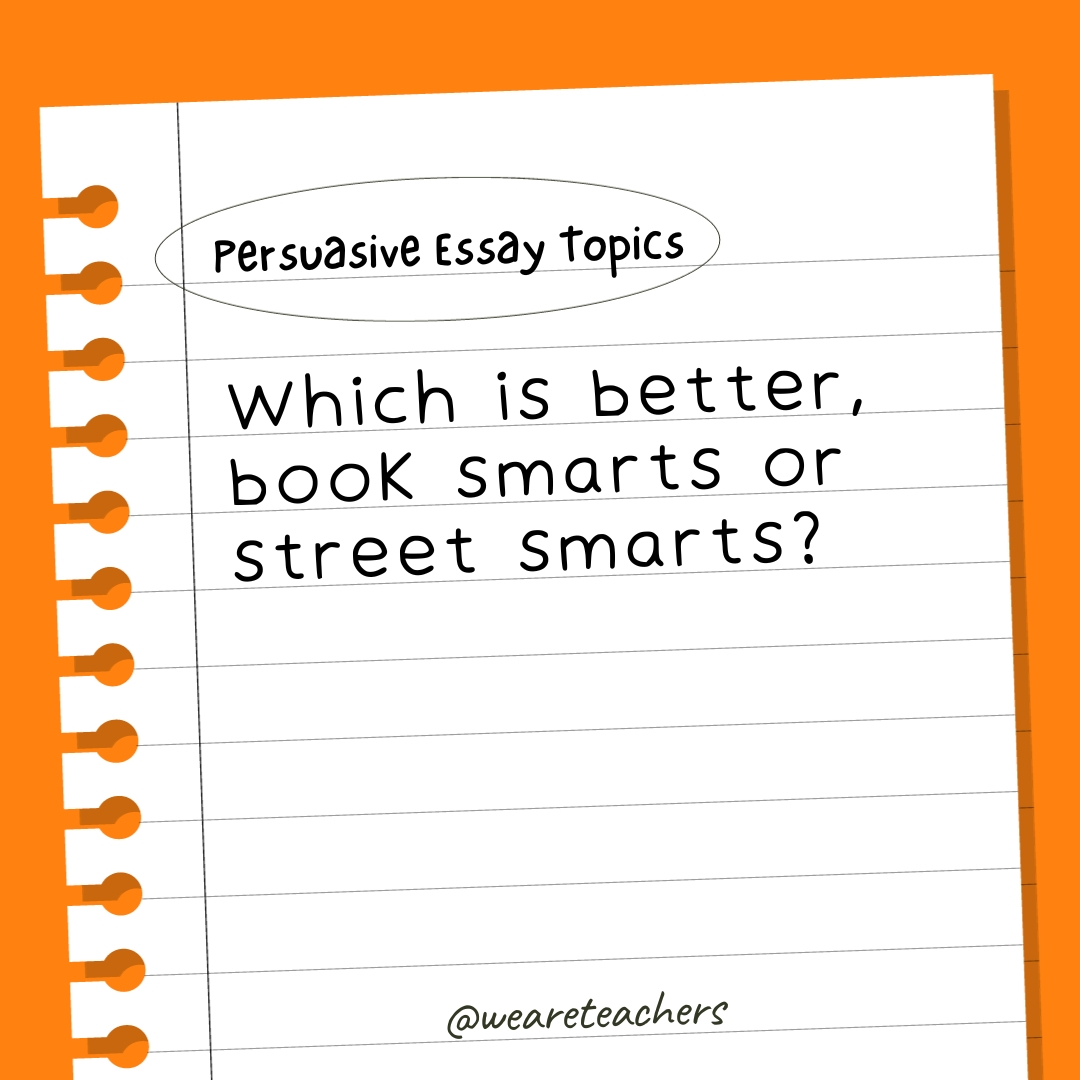
- Should all students have to learn a foreign language?
- Are single-gender schools better or worse for students?
- Is it OK to eat animals?
- What animal makes the best pet?
- Visit an animal shelter, choose an animal that needs a home, and write an essay persuading someone to adopt that animal.
- If you find money on the ground, should you try to find the person who lost it, or is it yours to keep?
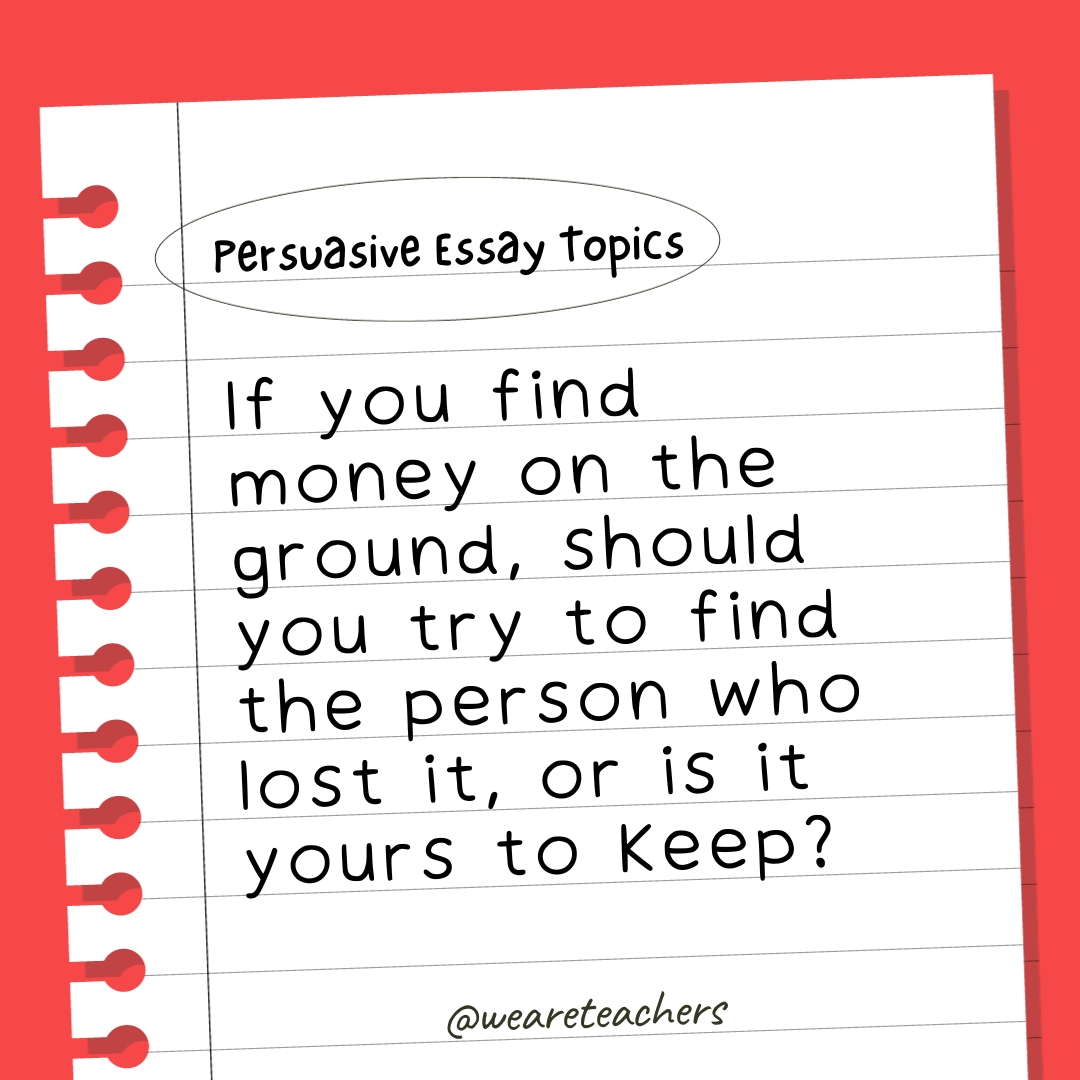
- Who faces more peer pressure, girls or boys?
- Should all Americans be required to vote?
- Is it better to be kind or truthful?
- Which is better, giving or receiving?
- Is it OK to keep animals in zoos?
- Should we change the minimum driving age in the United States?
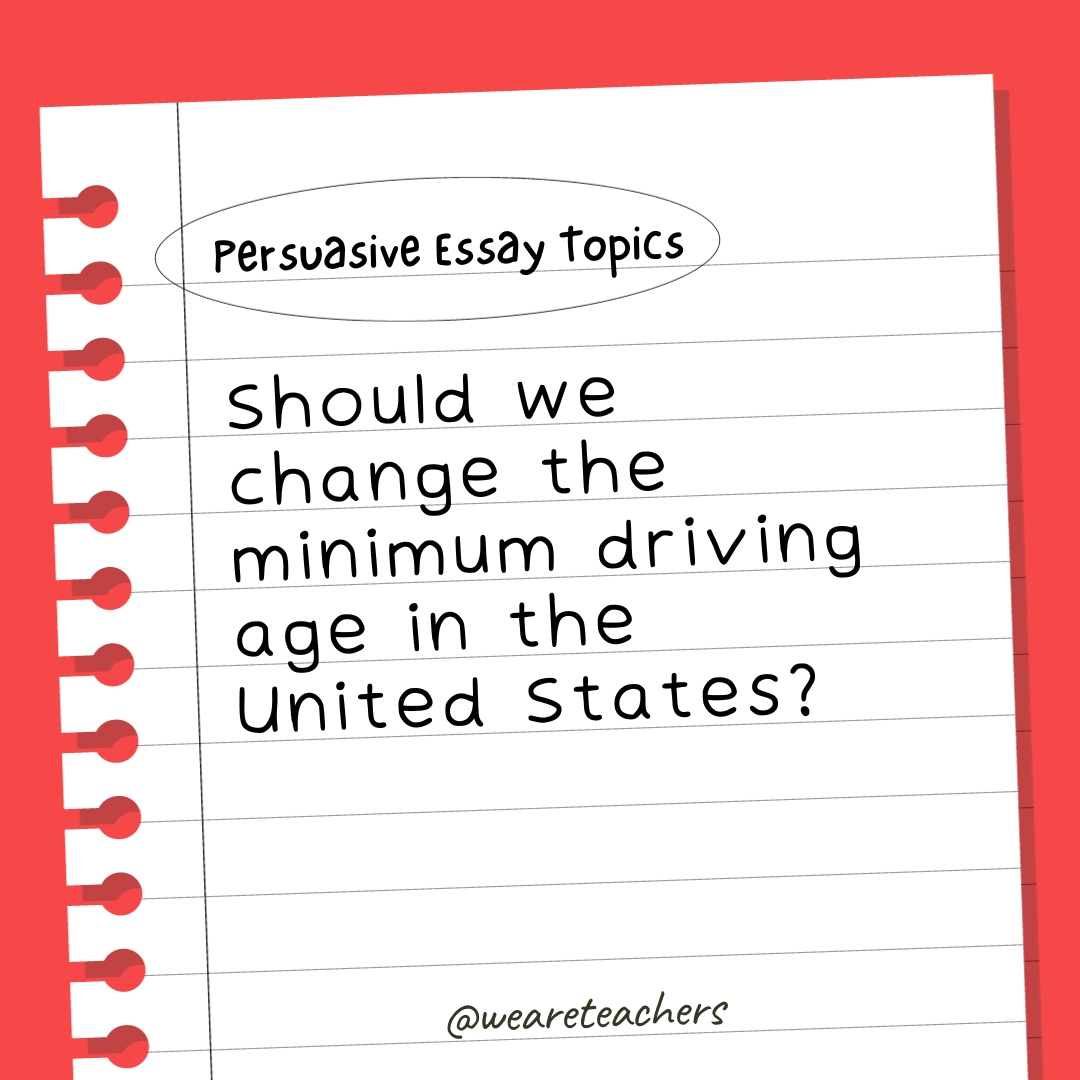
- Which is more important, happiness or success?
- Is democracy the best form of government?
- Is social media helpful or harmful?
- Should parents be punished for their children’s mistakes or crimes?
- Should kids have set bedtimes or just go to bed when they’re sleepy?
- Do you think the government should find a way to provide free health care for everyone?
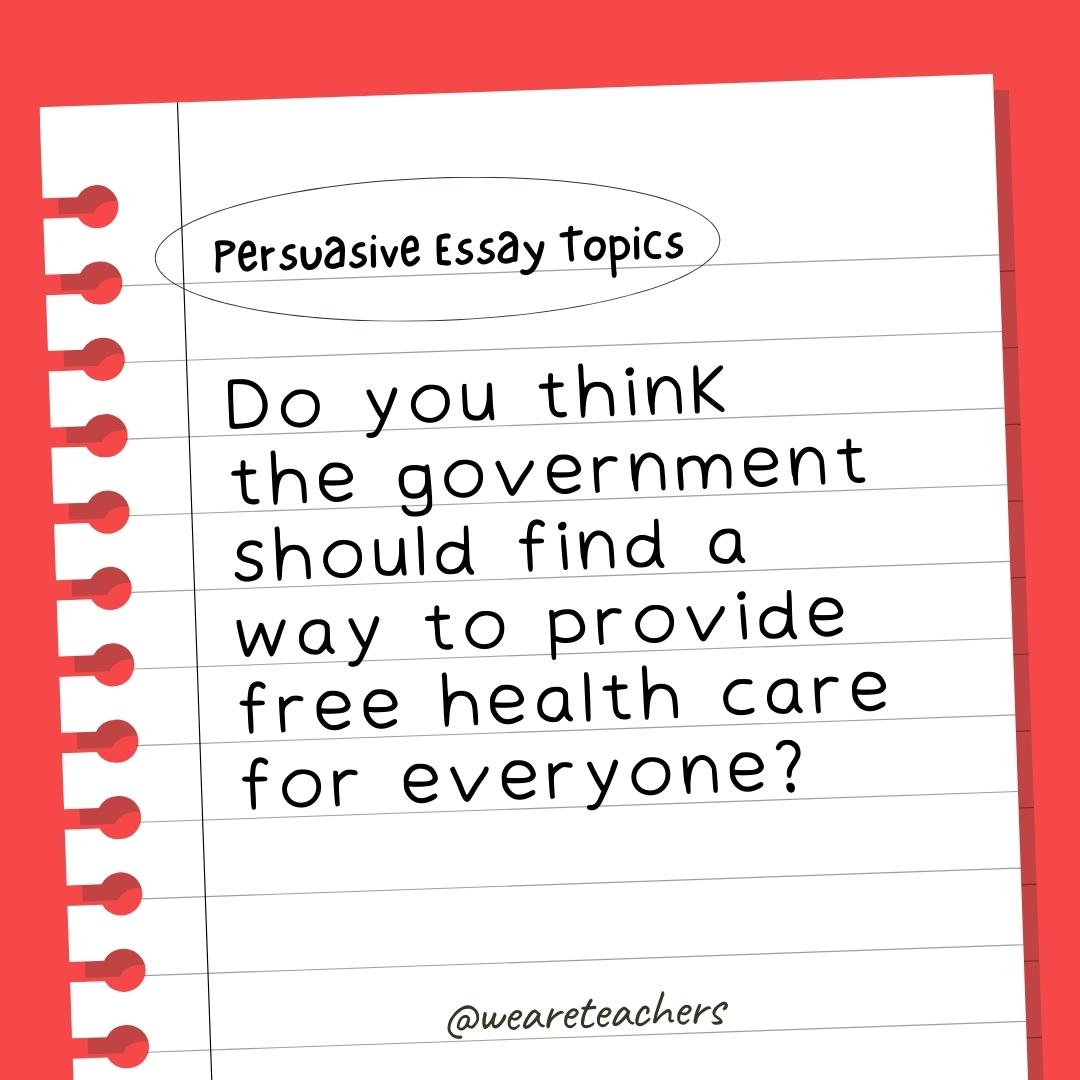
- Is it better to save your allowance or spend it?
- Should we ban plastic bags and bottles?
- Which is better, living in the city or in the country?
- If I could make a new law, it would be …
- Is Pluto a planet?
- Should human cloning be legal?
- Should vaccines be mandatory?
- Is it right for countries to still maintain nuclear weapon arsenals?
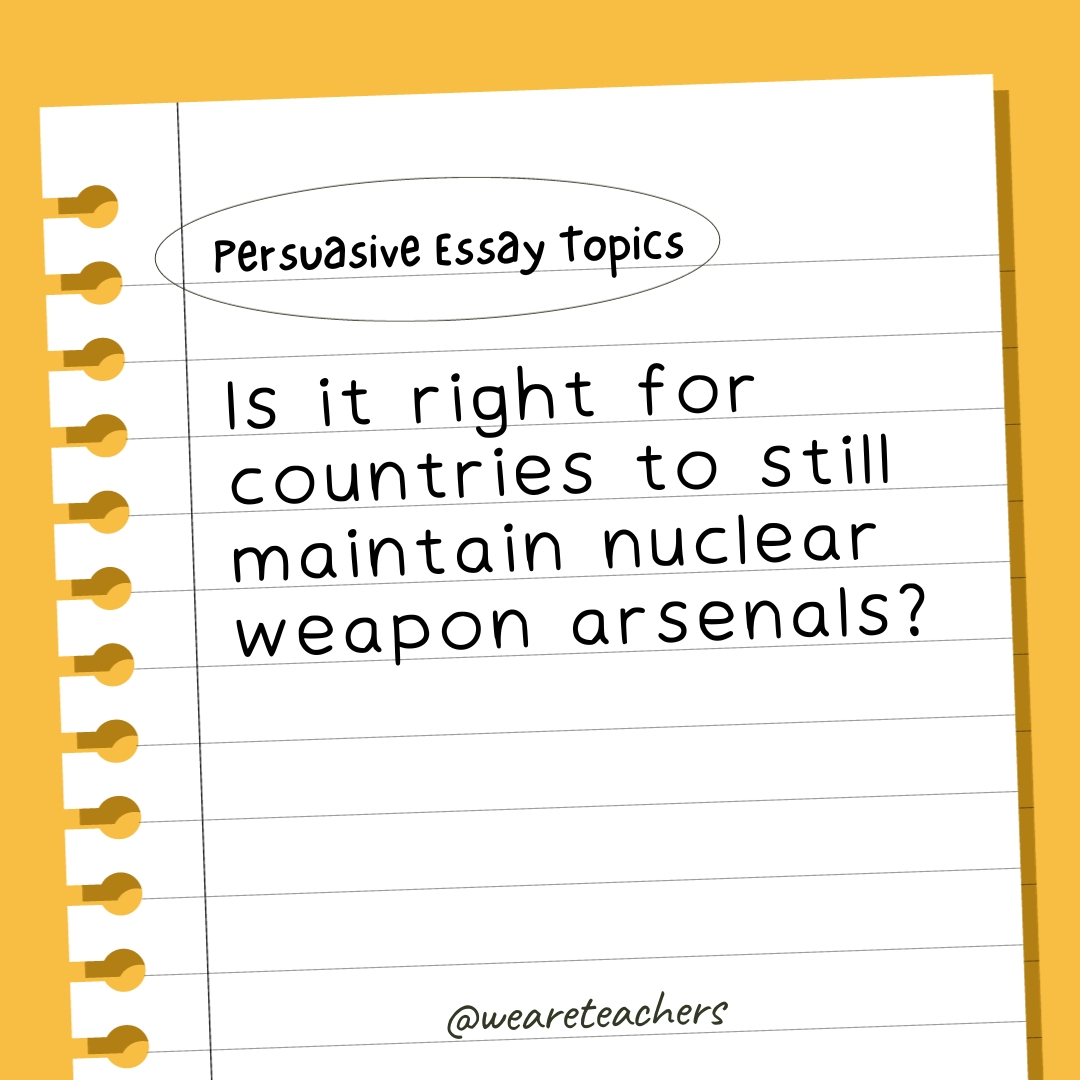
- Should testing on animals be made illegal?
- Will expanded use of artificial intelligence be good for humanity?
- Should all people have free Internet access in their homes?
- Is there intelligent life on other planets?
- Does technology create more jobs than it eliminates?
- Should parents use their children’s cell phones to track where they are?
- Should scientists try to develop a way for people to live forever?
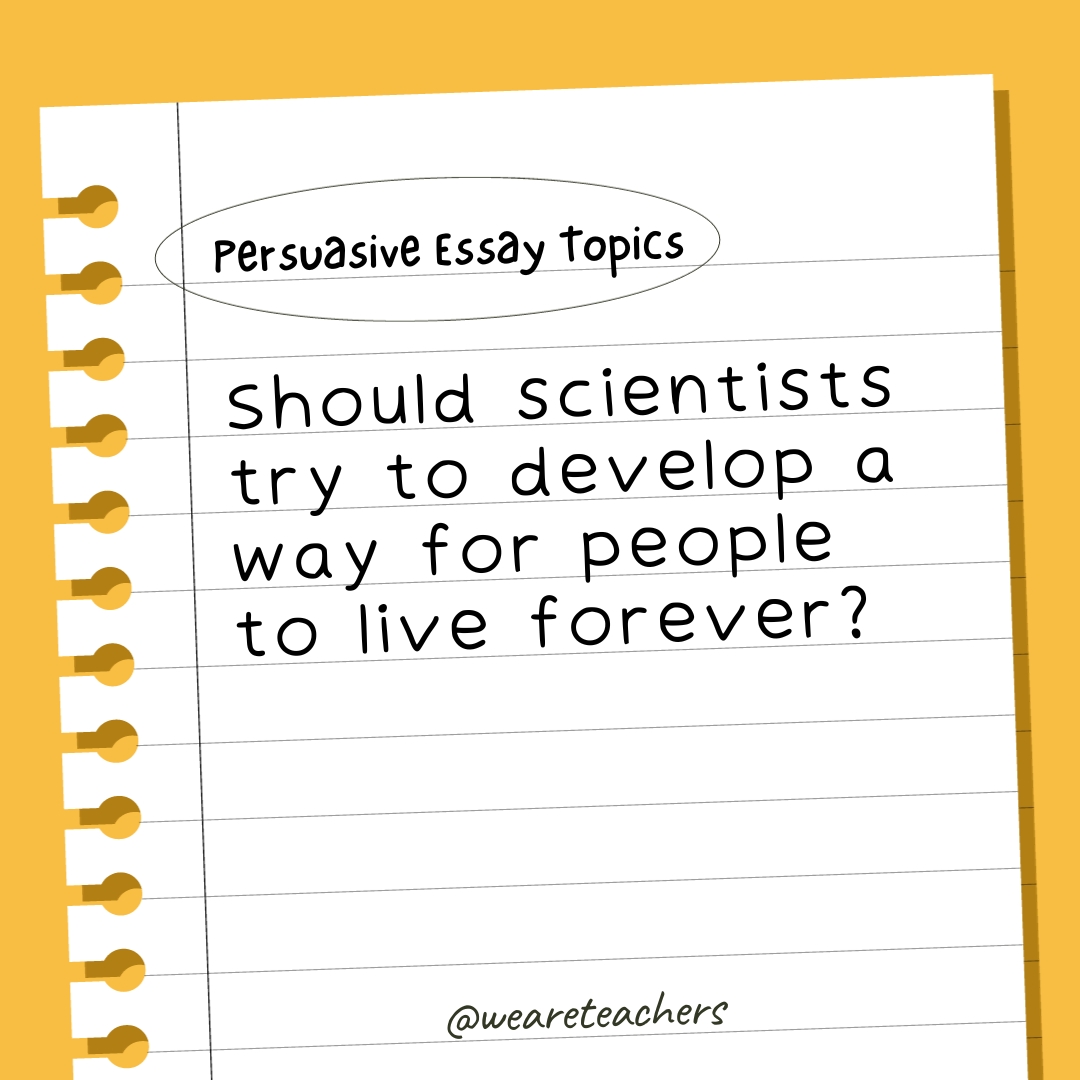
- What’s the best type of smartphone: Android or iPhone?
- Which is better, Macs or PCs?
- Do people rely too much on technology in the modern world?
- Should cryptocurrencies replace cash?
- Should there be a minimum age requirement to own a smartphone?
- Is it important to keep spending money on space exploration, or should we use the money for other things?

- Should kids under 13 be allowed to use social media sites?
- Should we ban cigarette smoking and vaping entirely?
- Is it better to be an animal that lives in the water or on land?
- Should kids be allowed to watch TV on school nights?
- Which is better, paper books or e-books?
- Is the current movie rating system (G, PG, PG-13, etc.) effective?
- Are video games better than board games?
- Should we allow little kids to play competitive sports?
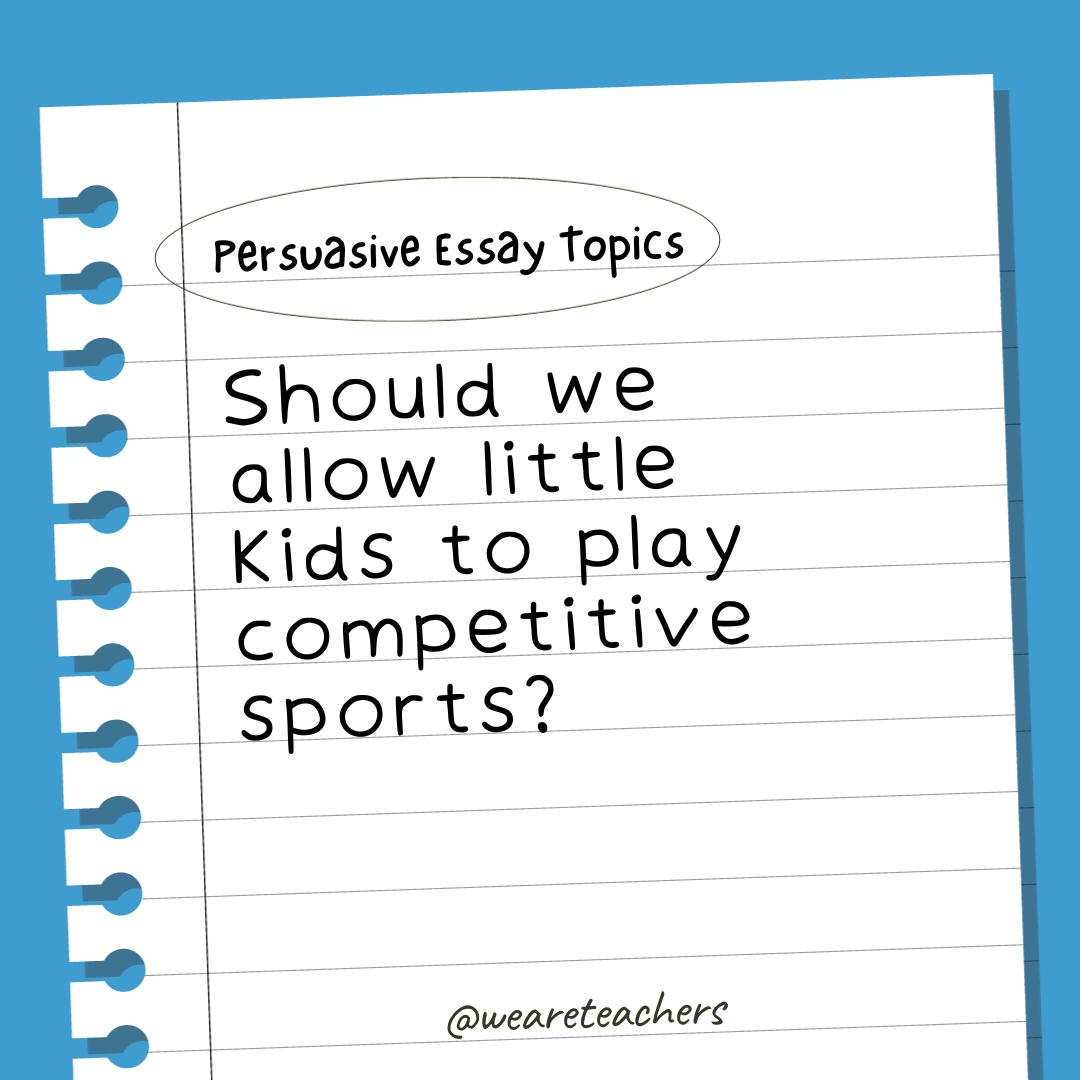
- Which is better, reading books or watching TV?
- Does playing violent video games make people more violent in real life?
- Are graphic novels just as valuable as traditional fictional books?
- Should everyone play on the same sports teams, regardless of gender?
- Choose a book that’s been made into a movie. Which was better, the movie or the book?

- Who is the world’s best athlete, present or past?
- Are professional athletes/musicians/actors overpaid?
- Which is better, fiction or nonfiction?
- The best music genre is …
- What is one book that everyone should read?
- What new sport should be added to the Olympics?
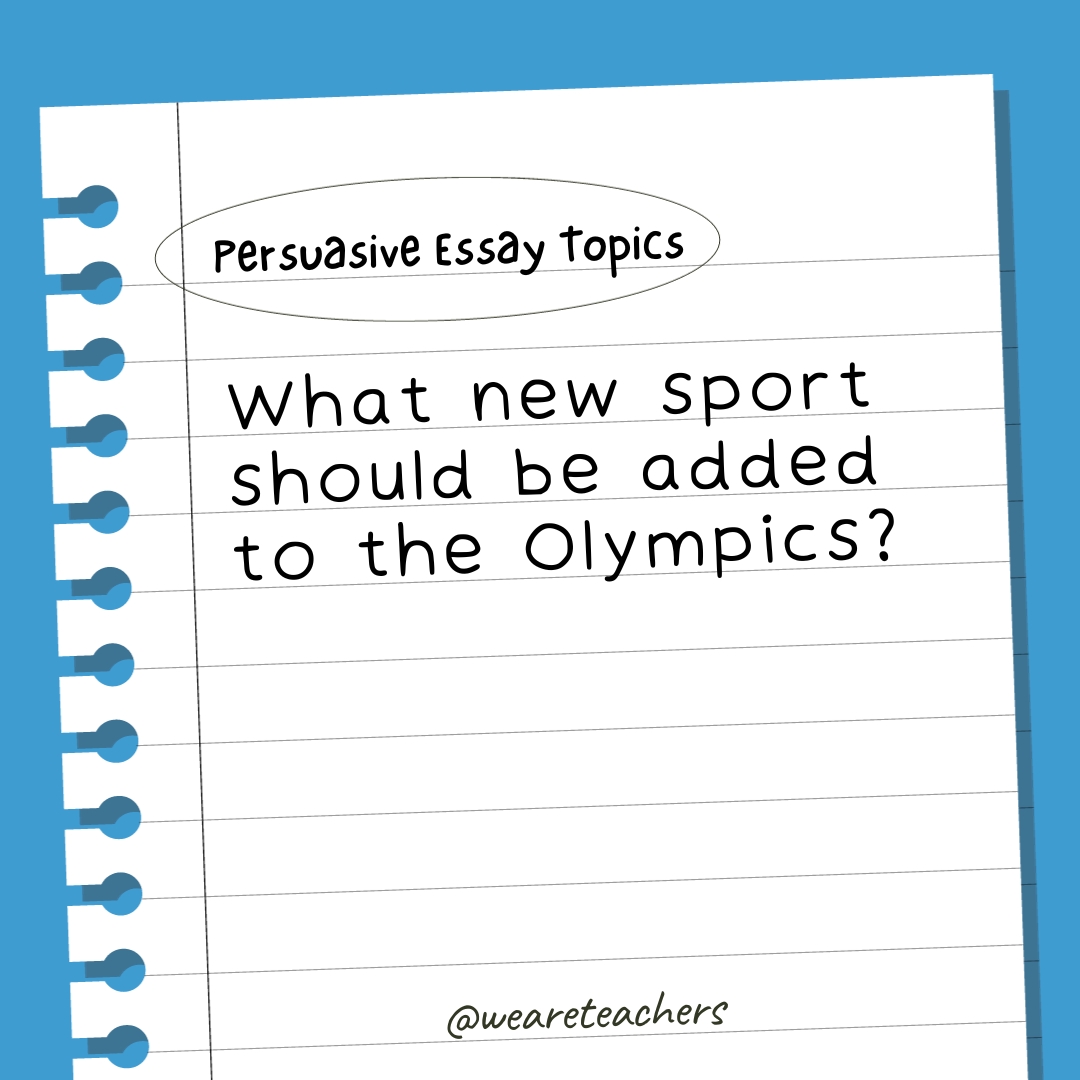
- What’s the best video game system?
- Does playing video games make you smarter?
- Does reality TV actually depict real life?
- Should all neighborhoods have free parks and playgrounds?
- What’s the best holiday?
- The very best food of all time is …
- Which is better, artificial Christmas trees or real ones?
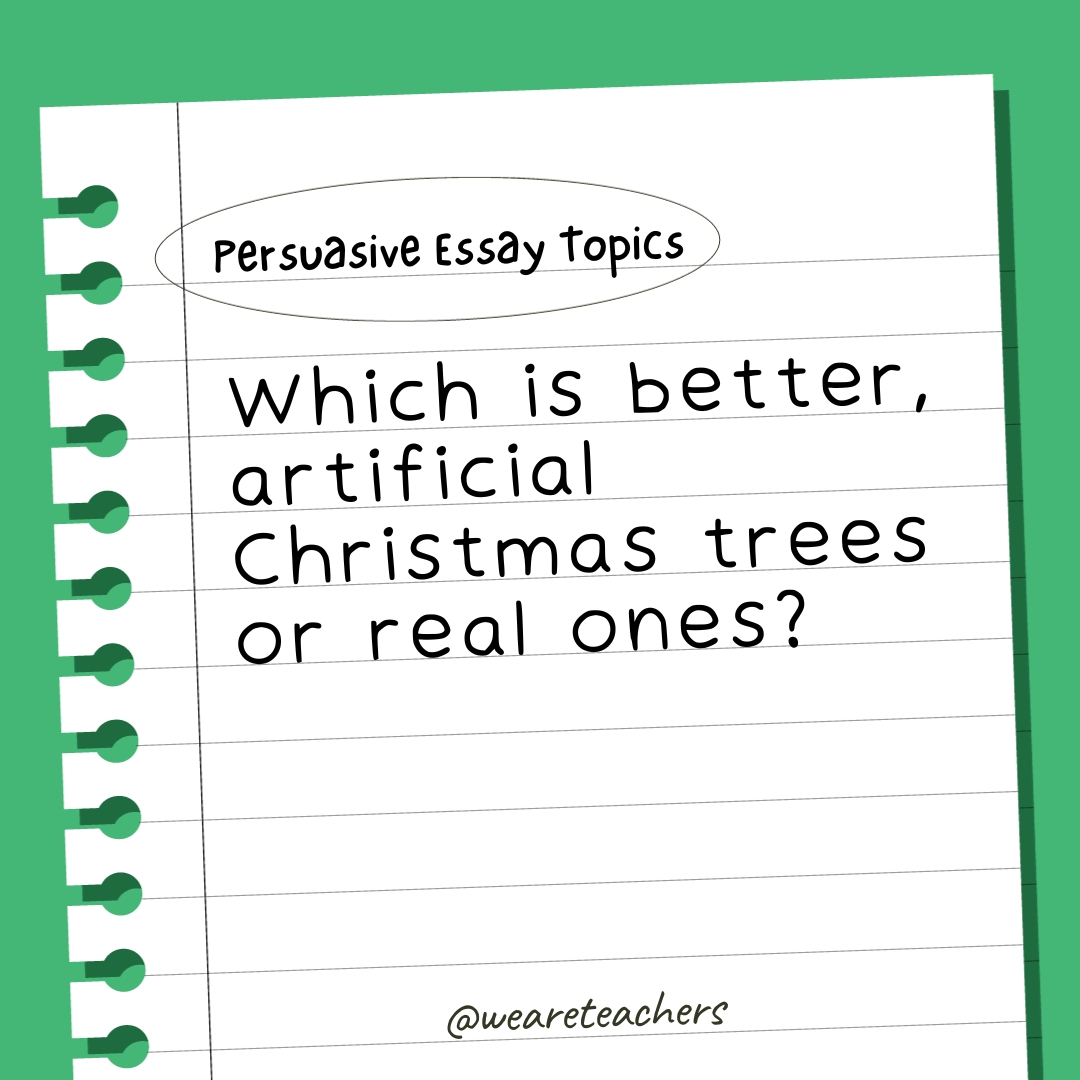
- What’s the best season of the year?
- Should you put ketchup on a hot dog?
- Is a taco a sandwich?
- Does fruit count as dessert?
- Should people have to go to school or work on their birthday?
- Are clowns scary or funny?
- Which is more dangerous, werewolves or vampires?
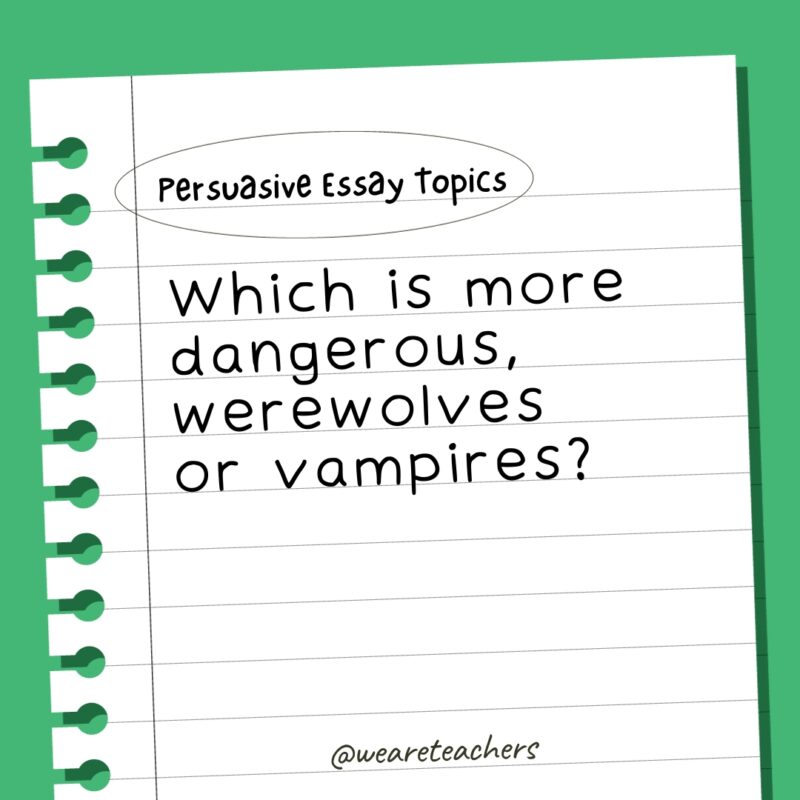
- The best pizza topping is …
- What would be the best superpower to have?
- Should everyone make their bed every day?
- Which came first, the chicken or the egg?
- Should you put pineapple on a pizza?
- Should you eat macaroni and cheese with a spoon or a fork?
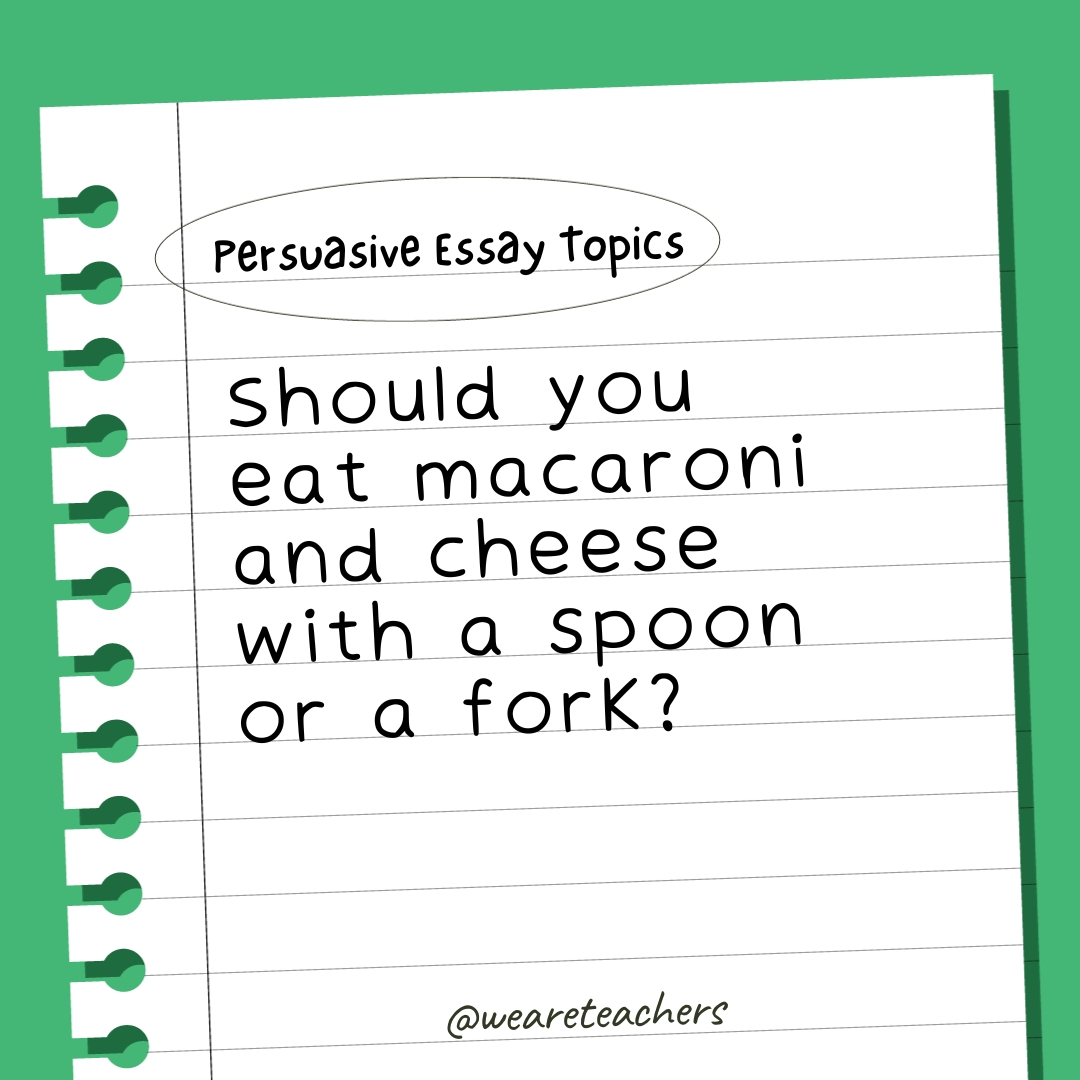
- Describe the world’s best ice cream sundae.
- Is Monday the worst day of the week?
- Would you rather travel back in time or forward in time?
- Is it better to be too hot or too cold?
- Are there aliens living among us here on Earth?
What are your favorite persuasive essay topics for students? Come exchange ideas in the We Are Teachers HELPLINE group on Facebook .
Plus, check out the big list of essay topics for high school (120+ ideas) ..
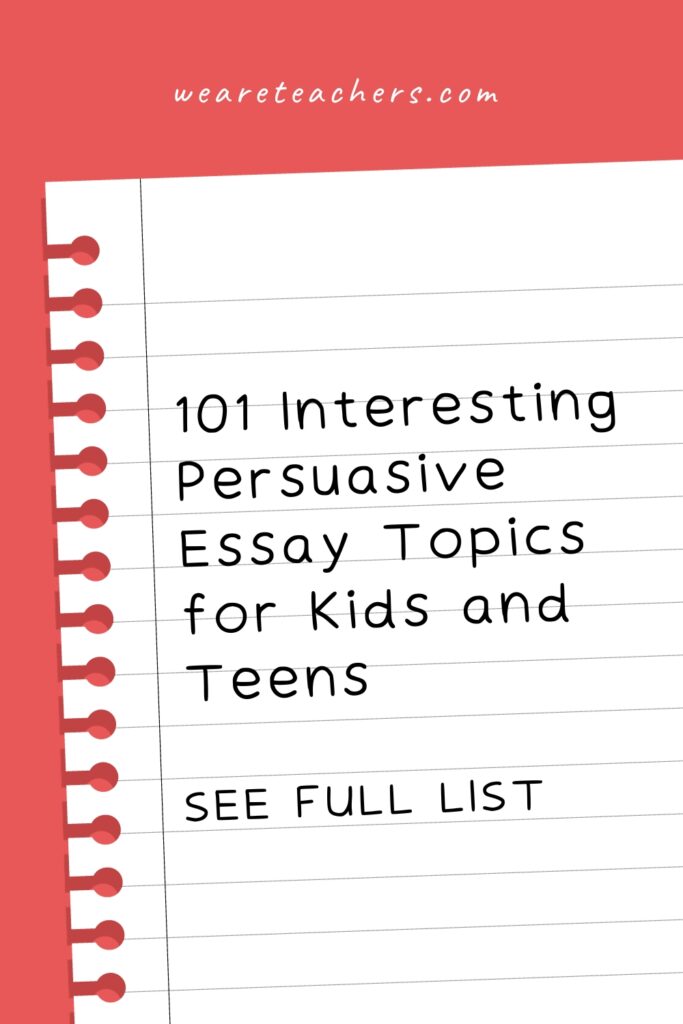
You Might Also Like

40 Strong Persuasive Writing Examples (Essays, Speeches, Ads, and More)
Learn from the experts. Continue Reading
Copyright © 2024. All rights reserved. 5335 Gate Parkway, Jacksonville, FL 32256

Military History
Let’s Not Do Another Civil War if We Can Help It, OK?
Three new books show us why the United States should do everything it can to nip the possibility in the bud.
A portion of the border wall between the United States and Mexico in 2021. Credit... Ariana Drehsler for The New York Times
Supported by
- Share full article
By Thomas E. Ricks
Thomas E. Ricks, the Book Review’s military history columnist, is the author of nine books. Most of them are about military affairs, but the next, scheduled to be published in June, is a mystery set on the Maine coast titled “Everyone Knows but You.”
- May 19, 2024
As we approach this November’s presidential election, “blood bath” is quickly becoming one of Donald Trump’s favorite new terms . If he does not take the White House, there will be a “blood bath” in the auto industry. President Biden’s immigration policies are causing a “blood bath” at the U.S. border with Mexico. In some corners, this imagery is understood as a threat: What will Trump supporters do if their favored candidate does not win? He has repeatedly suggested that violent unrest could follow his defeat. Would it be a reprise of the American Civil War?
If any contemporary historian can give us a clue, it might be Alan Taylor. In AMERICAN CIVIL WARS: A Continental History, 1850-1873 (Norton, 534 pp., $39.99), Taylor, a University of Virginia historian who has won the Pulitzer Prize twice, takes a broad look at the lead-up to and aftermath of the older conflict, including the way it transformed life in Mexico, Canada and the Caribbean.
Does this wide scope work? Yes and no. I don’t think this book makes us look at the Civil War in a new way, but Taylor is persuasive in his assertion that the American conflict shaped the entire continent. “The United States emerged from the war with a stronger federal government and greater military potential,” he concludes. “Intimidated by that enhanced power, Russians sold Alaska, the Spanish bolted from Santo Domingo and the French withdrew their forces from Mexico.”

“American Civil Wars” also dwells on how the signs of a coming Union victory encouraged the creation of the nation of Canada from a diverse collection of British-held provinces on the northern border of the United States. (Now that the United States is a global power, any civil conflict in America would ripple around the world. Think of the 1973 Arab oil embargo, when lingering divisions over the Vietnam War and the Watergate scandal made the U.S. government look weak and distracted; now imagine that on steroids.)
Taylor is a formidable historian and masterly writer. He briskly disposes of some persistent myths about the Civil War. If the fighting really was about states’ rights, he asks, why did the Confederate constitution ban its states from ever abolishing slavery? On the subject of Confederate fears of race mixing, he states flatly that “after centuries of sexually exploiting enslaved women, Southern whites projected their behavior onto Blacks.”
As for anyone who believes that the current turbulence on the U.S.-Mexican border is an anomaly, they will be edified by Taylor’s account of how Texans attacked Mexico for offering freedom to runaway slaves. During the early 1850s, he notes, about 4,000 enslaved people made it across the Texas border to freedom. In response, some 111 Texas Rangers rode across the Rio Grande to “attack, loot and burn the fugitive haven at Piedras Negras.”
After the Civil War, the U.S. Army general Philip Sheridan helped Mexican revolutionaries access 30,000 modern rifles, stockpiling them within easy reach along the Rio Grande in Texas. American weapons manufacturers were eager to sell off their excess inventory, which, Taylor writes, had been “refined in the recent blood bath.”
The historian and retired U.S. Army officer Thomas Ty Smith picks up the story of trouble on the border in THE GARZA WAR IN SOUTH TEXAS: A Military History, 1890-1893 (University of Oklahoma Press, 172 pp., $29.95). Despite all the talk today of an “invasion” coming up from Mexico, his short study is a useful reminder that havoc often has flowed southward across the border. In the early 1890s, the Mexican government was again deeply frustrated with the failure of the American government to stop cross-border incursions by Mexican revolutionaries who enjoyed sanctuary in some parts of Texas.
“The Garza War in South Texas” makes clear that, if there were another violent fracture on this continent today, we’d be lucky to have only two sides to the conflict. Civilian leaders near the border were often at odds with U.S. Army personnel, who in turn, notes Smith, thought many U.S. marshals were overly sympathetic to the revolutionaries. Officials in two Texas border counties brought charges against an Army officer, accusing him of conducting warrantless searches and arresting innocent people in the hunt for rebels. Meanwhile, one of the local scouts employed by the Army was arrested as an insurrectionist.
All civil conflict is complex, but few civil wars were so agonizingly byzantine as the Russian civil war that erupted as World War I ended and the Bolsheviks rose to power. In A NASTY LITTLE WAR: The Western Intervention Into the Russian Civil War (Basic Books, 366 pp., $32), Anna Reid, a former Ukraine correspondent for The Economist and The Daily Telegraph, focuses on the efforts led by France, the United States and, most of all, the British to support anti-Bolshevik forces in that fight.
Despite the book’s title, it was not a small campaign. Some 180,000 soldiers from 16 Allied nations were sent to try to prevent a Red victory. The Americans were fresh-faced newcomers; the British troops, by contrast, were those unfit for duty on the Western Front, “mostly wounded, gassed or otherwise unhealthy,” writes Reid.
No one was happy to be there. Not only did the largely czarist White Army suffer multiple troop rebellions, one of the White units that was led by British officers rose up and killed their Western European commanders. French sailors aboard two ships off the Crimean Peninsula mutinied, pulled down the tricolor, ran up the Red flag and then went ashore to join a pro-Bolshevik demonstration. There was even a renegade German army operating in Estonia, which declined to cooperate with the Allied commanders to whom they had just surrendered in the previous war.
All this insubordination went on despite the extreme acts of violence some used to try to keep order. One of the White generals in Crimea was Yakov Slashchyov, “a psychopathic cocaine addict who rode about with a caged crow attached to his saddle.” On a single morning, he seems to have left the bodies of 200 soldiers “shot in the back of the head” on a train platform. By evening, more corpses had been strung up from the station’s lampposts.
What, if anything, does all this tell us about Vladimir Putin’s war against Ukraine? “Outsiders,” Reid notes, “often get Russia spectacularly wrong.” But there is another, less apparent lesson to be learned: “Putin will fail for the same reason that the Whites did: because he underestimates the desire for freedom of the non-Russian nations.” A good lesson, too, for anyone today who thinks they can impose their vision of America on others through violence and intimidation.
Explore More in Books
Want to know about the best books to read and the latest news start here..
As book bans have surged in Florida, the novelist Lauren Groff has opened a bookstore called The Lynx, a hub for author readings, book club gatherings and workshops , where banned titles are prominently displayed.
Eighteen books were recognized as winners or finalists for the Pulitzer Prize, in the categories of history, memoir, poetry, general nonfiction, fiction and biography, which had two winners. Here’s a full list of the winners .
Montreal is a city as appealing for its beauty as for its shadows. Here, t he novelist Mona Awad recommends books that are “both dreamy and uncompromising.”
The complicated, generous life of Paul Auster, who died on April 30 , yielded a body of work of staggering scope and variety .
Each week, top authors and critics join the Book Review’s podcast to talk about the latest news in the literary world. Listen here .
Advertisement
Find anything you save across the site in your account
Donald Trump’s Abortion Problem at the Polls
By Margaret Talbot

In the nearly two years since the Supreme Court eliminated a constitutional right to abortion, support for that right has been rising. The extreme measures that anti-abortion forces have taken in the wake of Dobbs v. Jackson Women’s Health Organization have made that almost inevitable. In February, the Supreme Court of Alabama seized the opportunity to define frozen embryos as children, imperilling the practice of I.V.F. (State legislators knew that this tack was a loser: they hastily passed a bill protecting fertility treatment.) Earlier this month, a Louisiana state legislative committee rejected a bill that would have allowed exceptions to the state’s abortion ban in cases of rape and incest for people younger than seventeen. A policy blueprint prepared by the Heritage Foundation for a new Trump Administration calls for an all-out assault on abortion pills, urging officials to wield an antiquated anti-obscenity statute to ban them from the mails. And, in the coming weeks, the Supreme Court that brought us Dobbs will decide whether hospital emergency rooms in Idaho can deny abortions to patients who could suffer dire health consequences, but not actually die then and there, if they don’t terminate their pregnancies.
Maybe the most persuasive factor is simply the realization that a bedrock decision about such intimate and life-altering matters could be wrested away by the state. According to a new survey by the nonpartisan Public Religion Research Institute, a majority of adults in most states, including those where abortion is now effectively banned, say that the practice should be legal in all or most cases. That includes seventy per cent of blue-state residents and fifty-seven per cent of red-state ones. In 2022, there were seven states where less than a majority favored abortion rights; last year, there were just five. According to a recent Wall Street Journal poll, nearly forty per cent of suburban women voters cite abortion rights as a top priority, and nearly three-quarters of them believe that abortion should be legal in all or most circumstances.
So it’s not exactly surprising that Donald Trump, the man who pledged to appoint Supreme Court Justices who would overturn Roe v. Wade, and then did so, lately prefers to say that what he really did was hand the matter over to the states. “Democrats, Republicans, liberals, conservatives—they wanted to get abortion out of the federal government,” Trump said at a rally in Wisconsin. “Basically the states decide on abortion, and people are absolutely thrilled with the way that’s going on.” He’s also taken to saying that he doesn’t support a federal ban—the ultimate goal for many in the anti-abortion movement.
“Absolutely thrilled” is a preposterous Trumpism in this context, but he is onto something. For decades, a dominant critique of Roe was that it short-circuited state-by-state democratic deliberation on a uniquely contentious social issue. Even some liberals who supported abortion rights—notably, Ruth Bader Ginsburg—shared this view. But it was most forcefully expressed by, and proved most useful for, anti-abortion jurists, including the Justices who overturned Roe. In a recent Harvard Law Review article, the legal scholars Melissa Murray and Katherine Shaw argue that “the appeal to democracy and democratic engagement” served a rhetorical purpose, insulating the Court—or aiming to—from charges of judicial overreach.
That appeal has come to seem more and more like a fig leaf. The conservative majority in Dobbs clearly imagined that the abortion issue would be taken up mainly by state legislatures, and that they would produce more restrictive laws—and some twenty-one states did ban or severely restrict the procedure. (In the majority opinion, Samuel Alito wrote that Roe had closed off the democratic process for “the large number of Americans who dissented” from it.) As Murray and Shaw point out, there is some rich irony here: the majority that declared itself so committed to the democratic process where abortion was concerned has been busily undermining it in a series of cases curtailing the scope of the Voting Rights Act and allowing gerrymandering.
Yet the version of democracy that many of Roe’s critics invoked was, it turns out, limited. Dobbs also triggered a citizen-organized ballot-initiative movement. In seven states, residents have gone to the polls to weigh in on whether and to what extent abortion rights should be protected. In all seven, they voted to uphold those rights, in some cases by enshrining them in the state constitution. In November, voters in a dozen or so more states could be deciding on similar referendums. The reaction from Republicans at the state level has often been to quash the initiatives, will of the people be damned. In Ohio, when it became apparent that an initiative that would guarantee reproductive rights in the state constitution had garnered enough signatures to get on the ballot, the state G.O.P. engineered a special election to raise the threshold of voters needed to approve such an amendment. (Voters rejected that effort and later amended the constitution.) Republican-led legislatures in Missouri and Arizona are reportedly trying similar tactics. In South Dakota, a group called Dakotans for Health has gathered enough signatures to put an initiative on the ballot to overturn that state’s law, which bans abortion except to save the life of the mother. In anticipation, the legislature passed a bill—which Governor Kristi Noem signed—permitting signatories to remove their names from such petitions. A Republican legislator justified the bill on the ground that people could have been fed misleading information and not understood what they were signing. But many South Dakotans must have easily understood what the legislature was trying to do: keep them from having their say on reproductive rights.
Trump’s convenient embrace of the state-by-state approach is unlikely to drive away his anti-abortion and evangelical voters. They know that he’s still by far their best chance of locking in more restrictions at the national level, even if those stop short of a federal ban. They can reasonably assume that he’ll say whatever he thinks he needs to now, and then come through for them if he wins in November. But the abortion-rights initiatives could boost Democratic and independent turnout; the swing states of Arizona and Nevada are two of the states poised to vote on them.
And, of course, those initiatives and the effort it took to get them on the ballot matter in their own right. Justice Alito wrote in Dobbs that the Court could not possibly assess “the effect of the abortion right on society and in particular on the lives of women.” The past two years have shown that many Americans have no trouble doing so. ♦
New Yorker Favorites
The day the dinosaurs died .
What if you started itching— and couldn’t stop ?
How a notorious gangster was exposed by his own sister .
Woodstock was overrated .
Diana Nyad’s hundred-and-eleven-mile swim .
Photo Booth: Deana Lawson’s hyper-staged portraits of Black love .
Fiction by Roald Dahl: “The Landlady”
Sign up for our daily newsletter to receive the best stories from The New Yorker .

By signing up, you agree to our User Agreement and Privacy Policy & Cookie Statement . This site is protected by reCAPTCHA and the Google Privacy Policy and Terms of Service apply.

By Jonathan Blitzer

By Eric Lach

By Bernard Avishai

By Rachel Aviv

IMAGES
VIDEO
COMMENTS
Find persuasive essay examples for different formats, grades, and topics. Learn how to write a persuasive essay with tips, outlines, and templates.
Harvey Milk's "The Hope" Speech. Sample lines: "Some people are satisfied. And some people are not. You see there is a major difference—and it remains a vital difference—between a friend and a gay person, a friend in office and a gay person in office. Gay people have been slandered nationwide.
Defining Persuasive Essay. This type of essay is a kind of academic writing. When you write a persuasive essay, you mainly use your logic and arguments to persuade your audience of your point of view. To do this, you must use solid proof like facts, doing your own research, statistics, examples and quotations from professionals.
TIP 1: Be careful not to introduce a new argument in the conclusion—there's no time to develop it now that you've reached the end of your discussion! TIP 2: As with your thesis, avoid announcing your conclusion. Don't start your conclusion with "in conclusion" or "to conclude" or "to end my essay" type statements.
This very detailed table can be simplified. Most academic persuasive essays include the following basic elements: Introduction that explains why the situation is important and presents your argument (aka the claim or thesis). Support/Body. Reasons the thesis is correct or at least reasonable.
Persuasive Essay Examples for Elementary Students. At primary school, teachers assign essays to students as a way of improving their writing skills. However, the essays are very simple and not very complex, so the students easily write them. Below are some good persuasive essay topics for primary school kids. Persuasive Essay Examples for 3rd Grade
Learn the definition, types, structure, and techniques of persuasive essays with this comprehensive guide. Find examples, prompts, and tools to help you teach and write persuasive texts.
Persuasive writing begins with a writer forming their own opinion on a topic, which they then attempt to convince their reader of this opinion by walking them through a number of logical and ethical arguments. Articles. Videos. Instructors. The last time you wrote a persuasive essay may have been in high school or college, but the skill of ...
Best Persuasive Essay Examples. Since this is the most common type of essay, it is important to be familiar with its requirements and style. Check out our persuasive essay samples to get acquainted with this popular form of essay. Consider using a writer generator to help structure your essay effectively.
Persuasive Essay Writing Guide Sample 01. New SAT Persuasive Analysis Essay Tips Example. Cell Phones in School Persuasive Essay Example. Social Networking Sites Persuasive Essay Example. Persuasive Essay Writing Guide Sample 02. Physical Education is Vital Persuasive Essay Example. School's Out Persuasive Essay Example.
Learn how to write an argumentative essay with clear structure, evidence, and logic. Find out the difference between Toulmin and Rogerian models, and see examples of prompts and essays.
Learn how to write a persuasive essay with these 50 examples and topics. Find out the elements, structure, and tips for creating a compelling argumentative paper.
Take notes on the most convincing lines of support. And always cite your sources correctly. ️. Step 4: Focus on the Opinions against Your Position. If Step 3 didn't reveal flaws in your position, this step certainly will. Look for examples of persuasive essays that defend a point of view opposite to yours.
Pick a topic that appeals to you. Because a persuasive essay often relies heavily on emotional appeals, you should choose to write on something about which you have a real opinion. Pick a subject about which you feel strongly and can argue convincingly. [3] 6. Look for a topic that has a lot of depth or complexity.
Persuasive Essay Definition. A persuasive essay (purr-SWEY-siv ESS-ey) is a composition in which the essayist's goal is to persuade the reader to agree with their personal views on a debatable topic. A persuasive essay generally follows a five-paragraph model with a thesis, body paragraphs, and conclusion, and it offers evidential support using research and other persuasive techniques.
List of 113 Good Persuasive Essay Topics. Below are over 100 persuasive essay ideas, organized into ten categories. When you find an idea that piques your interest, you'll choose one side of it to argue for in your essay. For example, if you choose the topic, "should fracking be legal?" you'd decide whether you believe fracking should ...
What is a persuasive essay? A persuasive essay uses rhetorical techniques to convince the reader to accept a particular viewpoint or take a specific action. It is a popular type of creative writing. Many types of articles use persuasive techniques because they are effective in short forms like an advertisement or long forms like an essay.
If you need to prove your point in a persuasive essay, you'll need to start with a great prompt. Check out these ideas for easy, challenging, and unique persuasive prompts in different categories.
A writing prompt is a short passage that describes an idea for an essay, report, article, or some other piece of writing. It can be as short as one sentence, although it is usually more elaborate. ... Persuasive Essay Outline: Houston Community College Learning Web; Tips To Write An Effective Persuasive Essay: Melissa Burns, The College Puzzle;
Beginner Topics. Kids should get paid for good grades. Students should have less homework. Snow days are great for family time. Penmanship is important. Short hair is better than long hair. We should all grow our own vegetables. We need more holidays. Aliens probably exist.
101 Interesting Persuasive Essay Topics for Kids and Teens. Use your words to sway the reader. Persuasive writing is one of those skills that can help students succeed in real life. Persuasive essays are similar to argumentative, but they rely less on facts and more on emotion to sway the reader.
In AMERICAN CIVIL WARS: A Continental History, 1850-1873 (Norton, 534 pp., $39.99), Taylor, a University of Virginia historian who has won the Pulitzer Prize twice, takes a broad look at the lead ...
Since Roe v. Wade was overturned, G.O.P. efforts to ban abortion have backfired with voters in many states—and they could do so again in November.